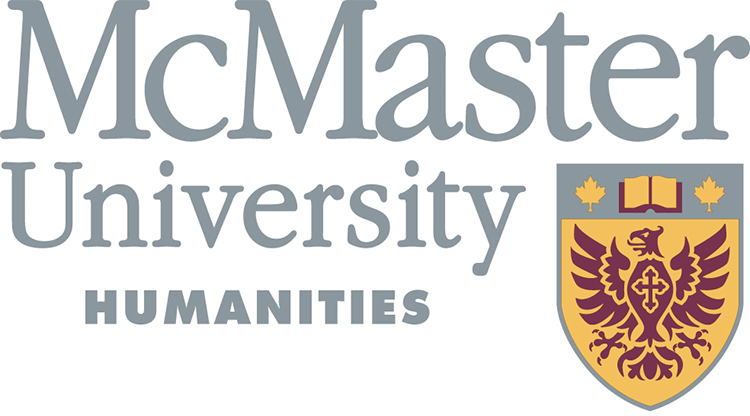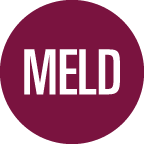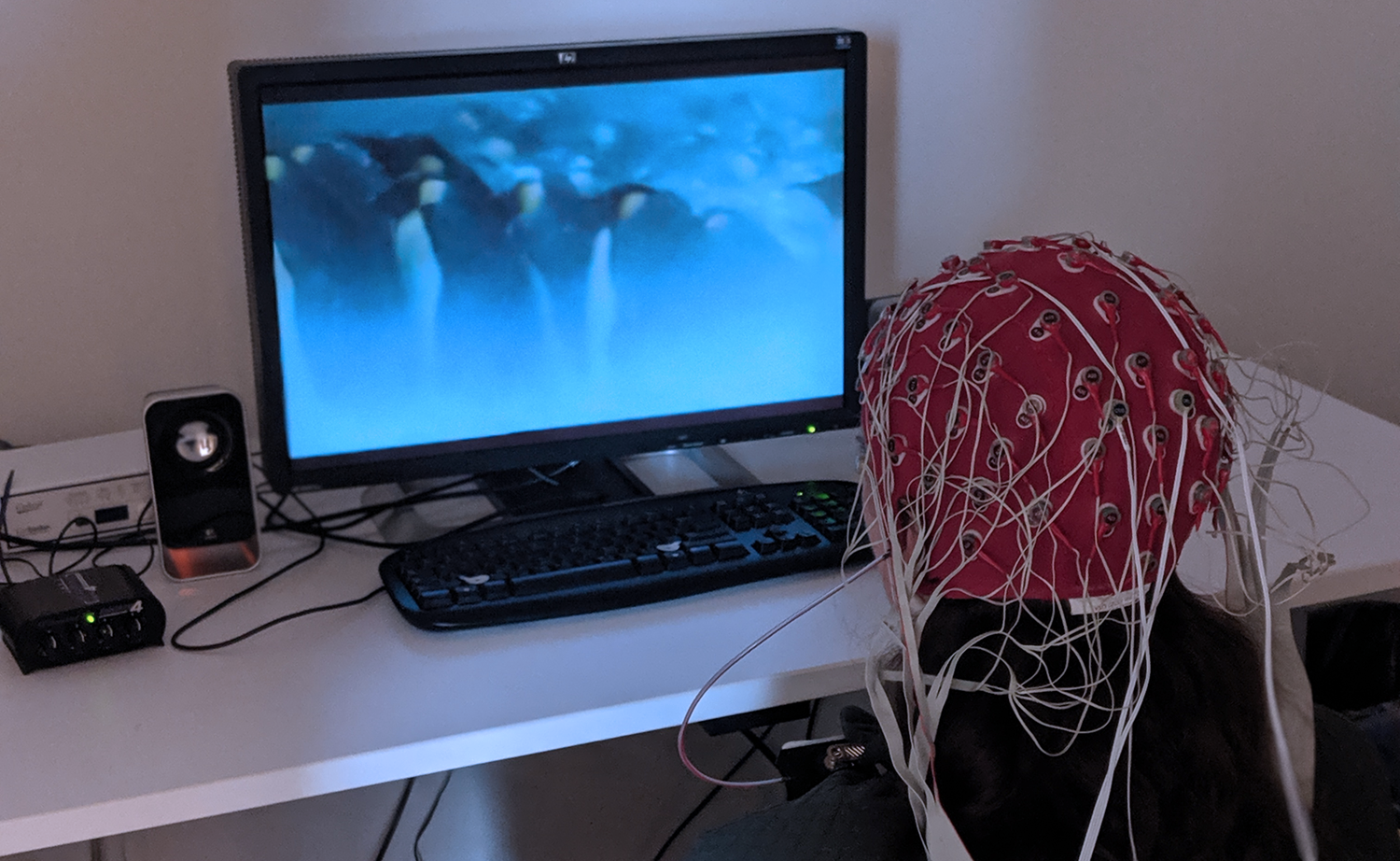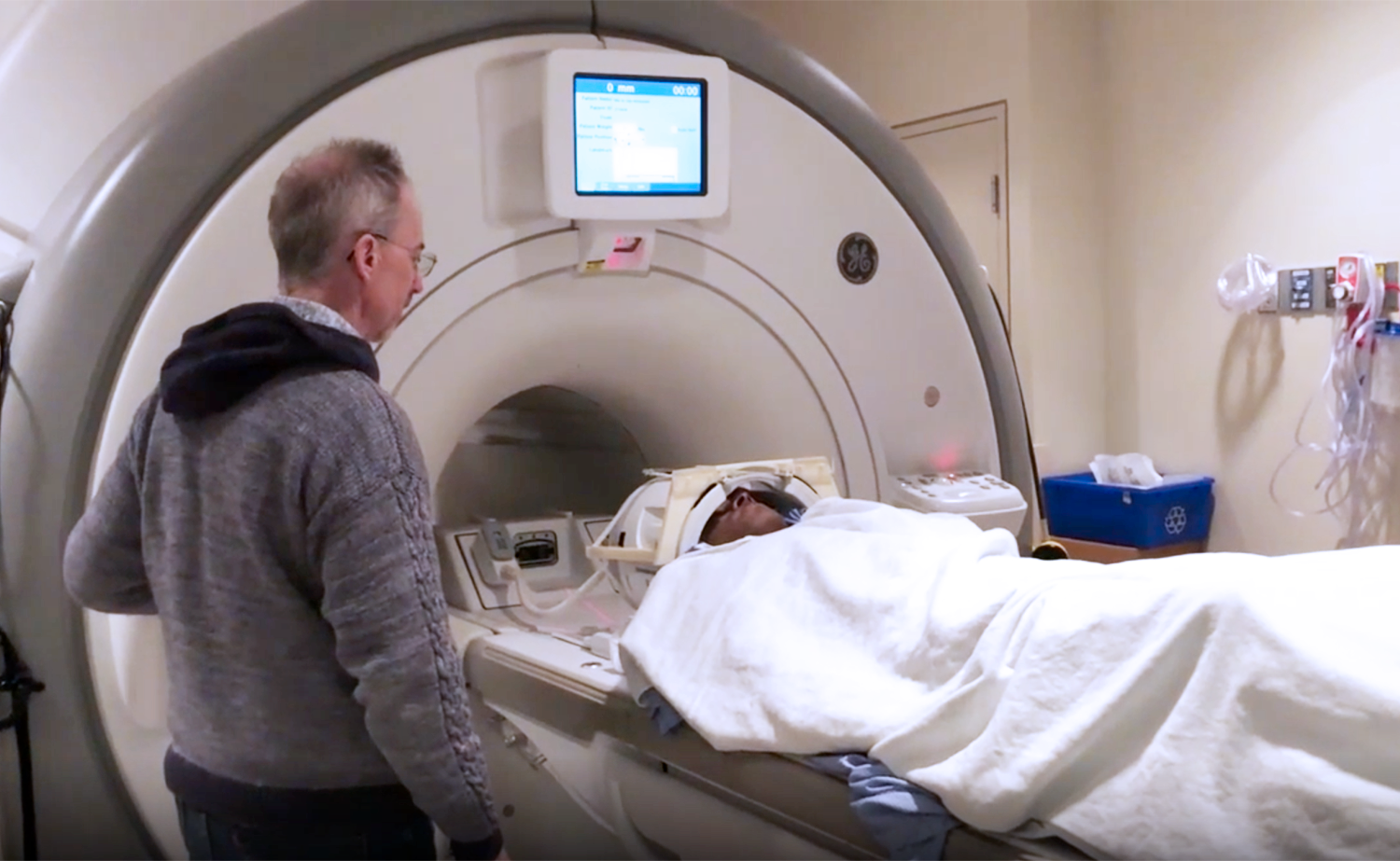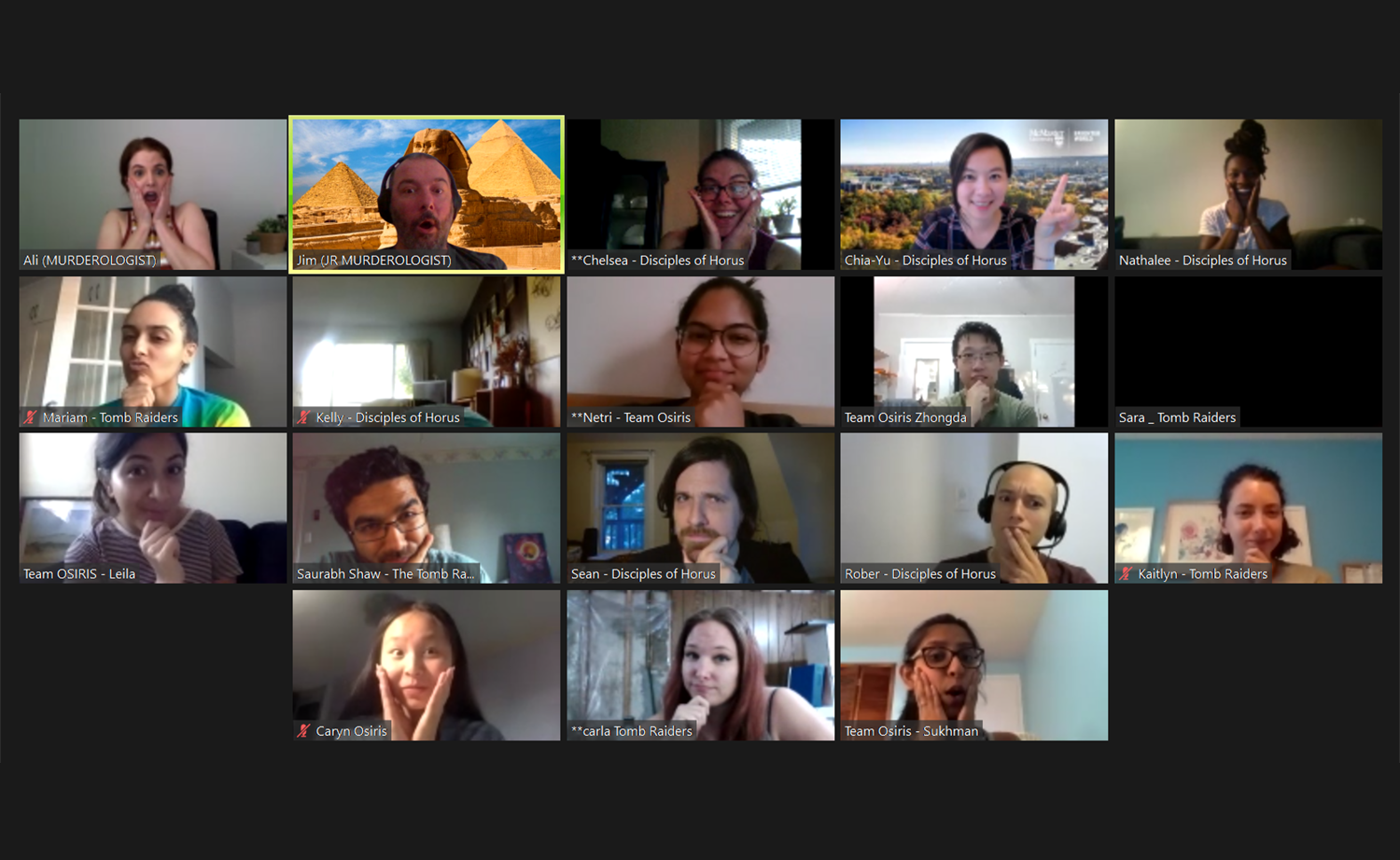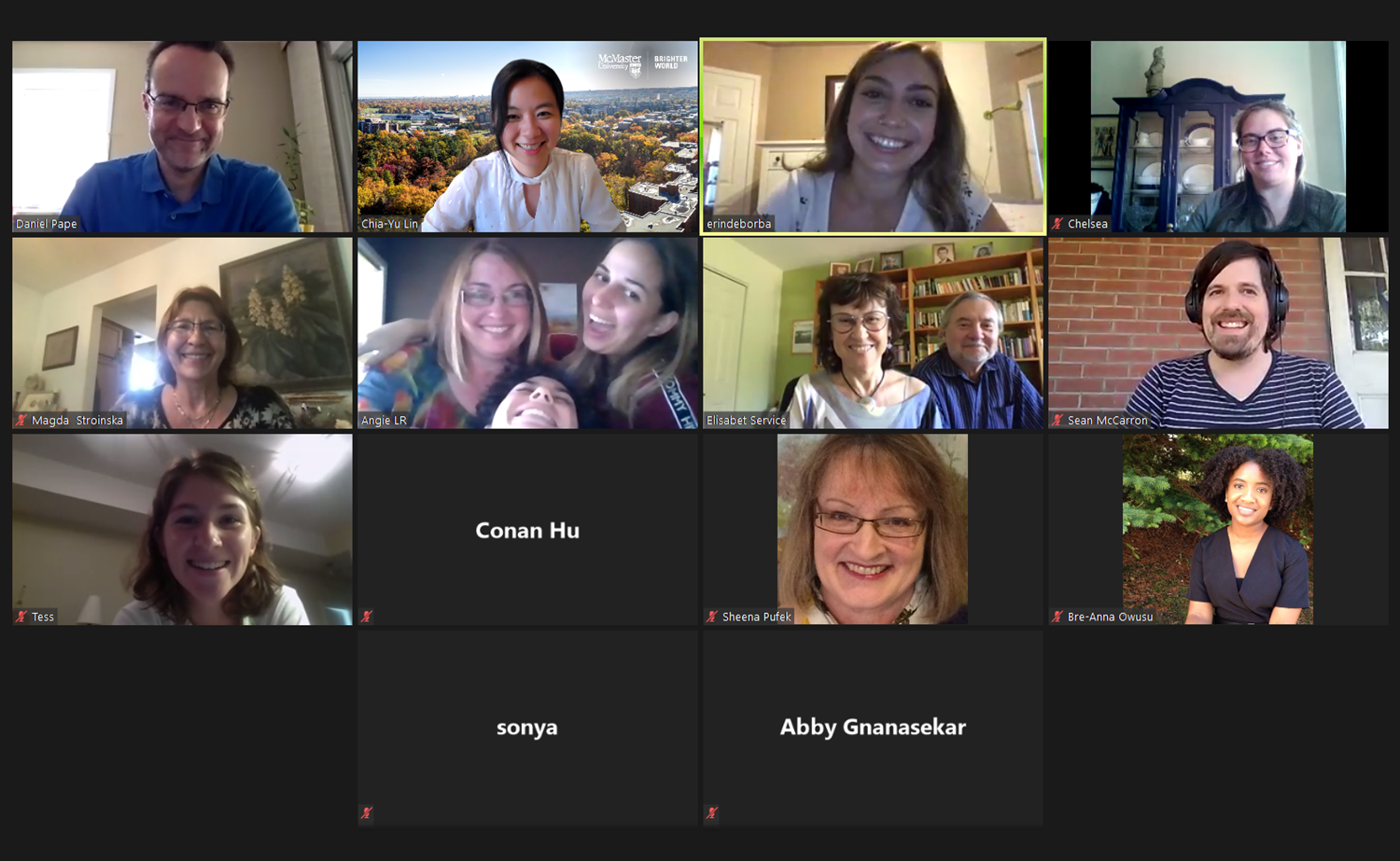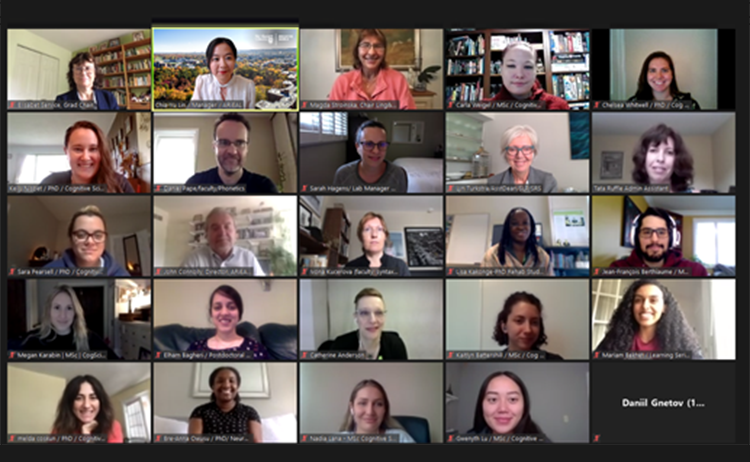ARiEAL
Annual Report 2020
Centre for Advanced Research in Experimental and Applied Linguistics
ARiEAL is grateful to the following key partners for their financial and resource support at McMaster University: Faculty of Humanities, Office of Vice-President Research, McMaster English Language Development Diploma Program, Department of Linguistics and Languages, School of Rehabilitation Science, McMaster School of Biomedical Engineering, and McMaster Industry Liaison Office.
Message from the Director
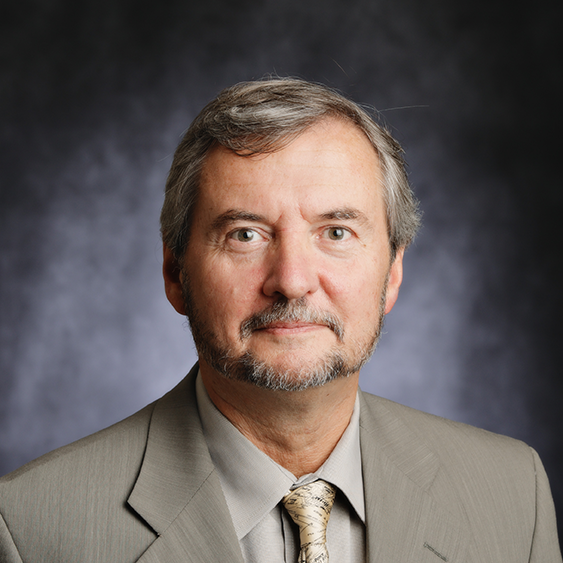
As I write this review of the Centre’s activities in 2020, it is mid-April of 2021. In reviewing what I wrote one year ago for the 2019 Annual Report, it is something of a challenge to feel better about the global situation. To be sure there have been victories, but they have been victories where there should not have been disagreement – democracy has survived in places where a threat to it seemed unimaginable, the climate change emergency has been acknowledged by some major political parties, and the fact that the lives of people of colour matter has become a global movement. However, despite such challenges in our current global environment, the Centre has survived and, as the reader will see below, flourished.
Zoom meetings (and other similar virtual platforms) have taken over for in-person meetings, and we have found ourselves working with graduate students and postdoctoral fellows that we have yet to meet in person. But it has worked. We have supervised undergraduate trainees from a similar distance, but the research has continued and they have learned – both the material and a new level of self-reliance and independence. It would be going too far to say there has been good that has arisen from the pandemic, but it has compelled us to adopt new methods of working at a pace faster than might otherwise have been the case. Also, it has compelled us to adapt to less-than-desirable circumstances in order to succeed.
This will be my last review of the Centre as Director. Dr. Service and I will continue to direct the Language, Memory and Brain Laboratory and supervise students at all levels; it is however the time for new leadership at ARiEAL. I would like to take this opportunity to thank former Dean Crosta for acknowledging our need for a suitable research space in L.R. Wilson Hall. The support of former Dean Cruikshank in both the creation of a research centre and the move into Wilson Hall was vital to what is now ARiEAL. Finally, to our current Dean Swett, who has been very supportive and patient during this transition period. A research centre as interdisciplinary as ours can only succeed with strong administrative vision – I am grateful for the help of these deans. I would also like to acknowledge the members of the Centre. While I have every intention of continuing our collaborations, I will be doing so as one of their number and no longer the Director. I appreciate the collaborative atmosphere that has characterized the Centre and hope that can continue as the new Director applies their vision for what the Centre can become in the coming years. I believe the Scientific Advisory Committee will continue to be valuable in these developments, and I wish to thank them for their contributions in the past. Finally, it would be unthinkable of me not to give a particular thanks to Chia-Yu Lin, the Centre’s Manager of Development and Research. From undergraduate research students to researchers, there is no one who does not understand and appreciate all that Chia-Yu has done for the Centre. From community outreach to memoranda of understanding with research groups around the world, to grant preparation contributions, she has been truly invaluable to all of us. As Director, I can say that the Centre’s many accomplishments were a team effort and could not possibly have been accomplished without her.
This annual report is for the year 2020 – a year where most of us spent the majority of time and energy at home learning all sorts of virtual platforms. It’s a year filled with unprecedented challenges, and yet I am grateful to say that we have all demonstrated resilience to make the best out of it.
The year 2020 marks the fourth calendar year since the ARiEAL Research Centre was founded. Despite the challenging start at the beginning of the pandemic, our researchers were able to pivot most of their research online and continue offering support to their trainees (see RESEARCH HIGHLIGHTS Section of this annual report). Our inaugural Operations Team, which consisted of trainee volunteers from undergraduate to doctoral students, worked diligently with our manager, Chia-Yu Lin, to organize various virtual events for their peers (see IMPACT Section of this annual report). While the total number of presentations and publications decreased in the past year due to our other commitments during the pandemic, ARiEAL researchers managed to start 20 new research grants as either Principal Investigators or Co-investigators in 2020, with funding totalling 5.3 million dollars across these newly-initiated projects (see BY THE NUMBERS Section of this annual report).
Trainees are the foundation of ARiEAL, and their innovative ideas often spark future research projects. In 2020, we are proud to continually support our trainees and their seed projects through the ARiEAL Research Supplement Program. Projects that would otherwise go unfunded are afforded the chance to be carried out through this program.
ARiEAL’s online presence is progressively attracting attention. In 2020 alone, our website (https://arieal.mcmaster.ca/) welcomed over 8,400 visitors from 107 countries. Our official Twitter account (@ARiEAL_Research) reached over 94,000 impressions with 117 tweets and retweets, and exceeded 2,300 engagement counts. Our relatively new Instagram account (@ariealrc) now has 130 followers and close interactions with various student organizations in the community (see IMPACT Section of this annual report).
This 2020 annual report presents our interim productivity as we continue navigating through the pandemic while strengthening the foundation of ARiEAL. We hope that our report continually offers aspiration to the broader research community through our demonstrated collective resilience. Further, we want to take this opportunity to remind ourselves of our commitment to creating a safer and more equitable research environment at the Centre.
Sincerely,
Dr. John Connolly
Director, ARiEAL Research Centre
Professor, Department of Linguistics and Languages
Special Feature
How are we adapting to changes during the global pandemic?
Deewa Anwarzi and Mohammad Chaposhloo, AOT Knowledge Mobilization Coordinators
If we could describe the year 2020 in one word, it would be a year of “challenge.” If we could describe it in two words, it would be a year of “challenge” and “change.” The coronavirus disease (COVID-19) threw on our paths obstacles we were not yet equipped to undertake. The disruption made the unknown familiar, the unlikely certain, and what was secure unstable.
Each one of us has our own COVID story. Some of our stories are marked with loss, others with pain, guilt, and anxiety. The weight of the burden is only familiar to the shoulder that carries them. However, one theme that has materialized alongside the struggle is a story of strength. A story that demonstrates how we have confronted challenges. How we’ve changed the script, redefined roles and expectations, and importantly how we’ve adapted.
In this piece, we, as ARiEAL Knowledge Mobilization Coordinators, will explore how our colleagues at ARiEAL and the McMaster community have stepped up to the challenge. We will draw on how the community has shown resilience, cared for one another, and promoted innovation. To applaud our global community, we include in this piece some social progress and advancement in the way of research and education. The main thread holding this piece together is the big and small actions that have brought our community to a place of adaptation and healing.
Social
The pandemic has reminded us of the interconnected nature of society. Walking into the grocery store and being offered hand sanitizer or opening up the mail to find a reusable mask from McMaster University helps prompt us to do our part. These cues help us become mindful of our actions, as we know they can affect those around us. Recent literature indicates that during the pandemic, youth have demonstrated increased perspective-taking, willingness to help others, and sensitivity to the needs of others, especially the less fortunate (de Groep et al., 2020). In adults, being reminded of the vulnerability of certain groups was related to increased adherence to physical distancing and mask-wearing (Pfattheicher et al., 2020). While many hurdles occurred during the pandemic, one way that we’ve progressed is through increased awareness of the collective good and efforts to protect the most vulnerable.
A great social challenge is maintaining physical distance. Being unable to share the same space with loved ones has been related to greater feelings of loneliness (Bzdok & Dunbar, 2020). In response, there have been increased commercial and community efforts directed towards developing creative ways to stay in touch to cope with the distance. Like many of life’s challenges, a great deal of effort is placed on technology. A host of social media platforms have been developed or modified to increase sociability while maintaining distance. A few examples include Marco Polo and HouseParty. These applications allow for virtual communication in group settings or one on one. Individuals can post a video check-in, and friends and family can respond with a video whenever they are free. For movie lovers, Rave allows friends and family to watch movies and TV shows together by syncing the streaming server. Real-time engagement with the streaming website, a chatbox, and a microphone to send text and voice messages, users of the platform can feel connected to their loved ones. Again the goal of these platforms is to allow for intimacy while respecting the space of others.
Going beyond the screen, individuals who can meet in person are challenged with being in the same physical space as others but withholding from many of the social behaviours they are used to. Physical touch, as we know, is an essential part of western culture. Many of our greetings include physical contact, such as shaking someone’s hand, hugging, and fist bumps. In efforts to uphold the social custom of greeting another person, some creative modifications are gaining attraction. People are replacing fist bumps with elbow bumps, handshakes with the Wuhan shake (i.e., tapping toes), and a humble gesture of placing one hand over the heart (Globe and Mail, 2020). While none of these adaptations are quite the same as what we are used to, they provide us with some level of intimacy with our loved ones.
Many organizations are also looking for ways to engage their employees and clients on an online platform. Among these organizations is the ARiEAL Research Centre. ARiEAL has been promoting social connectedness in our community by organizing online events, such as the ARiEAL Weekly Happy Hour, the virtual escape room hosted jointly with the Department of Linguistics and Languages, the monthly ARiEAL Jackbox Game Nights throughout the year, and more. Most of these events were family-friendly events, and community members were encouraged to feel comfortable. The ARiEAL Social Coordinators made sure to let everyone know in the invite that they could dress as casual or as fancy as they wished to. Through these social events (and others planned for the rest of the year), ARiEAL is helping mitigate the adverse effects of the global pandemic on individuals’ social life.
Research
Advances in the way of research are an important topic to discuss as they relate to the pandemic. All anyone could talk about across news platforms and within intimate circles was when a group of scientists would discover a vaccine to combat the disease or, better yet, when would we receive it!
Scientists around the world are pivoting their research efforts to study and tackle the adverse effects of COVID-19 on the human body and mind. On October 30th, 2020, the Minister of Innovation, Science and Industry, Navdeep Bains, announced that additional funding would be allocated to research efforts addressing COVID-19 related challenges. Some intriguing projects that received this funding include:
- 1) A project aimed at facilitating the adoption of contactless sensors on patients affected by the disease,
- 2) A research program set to develop a mobile application that reduces mental health symptoms related to COVID-19, and
- 3) Multiple programs set to investigate instrument-free diagnostic tools (The Government of Canada, 2020)
Along with these efforts, ARiEAL researchers have also initiated and carried out many COVID-19 related studies. For instance, Dr. John Connolly and his team, partnered with VoxNeuro, have launched a project to measure the neurological effects of COVID-19 (Favaro, Philip, & Neustaeter, 2020). By measuring the electrophysiological brain activity of COVID-19 patients over time and during their recovery, Dr. Connolly and his group assessed their mental abilities to pursue several objectives, such as identifying the kind of patients who were most threatened by the neurological symptoms of COVID-19 and unveiling the long-lasting effects of COVID-19 on the patients’ mental faculties.
Exploring work on vulnerability, Dr. Victor Kuperman and his team explored the effects of COVID-19 related loneliness on senior citizens (Hristova, 2020). As discussed in the Social section above, the pandemic can be a breeding ground for feelings of isolation and loneliness. Thus, it is important to explore such experiences in demographics most vulnerable. Drawing on linguistic analysis, the research team examined around 3,500 written stories from approximately a thousand seniors. They rated the submissions based on the positivity and negativity of the words chosen. Negative words were indicative of higher levels of loneliness and social isolation experienced by the seniors. The study revealed that while seniors had managed to uphold their optimism five months into the pandemic, there was a large decrease in positivity afterwards. These findings suggested that elders, who are already more vulnerable to loneliness, are now even more at risk of socio-cognitive effects of isolation due to COVID-19.
Another recent COVID-19 related study was launched by Dr. Ranil Sonnadara’s team. They set out to investigate the impact of COVID-19 on musicians’ social connectedness. More specifically, they focused on how COVID-19 interferes with musicians’ mental health, performance, and the connections developed between musicians during training. Twenty young musicians were recruited to participate in the study. They were tasked with playing at a virtual concert, participating in an interview, and completing a social connectedness questionnaire. The study revealed that the loss of livelihood and performance opportunities led to feelings of isolation and feeling undervalued. Being unable to perform is also related to a loss of identity, which further negatively impacts their mental health.
In spite of the obstacles posed by COVID-19, some ARiEAL researchers have not only been able to move forward with existing projects but also initiate new projects. For instance, Dr. Lyn Turkstra’s project, which focuses on computer-mediated communication support to improve the social participation of patients with Traumatic Brain Injury (TBI), was modified in small but significant ways. By opting for a survey instead of in-person interviews to receive feedback on the accessibility of social media, Dr. Turkstra was able to continue her work. Students in the Turkstra lab also created two new studies that could be administered online, including a study of sex and gender differences in cognitive function, and a study examining how people understand emojis in text. Dr. Catherine Anderson started a project investigating Equity, Diversity and Inclusion (EDI) in virtual/remote learning environments, in collaboration with Dr. Colin McCarter (McCall MacBain post-doctoral fellow) and Dr. Nathan Sanders (Department of Linguistics at the University of Toronto). Last but not least, Dr. Lisa Archibald has an ongoing research project comparing community reading programs, and it has been shifted entirely online during the pandemic.
For the researchers who are reading this, it might go without saying, but recruiting participants during a pandemic is very challenging. To administer the study while abiding by social distancing rules, researchers are required to think outside the box. With the closure of on-campus research facilities and limitations placed on traditional recruitment methods, researchers have drawn on some attractive tools, such as the Prolific app (Prolific, 2021). This app allows researchers to administer their studies on an online platform. Researchers can specify the demographics of interest and the app can direct eligible participants to apply. Another platform that aids in recruiting specific demographics of individuals is Children Helping Science (Children Helping Science, n.d.). This website helps connect researchers with pediatric participants and their parents. As the pandemic continues, we predict more novel platforms will become available.
Education
As schools around the world opt for online educational platforms, new attitudes towards learning are in order. These novel attitudes need to address the special needs of students and instructors posed by COVID-19. Social and Emotional Learning (SEL) is one such attitude that schools across the globe are including in their courses. SEL refers to adopting certain measures in schools to ensure that students learn personal and interpersonal abilities such as managing their own and other’s emotions, caring for one another, building healthy relationships, overcoming strenuous circumstances, and making decisions responsibly and morally (Schonert-Reichl, 2019). The goal of adding this element of education is to help students understand their own emotions, learn to connect with others in a healthy manner, and learn how to move through stressful situations (May, 2021). In fact, the educational and social benefits of SEL have already been established by educational scientists. For instance, a large body of evidence suggests that social and emotional abilities among students are good predictors of their success in school, and more importantly, the states of their physical health and well-being in their adulthood (Schonert-Reichl, 2019). This and similar findings further reinforce that during dire situations like a global pandemic, SEL needs to be adopted in more schools and more countries across the globe to better equip children with emotional-focused coping strategies.
In sync with global efforts, McMaster University has taken appropriate measures to ease education during the global pandemic for students and instructors alike. A Virtual Learning Task Force has been assembled by McMaster University to present recommendations to the University, instructors, and students to help them navigate through the pandemic successfully (MacPherson Institute, 2021a). These recommendations were based on several themes such as reducing workload for students and faculty, helping students keep track of their course activities and manage their time, facilitating student access to learning resources, and perhaps most importantly, fostering connections among students and instructors. In that regard, instructors are encouraged to reduce lecture time and invest that time in establishing relationships with and between students by means of in-class discussions, team-based projects, and establishing collaborative learning groups. Also, instructors have been advised to create spaces where they can support and help their students, and students could do the same to their fellow colleagues, and stories and coping strategies could be shared.
In addition, McMaster University has enforced many measures to ensure smooth learning and teaching experiences for students with special needs. For example, instructors have been prompted to use real-time captioning during virtual lectures to help those with hearing difficulties (MacPherson Institute, 2021b). Furthermore, the faculty of science has been providing instructors with webcams, microphones, tablets, and other computer accessories to support remote teaching (McMaster University, 2020).
Lastly, a project funded by MacPherson Institute and led by ARiEAL manager, Chia-Yu Lin, and two doctoral students, Kelly Nisbet and Chelsea Whitwell, was originally proposed to develop a repertoire of contemporary and effective presentation resources for trainees at the ARiEAL Research Centre. However, with all conferences turned into virtual formats in 2020, the team pivoted to focus on developing resources that are conducive in virtual settings, such as .gif posters and templates that could be more reader-friendly on devices; therefore the focus of the project was shifted to accommodate trainees’ needs during the pandemic.
Conclusion
The topics we outline in this piece are not intended to depict a rosy image of the pandemic.
Neither is it to say that individuals have not had to sacrifice a lot to maintain some normalcy. It is to say that the pandemic has pushed the global community to come together and work towards a common goal. Within this fight, we’ve been hurt, we’ve made mistakes, but we’ve come a long way. And we hope to continue to move forward through the strength of ourselves and our community well after the pandemic.
References Bzdok, D., & Dunbar, R. I. (2020). The neurobiology of social distance. Trends in Cognitive Sciences, 24(9), 717-733. https://doi.org/10.1016/j.tics.2020.05.016 Children Helping Science. (n.d.). Fun for families, serious for science. https://childrenhelpingscience.com Favaro, A., Philip, E., & Neustaeter, B. (2020, August 29). ‘There’s a lot of confusion inside of me’: COVID-19 ‘long-haulers’ suffering from neurological symptoms months later. Canada. https://www.ctvnews.ca/health/coronavirus/there-s-a-lot-of-confusion-inside-of-me-covid-19-long-haulers-suffering-from-neurological-symptoms-months-later-1.5084869 Globe and Mail. (2020, May 21). How will COVID-19 change our lives, our country, our cities and our world? Toronto, Ontario, Canada. https://www.theglobeandmail.com/canada/article-post-coronavirus-future-of-canada-and-the-world/ Government of Canada. (2020, October 30). Government of Canada announces funding for research and development to address COVID-19 gaps and challenges. Canada. https://www.canada.ca/en/innovation-science-economic-development/news/2020/10/government-of-canada-announces-funding-for-research-and-development-to-address-covid-19-gaps-and-challenges.html Hristova, B. (2020, December 3). After months under COVID-19 seniors are more lonely, less optimistic, new study says. Hamilton, Ontario, Canada. https://www.cbc.ca/news/canada/hamilton/senior-loneliness-study-covid-19-mcmaster-1.5821971 May, H. (2021, February 19). COVID-19 is fueling innovation in Utah schools to help students focus and cope. Salt Lake City, Utah, U.S.A. https://www.sltrib.com/news/education/2021/02/19/covid-is-fueling/ MacPherson Institute. (2021a). Virtual Learning Task Force & MacPherson Institute: Teaching Recommendations for Winter 2021. Hamilton, Ontario, Canada. https://sway.office.com/6K94z0Qc9j2BOecS?ref=Link MacPherson Institute, (2021b). Teaching Remotely. Hamilton, Ontario, Canada. https://mi.mcmaster.ca/teaching-remotely/#tab-content-teaching-remotely McMaster University. (2020, August 28). Added Resources To Support Remote Teaching. Hamilton, Ontario, Canada. https://www.science.mcmaster.ca/news/494-added-resources-to-support-remote-teaching.html Pfattheicher, S., Nockur, L., Böhm, R., Sassenrath, C., & Petersen, M. B. (2020). The emotional path to action: Empathy promotes physical distancing and wearing of face masks during the COVID-19 pandemic. Psychological Science, 31(11), 1363-1373. https://doi.org/10.1177/0956797620964422 Prolific. (n.d.). Quickly find research participants you can trust. https://www.prolific.co/#how-it-works Schonert-Reichl, K. A. (2019). Advancements in the landscape of social and emotional learning and emerging topics on the horizon. Educational Psychologist, 54(3), 222-232. https://doi.org/10.1080/00461520.2019.1633925 van de Groep, S., Zanolie, K., Green, K. H., Sweijen, S. W., & Crone, E. A. (2020). A daily diary study on adolescents’ mood, empathy, and prosocial behavior during the COVID-19 pandemic. PloS one, 15(10), e0240349. https://doi.org/10.1371/journal.pone.0240349
Research Highlights
ARiEAL is a vibrant community of researchers, trainees, and staff who work diligently to create an enriched environment leading research in the field of the neural, behavioural, and social foundations of human communication. Highlighted below are the 2020 research activities from each of the laboratories led by ARiEAL researchers.
- Language, Memory and Brain Lab - EEG
- MELD Programs
- Teaching and Learning Lab
- Neurotechnology and Neuroplasticity Lab
- Language, Reading and Cognitive Neuroscience Lab
- The Syntax Lab
- The Reading Lab
- Imaging Research Centre
- The Phonetics Lab
- The Reilly Lab
- Language, Memory and Brain Lab - Behavioural
- The Turkstra Lab
- The Language and Working Memory Lab
- The MTBI Research Program
- The Performance Science Lab
Language, Memory and Brain Lab – EEG
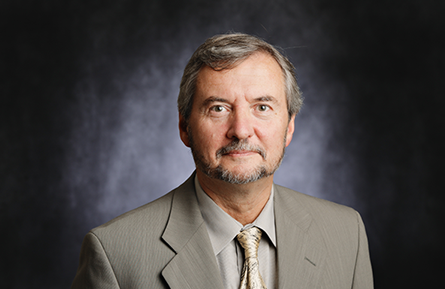
Co-director of the Language, Memory and Brain Lab, Dr. John Connolly. (Photo Credit: Ron Scheffler)
The Language, Memory and Brain (LMB) Lab is co-directed by Drs. John Connolly and Elisabet Service. Dr. Connolly’s research focuses on using brain recordings (EEG) to investigate a range of neurocognitive phenomena including attention, memory, and language processing and the changes seen in brain injury and during recovery in conditions from coma to concussion. In 2020, Nathalee Ewers, Dr. Rick Kolesar and Fatemeh Armanfard (co-supervised by Dr. Jim Reilly) from the LMB Lab completed MSc degrees. Data collection at intensive care units was suspended in the coma project funded by a Collaborative Health Research Projects grant due to the pandemic. However, the research team equipped with personal protective equipment began data collection in healthy control groups. Working with an industrial partner, VoxNeuro, Dr. Connolly also led a project investigating neurocognitive function in individuals experiencing the post COVID “long haul” syndrome. In collaboration with other trainees and ARiEAL members, Dr. Connolly published a systematic scoping review on concussion-related changes in a neurocognitive brain response that reflects executive functioning (Frontiers in Human Neuroscience). The lead author, Sophie Krokhine, now a McMaster undergraduate, was a high school student who was in the lab through an ARiEAL youth outreach program. Dr. Connolly also published a chapter on research methods and the use of event-related potentials as assessment tools in the Handbook of Clinical Neurology. Together with lab trainees and ARiEAL members he also published papers in Brain Research and Brain Communications on neurocognitive function in concussion across the lifespan. The lab also presented work at a number of virtual conferences.
MELD Programs & The MELD Bilingualism Lab
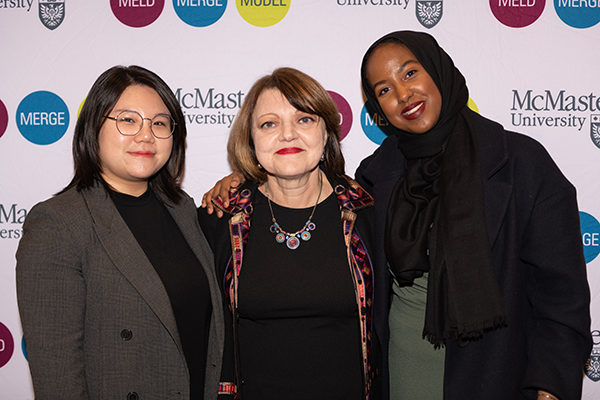
Associate Director of the ARiEAL Research Centre and Director of MELD programs and the Bilingualism Lab, Dr. Anna Moro (centre). Photographed together with Rita Jiang, Communications Associate of MELD Programs (left) and Yasmin Mohamed, Instructional Assistant of MELD Programs(right). (Photo Credit: Angela Herring-Lauzon)
The McMaster English Language Development (MELD) Programs and the MELD Bilingualism Lab are both directed by Dr. Anna Moro. MELD programs are intended for international students whose primary language is not English but who wish to improve their English proficiency to succeed in an English-speaking higher education environment. Since 2018, MELD Programs have expanded their services from the MELD Diploma to also include McMaster English Readiness for Graduate Excellence (MERGE) and McMaster Office for the Development of English Language Learners (MODEL) to offer an even more comprehensive range of services to international students of all levels. In 2020, both MELD and MODEL went through significant restructure to incorporate problem-based learning and reflective practice in curriculum and to ensure effective virtual delivery during the pandemic.
The MELD Bilingualism Lab investigates the underlying linguistic mechanisms of bilingual phenomena and focuses on second language development. Together with Dr. Daniel Schmidtke, postdoctoral researcher, results from the previous MELD Bilingualism cohort study on word-reading development using eye movement data was published in Reading Research Quarterly, and the role of language experience on morphological knowledge was presented at the 61st Annual Psychonomic Society Meeting. Dr. Moro and team also presented their research on the effect of early phonological awareness on change in ESL passage reading behaviour and reading habits at the Words in the World International Conference.
Teaching and Learning Lab
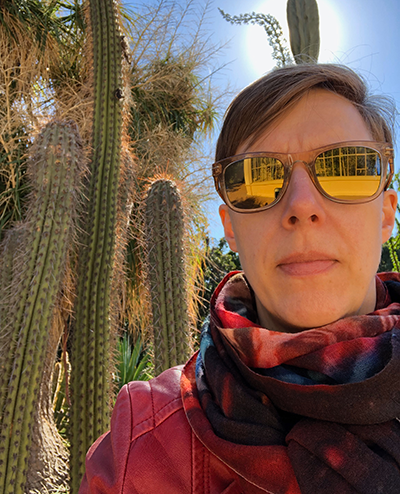
Dr. Anderson, Director of the Teaching and Learning Lab, making friends at the Adelaide Botanic Garden in South Australia. (Photo Credit: Dr. Catherine Anderson)
Dr. Catherine Anderson, an Associate Professor in the Department of Linguistics and Languages, directs the Teaching and Learning Lab. The lab’s research, all of which is conducted in collaboration with undergraduate student partners, focuses on students’ experiences in a variety of undergraduate learning contexts. In 2020 Dr. Anderson founded TILCoP Canada, the Teaching in Linguistics Community of Practice: a collective of faculty members from across Canada who meet regularly to share practices and resources. The group also created and produced Word to the Whys, a companion podcast for Intro Linguistics courses. Dr. Anderson also collaborated with Dr. Nathan Sanders (Department of Linguistics at the University of Toronto) and Dr. Colin McCarter (McCall MacBain postdoctoral fellow) on a project investigating equity, diversity and inclusion in virtual/remote learning environments.
Neurotechnology & Neuroplasticity Lab
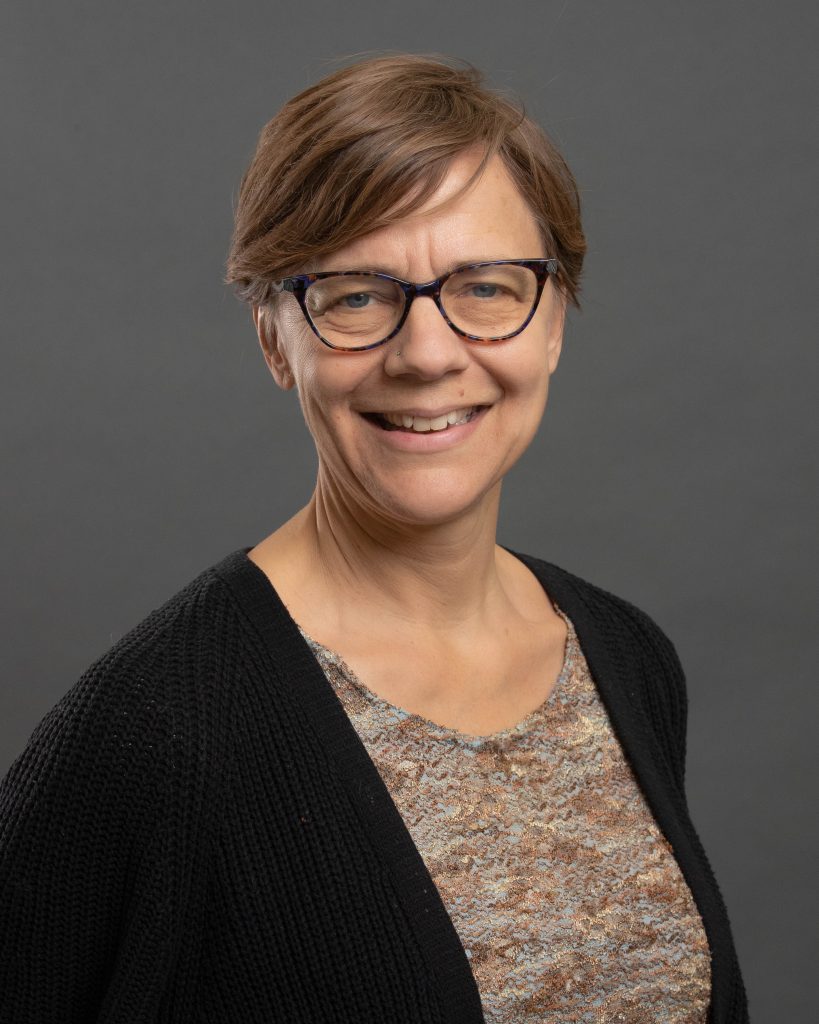
Director of the the Neurotechnology & Neuroplasticity Lab, Dr. Sue Becker. (Photo Credit: Georgia Kirkos)
The Neurotechnology & Neuroplasticity Lab is directed by Dr. Sue Becker whose research uses computational modeling and empirical studies to investigate the neural bases of learning and memory and how it serves in episodic future thinking, planning and decision-making. The lab addresses research questions such as how the hippocampus codes episodic and spatial memories, and how stress, exercise, and neurofeedback affect hippocampal memory functions and intrinsic brain networks. Applications of this research include brain-computer-interfaces, sensory substitution for prosthetic limbs, and furthering our understanding of memory related disorders such as post-traumatic stress disorder. In 2020, Allison Mizzi completed her master’s degree and continues to pursue her doctoral degree in the Neurotechnology & Neuroplasticity Lab with Dr. Becker. Additionally, Dr. Becker collaborated with ARiEAL researcher, Dr. Ranil Sonnadara, and their trainees; together they published in Frontiers in Pediatrics on using deep learning algorithms to grade hydronephrosis severity. Dr. Becker was also the invited speaker at the Rotman Research Institute Research Day in Toronto, Canada where she shared her expertise on tracking medial temporal lobe function through cognitive and intrinsic brain network measures.
Language, Reading and Cognitive Neuroscience Lab
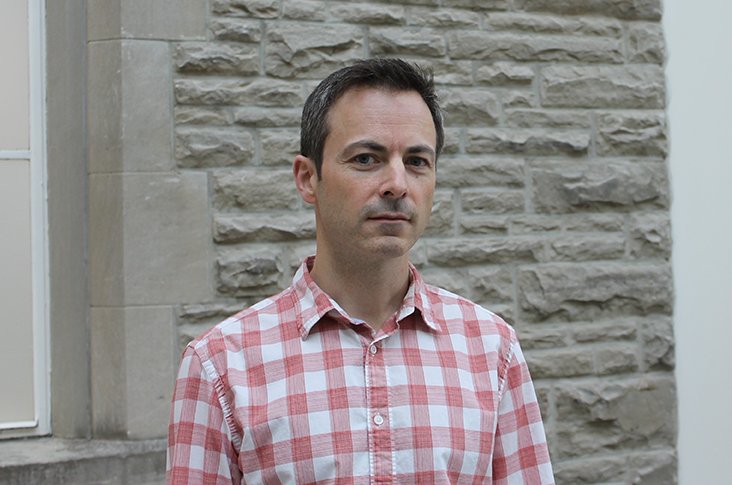
Director of the Language, Reading and Cognitive Neuroscience Lab, Dr. Marc Joanisse. (Photo provided by Dr. Marc Joanisse)
The Language, Reading and Cognitive Neuroscience Lab is directed by Dr. Marc Joanisse, and is housed in The University of Western Ontario’s Brain and Mind Institute. Dr. Joanisse’s research focuses on the cognitive and neural foundations of language and reading across the lifespan. This includes studying reading and language disorders in children, as well as language learning and processing in adults. In 2020, Drs. Félix Desmeules-Trudel and Christina Vanden Bosch der Nederlanden from the Lab completed their postdoctoral fellowship, and Alexandra Cross (co-supervised by Dr. Lisa Archibald) completed her doctoral degree. Together with other investigators, Dr. Joanisse received funding from the Social Sciences and Humanities Research Council (SSHRC) Partnership Engage Grants COVID-19 Special Initiative to study how handwriting and typewriting may help or hinder second language learning, and he was also part of a 7-year SSHRC Partnership Grant funded in 2020 to advance full literacy in a digital world. 2020 was another fruitful year in peer-reviewed publications for Dr. Joanisse and his trainees. Research results were disseminated in highly regarded journals such as Neuroimage and Languages.
The Syntax Lab
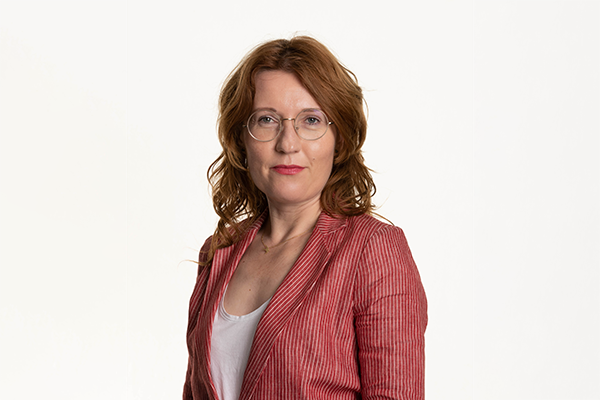
Director of the Syntax Lab, Dr. Ivona Kučerová (Photo Credit: Georgia Kirkos)
The Syntax Lab, directed by Dr. Ivona Kučerová, investigates syntactic structures, with a specific focus on the syntax-semantics interface. In particular the Syntax Lab is working to investigate if, and how semantic information can modulate syntactic derivation. Both traditional fieldwork and experimental methods are used to collect data from cross-linguistically diverse languages, including Indigenous languages of Canada. The goal of this research is to identify and model universal and language-specific structural properties of human languages. The primary focus of the work currently conducted in the Syntax Lab is on modelling features at the syntax-semantics interface. In 2020, Tess Hudson from the Syntax Lab completed her master’s degree and an undergraduate trainee, Rajvinder Singh, received Mitacs funding to integrate linguistics approaches to machine learning tasks in Natural Language Processing. Dr. Kučerová was awarded a Social Sciences and Humanities Research Council Partnership Development Grant to build a transnational network for Indigenous language revitalization. Funding from the Ontario Research Fund received in 2020 is to support the research infrastructure of the Syntax Lab. Dr. Kučerová and her former doctoral trainees published about delayed semantic commitments and its processing in the Journal of Experimental Psychology/Revue canadienne de psychologie expérimentale, and she also published a book chapter on how the distinction between grammatical and semantic agreement can be linked to labelling as a two-stage process in Recent Developments in Phase Theory.
The Reading Lab
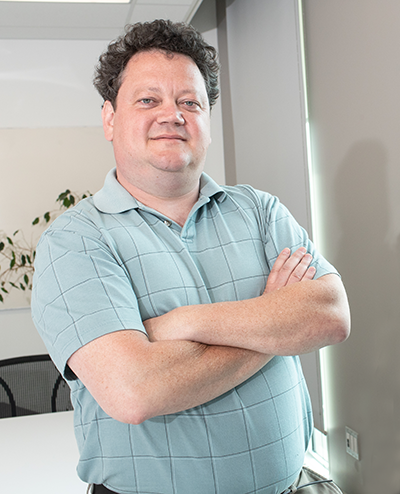
Director of the Reading Lab, Dr. Victor Kuperman. (Photo Credit: JD Howell)
The Reading Lab, directed by Dr. Victor Kuperman, targets a range of areas in psycholinguistics and corpus linguistics with research foci such as the cognitive and socio-demographic predictors of literacy and reading comprehension in adults across languages. The Reading Lab’s research paradigms include eye-tracking, behavioural studies, large-scale norming studies, and quantitative analyses of written and spoken corpora. In 2020, Sean McCarron from the Reading Lab completed his master’s degree before furthering his training at the University of Oxford. Dr. Kuperman received funding from the McMaster Institute for Research on Aging and Labarge Foundation to investigate the social mobility impact in the aging population during the global pandemic. This built on the Lab’s ongoing work focusing on loneliness and social isolation. Dr. Kuperman’s 2020 publications highlight the Lab’s strong international collaboration over the years: the investigation on the backward transfer effects in Finnish–English bilinguals published in Bilingualism: Language and Cognition with Dr. Raymond Bertram from the University of Turku in Finland; the research on Hebrew compound word reading published in Quarterly Journal of Experimental Psychology with Dr. Avital Deutsch from The Hebrew University of Jerusalem in Israel. Moreover, Dr. Kuperman was also invited to present a series of talks on the Multilingual Eye-Movement Corpus (MECO) in both Canada and Russia.
Imaging Research Centre
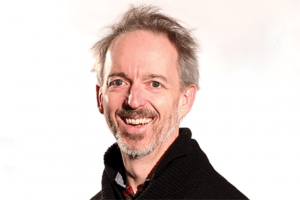
Director of the Imaging Research Centre, Dr. Michael Noseworthy.
Dr. Michael Noseworthy is the director of Medical Imaging Physics and Engineering at the Imaging Research Centre at St. Joseph’s Healthcare, Hamilton. Dr. Noseworthy’s research interests focus on assessment of tissue microstructure and metabolism using multimodal medical imaging, such as the magnetic resonance imaging (MRI) and in vivo nuclear magnetic resonance (NMR) spectroscopy. His work considerably involves developing imaging hardware and software, and the research team works to study physiological problems and diseases using advanced medical imaging techniques. Three of Dr. Noseworthy’s master’s students graduated in 2020: Cameron Nowikow, Jimmy Nguyen, and Pranav Rawal. It was also a prolific year in grant funding where Dr. Noseworthy was awarded as the Principal Investigator by the Juravinski Research Institute to continue his research in predicting recovery from mild traumatic brain injury and as co-investigator on three other research projects investigating the cognitive impact of COVID-19 in the aging population, sarcopenia in older adults, and the impact of exercise on concussion. Dr. Noseworthy and team published extensively in 2020, and their work appeared in the high impact journals, such as Stroke and Frontiers in Aging Neuroscience. A total of 14 presentations were presented at various conferences in 2020, including the IEEE Nuclear Science and Medical Imaging Conference and the European Society for Magnetic Resonance in Medicine and Biology.
The Phonetics Lab
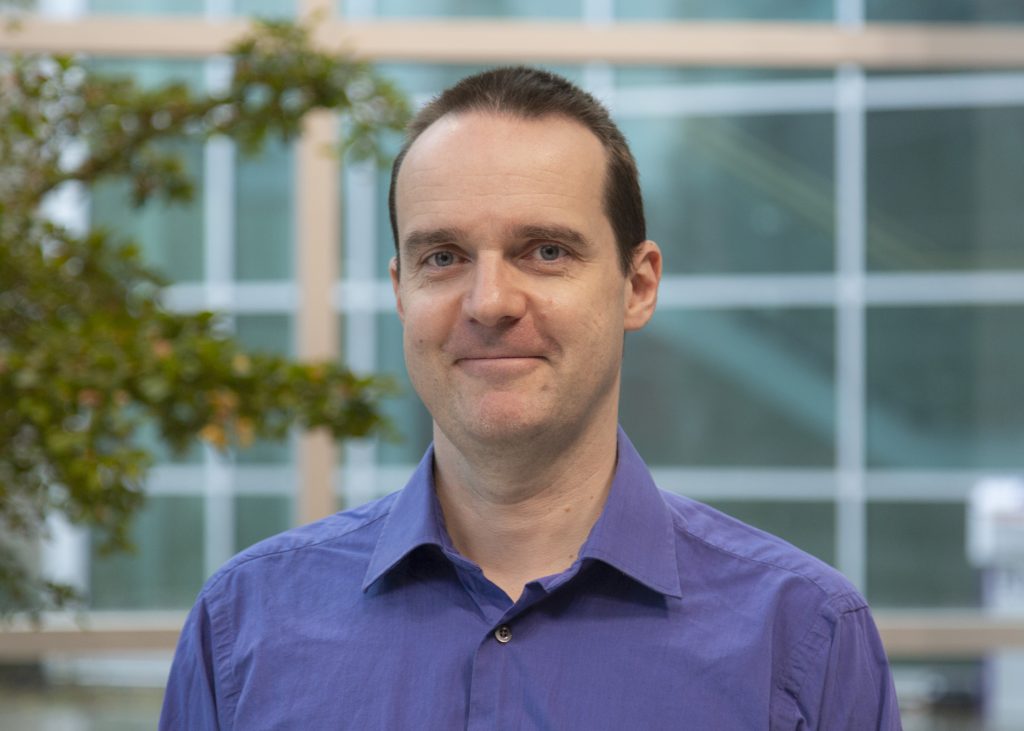
Director of the Phonetics Lab, Dr. Daniel Pape. (Photo Credit: Colin Czerneda)
Dr. Daniel Pape is the Director of the Phonetics Lab. His work focuses on experimental phonetics and speech acoustics, the link between speech production and speech perception, and the relationship between phonetics and neurolinguistics. Two new research streams were introduced in 2020: one stream examining how different academic content, foreign accents and gender influence the accuracy of caption errors in academic online lectures and video conferences, a topic that was a focus of interest during the 2020 pandemic. The second stream examines production and perception differences of bilingual speakers with different degrees of proficiency in their two languages, more specifically Canadian English/French speakers. Dr. Pape’s experimental research stream examining the importance and interplay of several acoustic cues on the production and perception of lexical stress and focus continued in 2020.
Trainees at the Phonetics Lab were active participants in the ARiEAL youth outreach projects where several interactive modules using Praat, a free computer software package for speech analysis in phonetics, were developed as part of the repertoire for future knowledge mobilization use. In 2020, Dr. Pape and his international collaborators also presented their work on the perception and production study of /s/, /ʂ/, /ɕ/ contrast in Polish in Berlin, Germany and subsequently at the International Conference of the Association for Laboratory Phonology.
The Reilly Lab
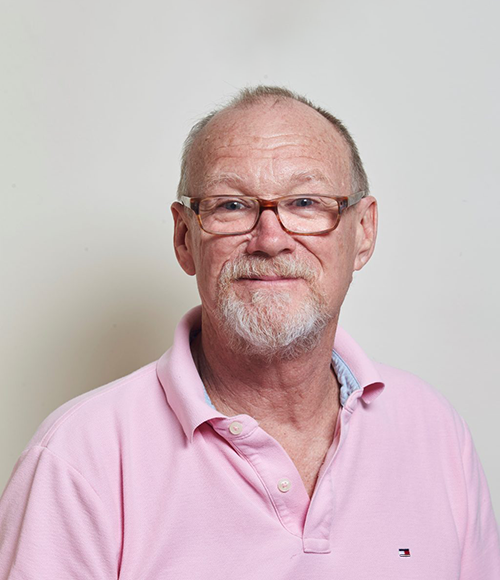
Director of the Reilly Lab, Dr. Jim Reilly. (Photo provided by Dr. Jim Reilly)
Dr. Jim Reilly is an internationally renowned researcher in the field of signal processing. His work centres around the interface of machine learning and signal processing applied to health related problems, particularly in neuroscience. Dr. Reilly specializes in the development of machine learning algorithms, and the effort has been applied to improving diagnosis and treatment of psychiatric illness, prognosis for coma outcome, and assessment of infant motor movement relating to neurological deficit. In 2020, Omar Nassif (co-supervised by Dr. Vickie Galea) and Fatemeh Armanfard (co-supervised by Dr. John Connolly) from the Reilly Lab completed their master’s degree. Despite his retirement in 2019, Dr. Reilly remains active in his research endeavours. Together with Drs. Hasey and Minuzzi, they received funding from the Academic Health Science Centre Alternative Funding Plan Innovation Fund to start a project on detecting suicidal ideation in patients with mood disorder using machine learning and electroencephalography. Relevant research involving Dr. Reilly’s expertise in machine learning was disseminated in reputable journals such as Brain Communications and IEEE Transactions on Neural Systems and Rehabilitation Engineering, and the investigation of impact of physiological sensor variance was presented at the IEEE International Conference on Systems, Man and Cybernetics in 2020.
Language, Memory and Brain Lab – Behavioural
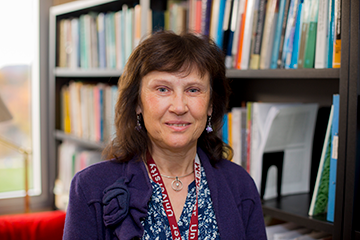
Co-director of the Language, Memory and Brain Lab, Dr. Elisabet Service. (Photo Credit: Colin Czerneda)
The Language, Memory and Brain (LMB) Lab is co-directed by Drs. John Connolly and Elisabet Service. Dr. Service focuses her research on understanding cognitive building blocks in language development and its relationship with working memory, alongside basic research on language acquisition, spoken word processing, and other related cognitive processes. Much of this work is then applied in investigations of language disorders including dyslexia. 2020 saw a number of LMB Lab trainees complete their study: Edalat Shekari and Narcisse Torshizi completed their doctoral degree while Erin DeBorba and Maria De Los Angeles Lopez Ricote completed their master’s degree. Dr. Service published in Frontiers In Human Neuroscience with her Finnish collaborators on phonological short-term memory and word learning and in the Canadian Journal of Experimental Psychology with ARiEAL researcher, Dr. Ivona Kučerová, and their former doctoral trainees Jitka Bartošová and Cassandra Chapman on aspectual processing in sentence comprehension. Dr. Service and her lab trainees actively participated in various local and national conferences, including the Words in the World 2020 Conference and the Annual Meeting of the Canadian Linguistic Association. In 2020, her then doctoral trainee, Narcisse Torshizi, was also awarded a training grant by Mitacs to continue research about effects of second language on negotiation outcomes. The lab also included a number of active undergraduate students who participated in all research projects.
The Turkstra Lab
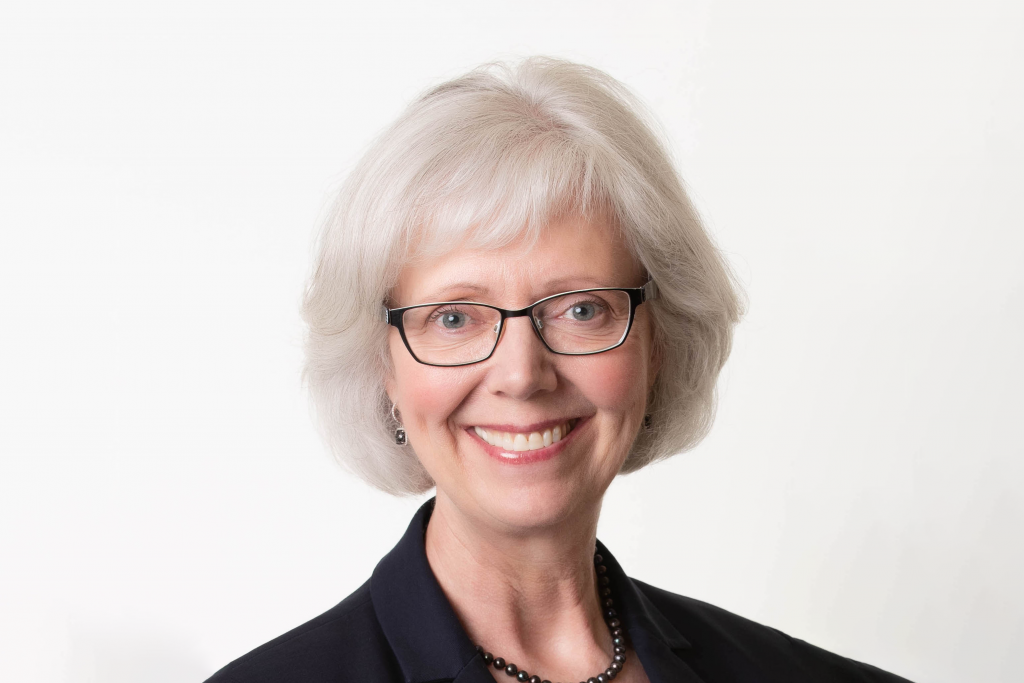
Director of the Turkstra Lab, Dr. Lyn Turkstra. (Photo Credit: Georgia Kirkos)
Dr. Lyn Turkstra heads the Turkstra Lab, which focuses on the links between cognitive function and social communication in individuals with traumatic brain injury (TBI). The Turkstra Lab conducts both experimental and translational research on communication in adolescents and adults and collaborates on development of practice standards to translate research findings into improved clinical practice and long-term patient outcomes. In 2020, Reihaneh Ahmadi from the Turkstra Lab completed her master’s degree in Neuroscience, and the lab welcomed a new doctoral student in Rehabilitation Science, Lisa Kakonge. Lisa joins the research team for Dr. Turkstra’s NIH-funded study that aims to develop technology support for people with brain injury to access social media. As the Principal Investigator, Dr. Turkstra received funding from the Ontario Neurotrauma Foundation to address the needs of youth with TBI in the Ontario youth criminal justice system. The project included an advocacy video that has received international recognition. Dr. Turkstra continued work as a co-Investigator on a study funded by the U.S. Department of Defense, to deliver a novel cognitive rehabilitation treatment to Service Members and Veterans with mild traumatic brain injury. Research from the Turkstra Lab was disseminated through renowned journals, including Frontiers in Neurology, Journal of Head Trauma Rehabilitation, and Brain Injury. Last but not least, Dr. Turkstra was the 2020 recipient of the prestigious Robert L. Moody Prize for distinguished initiatives in brain injury research and rehabilitation.
The Language and Working Memory Lab
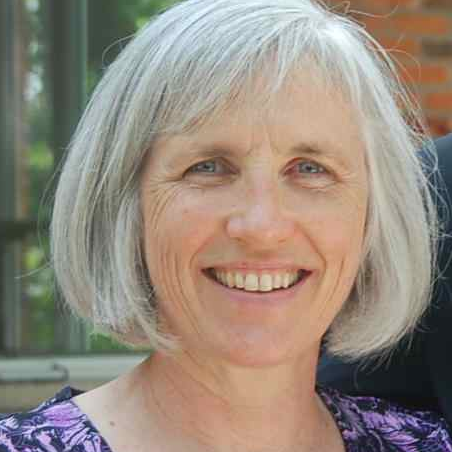
Director of the Language and Working Memory Lab, Dr. Lisa Archibald. (Photo provided by Dr. Lisa Archibald)
The Language and Working Memory Lab is directed by Dr. Lisa Archibald and is part of the School of Communication Sciences and Disorders at The University of Western Ontario. The Language and Working Memory Lab focuses on investigating how language and memory processes interact in both children learning at a typical rate and those with learning disabilities. In 2020, Alexandra Cross (co-supervised by Dr. Marc Joanisse) from the Language and Working Memory Lab completed her doctoral degree. Dr. Archibald individually secured two grants in 2020 to further research in identifying developmental language disorders and evaluating reading extracurricular aspects in the school system from the Sciences and Humanities Research Council (SSHRC) Connection Grant and University of Western Ontario Internal SSHRC Seed Grant, respectively. The latter reading program was shifted entirely online to overcome the challenges brought on by the pandemic. Dr. Archibald and her trainees published on the implicit learning of word and meaning in Applied Psycholinguistics and the pediatric practice-based research with other collaborators in Autism & Developmental Language Impairments. Members of the Language and Working Memory Lab had 14 presentations accepted by various conferences, including the Symposium on Research in Child Language Disorders, which was unfortunately among the ones cancelled due to the pandemic. Nevertheless, Dr. Archibald was invited to share her expertise on developmental language disorder in several school board meetings across the province of Ontario.
The MTBI Research Program
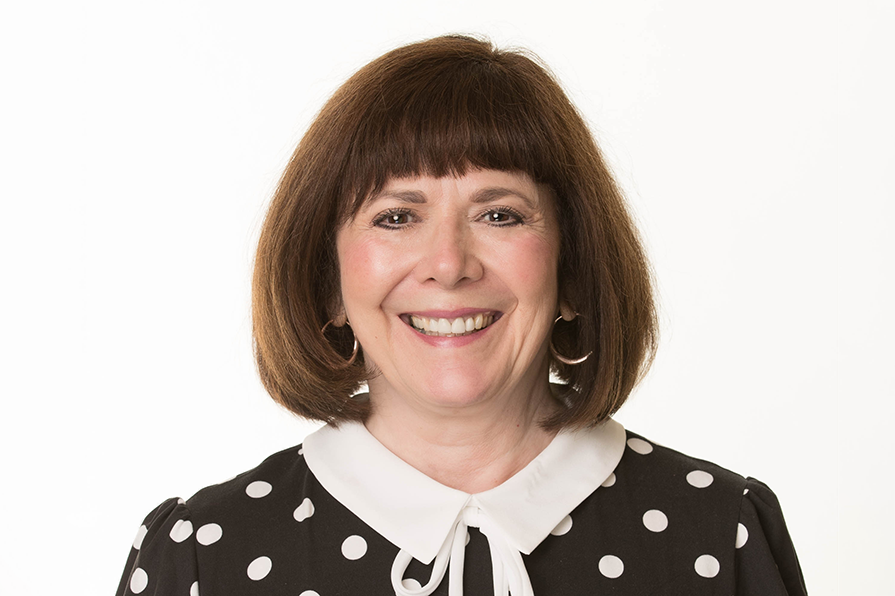
Director of The mTBI Research Program, Professor Carol DeMatteo. (Photo Credit: Georgia Kirkos)
As a clinician scientist, Professor Carol DeMatteo specializes in childhood neurotrauma, specifically acquired brain injury including concussion. She is based at CanChild Centre for Childhood Disability Research and the School of Rehabilitation Science. In 2020, Michael Fisher from Professor DeMatteo’s MTBI Research Program completed his master’s degree and began as the event coordinator for the newly funded Ontario Brain Institute Event Grant on concussion prevention and management for children and youth. Acting as a co-investigator, Professor DeMatteo received funding in 2020 from the Canadian Institutes of Health Research to explore the impact of exercise in children and youth after concussion. Relevant research surrounding brain injury was published in notable journals such as Brain Injury and Brain Research on topics including post-concussive depression and the neurophysiological markers of cognitive deficits and recovery in concussed adolescents, respectively. In addition to her publication endeavours, Professor DeMatteo also presented in the national conference organized by the Canadian Academy of Sport and Exercise Medicine.
The Performance Science Lab

Director of the Performance Science Lab, Dr. Ranil Sonnadara.
The Performance Science Lab, directed by Dr. Ranil Sonnadara, works to understand the science and art behind human performance. In particular, the Lab is interested in investigating how individuals learn complex skills, how information flow across the motor and perceptual systems changes with practice, and how feedback and assessment can be effectively implemented to support skill acquisition. Much of the Lab’s current work focuses on education of health professionals, musicians, and athletes. One of the ongoing studies is investigating musicians’ mental health during the COVID-19 pandemic. In 2020, Dr. Sonnadara and colleagues received 8 grants from the McMaster Interdisciplinary Research Excellence Fund, the College of Medicine Research Award, and more. Research conducted at the Performance Science Lab was presented in multiple conferences. While some of them were cancelled due to the ongoing pandemic, the abstract acceptance spoke volumes of the importance of Dr. Sonnadara’s research. Relevant research from the Performance Lab was published widely in high-impact journals, including Frontiers in Pediatrics and BMC Health Services Research in 2020.
By the Numbers
Through peer-reviewed publications and presentations, ARiEAL researchers demonstrated their research expertises and their dedication to advancing knowledge. Despite the challenges caused by the global pandemic, ARiEAL researchers continue to excel and maintain the track record of successful research funding of all levels throughout 2020.
Publications
Presentations
Grants
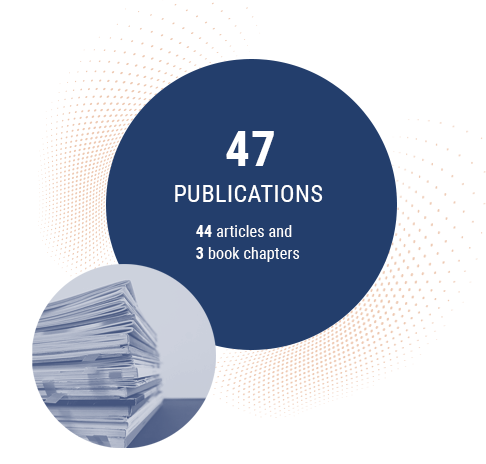 ARiEAL researchers published 44 articles and 3 book chapters in 2020. Broadly, the research topics included semantic interpretation, language processing, and the use of neuroimaging and machine learning in acquired brain injury and other clinical fields.
ARiEAL researchers published 44 articles and 3 book chapters in 2020. Broadly, the research topics included semantic interpretation, language processing, and the use of neuroimaging and machine learning in acquired brain injury and other clinical fields.
Featured below are a selection of these articles:
Bartošová, J., Chapman, C., Kučerová, I., & Service, E. (2020). Making semantic commitments can be delayed: evidence from aspectual processing. Canadian Journal of Experimental Psychology/Revue canadienne de psychologie expérimentale. https://doi.org/10.1037/cep0000227
Boshra, R., Ruiter, K. I., Dhindsa, K., Sonnadara, R., Reilly, J. P., & Connolly, J. F. (2020). On the time-course of functional connectivity: theory of a dynamic progression of concussion effects. Brain Communications, 2(2), fcaa063. https://doi.org/10.1093/braincomms/fcaa063
Desmeules-Trudel, F., & Joanisse, M. F. (2020). Discrimination of four Canadian-French vowels by native Canadian-English listeners. The Journal of the Acoustical Society of America, 147(5), EL391-EL395. https://doi.org/10.1121/10.0001180
Schmidtke, D., & Moro, A. L. (2020). Determinants of word‐reading development in English learner university students: A longitudinal eye movement study. Reading Research Quarterly, Online First, 1– 36. https://doi.org/10.1002/rrq.362
Turkstra, L. S., Mutlu, B., Ryan, C. W., Despins Stafslien, E. H., Richmond, E. K., Hosokawa, E., & Duff, M. C. (2020). Sex and gender differences in emotion recognition and theory of mind after TBI: a narrative review and directions for future research. Frontiers in Neurology, 11, 59. https://dx.doi.org/10.3389%2Ffneur.2020.00059
View full list of 2020 articles Acai, A., Mahetaji, K., Reid, S. E., & Sonnadara, R. R. (2020). The role of gender in the decision to pursue a surgical career: A qualitative, interview-based study. Canadian Medical Education Journal, 11(4), e51. https://doi.org/10.36834/cmej.69292 Anand, S. S., Friedrich, M. G., Desai, D., Schulze, K. M., Awadalla, P., Busseuil, D., Dummer, T. J. B., Jacquemont, S., Dick, A., Kelton, D., Kirpalani, A., Lear, S. A., Leipsic, J., Noseworthy, M. D., Parker, L., Parraga, G., Poirier, P., Robson, P., Tardif, J., Teo, K., Vena, J., Yusuf, S., Moody, A. R., Black, S. E., Smith, E. E., and on behalf of the Canadian Alliance for Healthy Hearts and Minds Cohort. (2020). Reduced cognitive assessment scores among individuals with magnetic resonance imaging–detected vascular brain injury. Stroke, 51(4), 1158-1165. https://doi.org/10.1161/STROKEAHA.119.028179 Anand, S. S., Tu, J. V., Desai, D., Awadalla, P., Robson, P., Jacquemont, S., Dummer, D., Le, N., Parker, L., Poirier, P., Teo, K., Lear, S. A., Yusuf, S., Tardif, J., Marcotte, F., Busseuil, D., Després, J., Black, S. E., Kirpalani,A., Parraga, G., Noseworthy, M. D., Dick, A., Leipsic, J., Kelton, D., Vena, J., Thomas, M., Schulze, K. M., Larose, E., Moody, A. R., Smith, E. E., & Friedrich, M. G. (2020). Cardiovascular risk scoring and magnetic resonance imaging detected subclinical cerebrovascular disease. European Heart Journal-Cardiovascular Imaging, 21(6), 692-700. https://doi.org/10.1093/ehjci/jez226 Bartošová, J., Chapman, C., Kučerová, I., & Service, E. (2020). Making semantic commitments can be delayed: evidence from aspectual processing. Canadian Journal of Experimental Psychology/Revue canadienne de psychologie expérimentale, 75(1), 77–92. https://doi.org/10.1037/cep0000227 Bertram, R., & Kuperman, V. (2020). The English disease in Finnish compound processing: backward transfer effects in Finnish–English bilinguals. Bilingualism: Language and Cognition, 23(3), 579-590. https://doi.org/10.1017/S1366728919000312 Black, M., Joanisse, M. F., & Rafat, Y. (2020). Language dominance modulates the perception of Spanish approximants among late bilinguals. Languages, 5(1), 7. https://doi.org/10.3390/languages5010007 Boshra, R., Ruiter, K. I., Dhindsa, K., Sonnadara, R., Reilly, J. P., & Connolly, J. F. (2020). On the time-course of functional connectivity: theory of a dynamic progression of concussion effects. Brain Communications, 2(2), fcaa063. https://doi.org/10.1093/braincomms/fcaa063 Ciprian, C., Masychev, K., Ravan, M., Reilly, J. P., & Maccrimmon, D. (2020). A machine learning approach using effective connectivity to predict response to clozapine treatment. IEEE Transactions on Neural Systems and Rehabilitation Engineering, 28(12), 2598-2607. https://doi.org/10.1109/TNSRE.2020.3019685 Danielli, E., DeMatteo, C., Hall, G. B., & Noseworthy, M. D. (2020). A review of MRI and exercise treatment for improved concussion diagnosis and recovery. Critical Reviews™ in Biomedical Engineering, 48(5), 261-283. https://doi.org/10.1615/CritRevBiomedEng.2020034991 Desmeules-Trudel, F., & Joanisse, M. F. (2020). Discrimination of four Canadian-French vowels by native Canadian-English listeners. The Journal of the Acoustical Society of America, 147(5), EL391-EL395. https://doi.org/10.1121/10.0001180 Dhindsa, K., Cook, O., Mudway, T., Khawaja, A., Harwood, R., & Sonnadara, R. (2020). LFSpy: a python implementation of local feature selection for data classification with scikit-learn compatibility. Journal of Open Source Software, 5(49), 1958. https://doi.org/10.21105/joss.01958 Fahim, C., Acai, A., McConnell, M. M., Wright, F. C., Sonnadara, R. R., & Simunovic, M. (2020). Use of the theoretical domains framework and behaviour change wheel to develop a novel intervention to improve the quality of multidisciplinary cancer conference decision-making. BMC Health Services Research, 20(1), 1-19. https://doi.org/10.1186/s12913-020-05255-w Fahim, C., McConnell, M. M., Wright, F. C., Sonnadara, R. R., & Simunovic, M. (2020). Use of the KT-MCC strategy to improve the quality of decision making for multidisciplinary cancer conferences: a pilot study. BMC Health Services Research, 20(1), 1-12. https://doi.org/10.1186/s12913-020-05143-3 Gatti, A. A., Keir, P. J., Noseworthy, M. D., Beauchamp, M. K., & Maly, M. R. (2020). Hip and ankle kinematics are the most important predictors of knee joint loading during bicycling. Journal of Science and Medicine in Sport, 24(1), 98-104. https://doi.org/10.1016/j.jsams.2020.07.001 Han, X., Wu, Y., Zhong, Y., & Becker, S. (2020). Recovery of high interference memory in spite of lingering cognitive deficits in a longitudinal pilot study of hospitalized depressed patients. Frontiers in Psychiatry, 11, 736. https://doi.org/10.3389/fpsyt.2020.00736 Harasym, D., Turco, C. V., Nicolini, C., Toepp, S. L., Jenkins, E., Gibala, M. J., Noseworthy, M. D., & Nelson, A. J. (2020). Fitness level influences white matter microstructure in postmenopausal women. Frontiers in Aging Neuroscience, 12, 129. https://doi.org/10.3389/fnagi.2020.00129 Hart, T., Ferraro, M., Rabinowitz, A., Fitzpatrick DeSalme, E., Nelson, L., Marcy, E., … & Turkstra, L. (2020). Improving communication with patients in post-traumatic amnesia: development and impact of a clinical protocol. Brain Injury, 34(11), 1518-1524. https://doi.org/10.1080/02699052.2020.1809710 Ho, R. A., Hall, G. B., Noseworthy, M. D., & DeMatteo, C. (2020). Post-concussive depression: evaluating depressive symptoms following concussion in adolescents and its effects on executive function. Brain Injury, 34(4), 520-527. https://doi.org/10.1080/02699052.2020.1725841 Imbault, C., Titone, D., Warriner, A.-B., & Kuperman, V. (2020). How are words felt in a second language: Norms for 2,628 English words for valence and arousal by non-native speakers. Bilingualism: Language and Cognition. 24(2), 281-292. https://doi.org/10.1017/S1366728920000474 Kalun, P., Dunn, K., Wagner, N., Pulakunta, T., & Sonnadara, R. R. (2020). Recent evidence on visual-spatial ability in surgical education: a scoping review. Canadian Medical Education Journal, 11(6), e111. https://dx.doi.org/10.36834%2Fcmej.69051 Krokhine, S. N., Ewers, N. P., Mangold, K. I., Boshra, R., Lin, C. Y. A., & Connolly, J. F. (2020). N2b reflects the cognitive changes in executive functioning after concussion: A scoping review. Frontiers in Human Neuroscience, 14. https://dx.doi.org/10.3389%2Ffnhum.2020.601370 Kuperman, V., & Deutsch, A. (2020). Morphological and visual cues in compound word reading: eye-tracking evidence from Hebrew. Quarterly Journal of Experimental Psychology, 73(12), 2177-2187. https://doi.org/10.1177%2F1747021820940297 Liu, P., Vandemeer, M. R., Joanisse, M. F., Barch, D. M., Dozois, D. J., & Hayden, E. P. (2020). Depressogenic self-schemas are associated with smaller regional grey matter volume in never-depressed preadolescents. NeuroImage: Clinical, 28, 102422. https://doi.org/10.1016/j.nicl.2020.102422 Liu, P., Vandermeer, M. R., Joanisse, M. F., Barch, D. M., Dozois, D. J., & Hayden, E. P. (2020). Neural activity during self-referential processing in children at risk for depression. Biological Psychiatry: Cognitive Neuroscience and Neuroimaging, 5(4), 429-437. https://doi.org/10.1016/j.bpsc.2019.12.012 Locke, M. B., Toepp, S. L., Turco, C. V., Harasym, D. H., Rathbone, M. P., Noseworthy, M. D., & Nelson, A. J. (2020). Altered motor system function in post-concussion syndrome as assessed via transcranial magnetic stimulation. Clinical Neurophysiology Practice, 5, 157-164. https://doi.org/10.1016/j.cnp.2020.07.004 Oyesanya, T. O., Turkstra, L. S., & Brown, R. L. (2020). Development, reliability, and validity of the perceptions of brain injury survey. Journal of Nursing Measurement, 28(2), 229-258. https://doi.org/10.1891/jnm-d-19-00007 Pham, T., Kang, J. H., Johnson, A., & Archibald, L. M. (2020). Feature-focusing constraints on implicit learning of function word and meaning associations. Applied Psycholinguistics, 41(2), 401-426. https://doi.org/10.1017/S0142716420000041 Považan, M., Mikkelsen, M., Berrington, A., Bhattacharyya, P. K., Brix, M. K., Buur, P. F., Cecil, K. M., Chan, K. L., Chen, D. Y.T., Craven, A. R., Cuypers, K., Dacko, M., Duncan, N. W., Dydak, U., Edmondson, D. A., Ende, G., Ersland, L., Forbes, M. A., Gao, F., Greenhouse, I., Harris, A. D., He, N., Heba, S., Hoggard, N., Hsu, T., Jansen, J, F.A., Kangarlu, A., Lange, T., Lebel, R. M., Li, Y., Lin, C. E., Liou, J., Lirng, J., Liu, F., Long, J. R., Ma, R., Maes, C., Moreno-Ortega, M., Murray, S. O., Noah, S., Noeske, R., Noseworthy, M. D., Oeltzschner, G., Porges, E. C., Prisciandaro, J. J., Puts, N. A.J., Roberts, T. P.L., Sack, M., Sailasuta, N., Saleh, M. G., Schallmo, M., Simard, N., Stoffers, D., Swinnen, S. P., Tegenthoff, M., Truong, P., Wang, G., Wilkinson, I. D., Wittsack, H., Woods, A. J., Xu, H., Yan, F., Zhang, C., Zipunnikov, V., Zöllner, H. J., Edden, R. A. E., & Barker, P. B. (2020). Comparison of multivendor single-voxel MR spectroscopy data acquired in healthy brain at 26 sites. Radiology, 295(1), 171-180. https://doi.org/10.1148/radiol.2020191037 Ruiter, K. I., Boshra, R., DeMatteo, C., Noseworthy, M., & Connolly, J. F. (2020). Neurophysiological markers of cognitive deficits and recovery in concussed adolescents. Brain Research, 1746, 146998. https://doi.org/10.1016/j.brainres.2020.146998 Santos-Díaz, A., & Noseworthy, M. D. (2020). Phosphorus magnetic resonance spectroscopy and imaging (31P-MRS/MRSI) as a window to brain and muscle metabolism: a review of the methods. Biomedical Signal Processing and Control, 60, 101967. https://doi.org/10.1016/j.bspc.2020.101967 Schmidtke, D., & Moro, A. L. (2020). Determinants of Word‐Reading Development in English Learner University Students: A Longitudinal Eye Movement Study. Reading Research Quarterly. https://doi.org/10.1002/rrq.362 Sikkes, S. A., Tang, Y., Jutten, R. J., Wesselman, L. M., Turkstra, L. S., Brodaty, H., … & Bahar‐Fuchs, A. (2020). Toward a theory‐based specification of non‐pharmacological treatments in aging and dementia: Focused reviews and methodological recommendations. Alzheimer’s & Dementia. https://doi.org/10.1002/alz.12188 Smail, L. C., Dhindsa, K., Braga, L. H., Becker, S., & Sonnadara, R. R. (2020). Using deep learning algorithms to grade hydronephrosis severity: toward a clinical adjunct. Frontiers in Pediatrics, 8, 1. https://doi.org/10.3389/fped.2020.00001 Smyth, R. E., Theurer, J., Archibald, L. M., & Oram Cardy, J. (2020). Lessons learned in practice-based research: Studying language interventions for young children in the real world. Autism & Developmental Language Impairments, 5, 2396941520913482. https://doi.org/10.1177%2F2396941520913482 Snefjella, B., Lana, N., & Kuperman, V. (2020). How emotion is learned: Semantic learning of novel words in emotional contexts. Journal of Memory and Language, 115, 104–171. https://doi.org/10.1016/j.jml.2020.104171 Stafslien, E. D., & Turkstra, L. S. (2020). Sex-based differences in expectations for social communication after TBI. Brain Injury, 34(13-14), 1756-1762. https://doi.org/10.1080/02699052.2020.1849799 Svenningsen, S., McIntosh, M., Ouriadov, A., Matheson, A. M., Konyer, N. B., Eddy, R. L., McCormack, D. G., Noseworthy M, D., Parameswaran, N., & Parraga, G. (2020). Reproducibility of hyperpolarized 129Xe MRI ventilation defect percent in severe asthma to evaluate clinical trial feasibility. Academic Radiology. https://doi.org/10.1016/j.acra.2020.04.025 Turkstra, L. S., Mutlu, B., Ryan, C. W., Despins Stafslien, E. H., Richmond, E. K., Hosokawa, E., & Duff, M. C. (2020). Sex and gender differences in emotion recognition and theory of mind after TBI: a narrative review and directions for future research. Frontiers in Neurology, 11, 59. https://dx.doi.org/10.3389%2Ffneur.2020.00059 Vanden Bosch der Nederlanden, C. M., Joanisse, M. F., & Grahn, J. A. (2020). Music as a scaffold for listening to speech: better neural phase-locking to song than speech. NeuroImage, 214, 116767. https://doi.org/10.1016/j.neuroimage.2020.116767 Vandermeer, M. R., Liu, P., Ali, O. M., Daoust, A. R., Joanisse, M. F., Barch, D. M., & Hayden, E. P. (2020). Orbitofrontal cortex grey matter volume is related to children’s depressive symptoms. NeuroImage: Clinical, 28, 102395. https://doi.org/10.1016/j.nicl.2020.102395 Wang, J., Joanisse, M. F., & Booth, J. R. (2020). Letter fluency in 7-8-year-old children is related to the anterior, but not posterior, ventral occipito-temporal cortex during an auditory phonological task. Developmental Cognitive Neuroscience, 47, 100898. https://doi.org/10.1016/j.dcn.2020.100898 Wang, J., Joanisse, M. F., & Booth, J. R. (2020). Neural representations of phonology in temporal cortex scaffold longitudinal reading gains in 5-to 7-year-old children. NeuroImage, 207, 116359. https://doi.org/10.1016/j.neuroimage.2019.116359 Xue, J., Li, B., Yan, R., Gruen, J. R., Feng, T., Joanisse, M. F., & Malins, J. G. (2020). The temporal dynamics of first and second language processing: ERPs to spoken words in Mandarin-English bilinguals. Neuropsychologia, 146, 107562. https://doi.org/10.1016/j.neuropsychologia.2020.107562 Ylinen, S., Service, I., & Nora, A. (2020). Better phonological short-term memory is linked to improved cortical memory representations for word forms and better word learning. Frontiers in Human Neuroscience, 14, 209. https://doi.org/10.3389/fnhum.2020.00209
View full list of 2020 book chapters
Connolly, J. F. (2020). Clinical neurophysiology: Research methods and event-related potential components as assessment tools. In Gallagher, A., Bulteau, C., Cohen, D., Michaud, J. L. Handbook of clinical neurology. (Vol. 174, pp. 277-287). Amsterdam, Netherlands: Elsevier. https://doi.org/10.1016/B978-0-444-64148-9.00020-X Kučerová, I. (2020). Labeling as two-stage process: Evidence from semantic agreement. In Van Craenenbroeck, J., Pots, C., Temmerman, T. Recent Developments in Phase Theory. (pp. 183 – 212). Berlin, Germany: Mouton de Gruyter. https://doi.org/10.1515/9781501510199 Schmidtke, D., & Kuperman, V. (2020). Psycholinguistic methods and tasks in morphology. In Aronoff, M. (Eds.). Oxford Research Encyclopedia of Linguistics. Oxford, England: Oxford University Press. https://doi.org/10.1093/acrefore/9780199384655.013.600
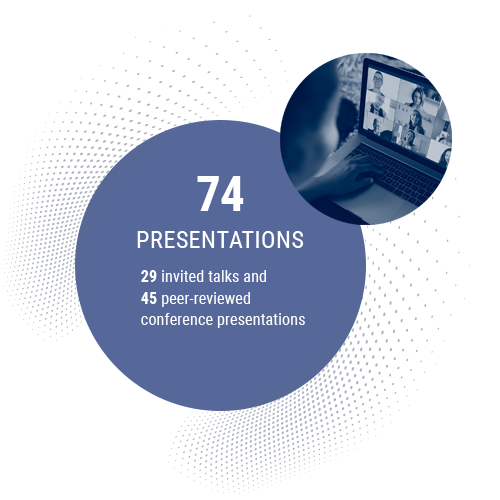
ARiEAL researchers presented 29 invited talks and 45 peer-reviewed conference presentations in 2020, with the majority being delivered virtually.
Featured below are a selection of these presentations:
Becker, S. (2020, February). Tracking medial temporal lobe function through cognitive and intrinsic brain network measures. Rotman Research Institute Research Day. Toronto, Canada. (Invited)
Kuperman, V., Kyröläinen, A., Gillett, J., & Sonnadara, R. R. (2020, December). Optimism in time of the pandemic: evidence from story-writing. McMaster Institute for Research on Aging Showcase. Hamiton, Canada. (Poster; Delivered Online)
Noseworthy, M. D. (2020, February). Advanced MR imaging methods for personalized assessment of brain radiation necrosis. Paul Scherrer Institute. Zurich, Switzerland. (Invited)
Practile, T., Marshall, C., & DeMatteo, C. (2020, May). Examining how time from sport-related concussion to initial assessment predicts return-to-play clearance. CASEM-AQMS Sport Medicine Conference. Banff, Canada. (Delivered Online)
Żygis, M., Jaskula, M., Pape, D., & Koenig, L. (2020, March). Do children understand themselves or adults better? A production and perception study of Polish /s, ɕ, ʂ/. Brown Bag Lunch. Berlin, Germany. (Invited; Delivered Online)
View full list of 2020 presentations Acai, A., Mahetaji, K., Reid, S. E., & Sonnadara, R. R. (2020, March). The role of gender in the decision to pursue a surgical career: perspectives and experiences from two academic centres. Annual Ontario Student Medical Education Research Conference. Toronto, Canada. (Cancelled Due to COVID) Amador, A., Harrison, A., Noseworthy, M. D. (2020, September). The MRI cold head artifact is no longer a significant problem for simultaneous fMRI/EEG experiments. European Society for Magnetic Resonance in Medicine and Biology. Barcelona, Spain. (Delivered Online) Archibald, L. (2020, February). Developmental language disorder – implementation in Ontario. Meeting of the Chief School Board SLPs of Ontario. Toronto, Canada. (Invited) Archibald, L. (2020, April). Developmental language disorder: exploring the definition in detail. Windsor Essex County District School Board. Windsor, Canada. (Invited; Delivered Online) Archibald, L. (2020, May). Criteria and crucial conversations of DLD. Annual Conference of Speech-language Pathology and Audiology. Ottawa, Canada. (Invited; Cancelled Due to COVID) Archibald, L. (2020, May). The multiplicity of cognitive paths and learning outcomes in development. Invited Lecturer for the 2020 Donald G. Doehring Memorial Lecture, McGill University. Montreal, Canada. (Invited; Cancelled Due to COVID) Archibald, L. (2020, June). Developmental language disorder: exploring the definition in detail. Upper Grand District School Board. Guelph, Canada. (Invited; Delivered Online) Archibald, L. (2020, June). Developmental language disorder. Workshop for the Centre of Excellence for Speech Language Development. English Montreal School Board. Montreal, Canada (Invited; Cancelled Due to COVID) Bardell, T., Schouten, M., & Archibald, L. (2020, June). Comparing practice-based spoken versus iPad-administered versions of a narrative retell progress monitoring tool. Symposium on Research in Child Language Disorders. Madison, USA. (Cancelled Due to COVID) Becker, S. (2020, February). Tracking medial temporal lobe function through cognitive and intrinsic brain network measures. Rotman Research Institute Research Day. Toronto, Canada. (Invited) Capaldi, D. P. I., Konyer, N. B., Kjarsgaard, M., Noseworthy, M. D., Parraga, G., Nair, P., & Svenningsen, S. (2020, August). Sensitivity to small airways response to bronchodilator in severe asthma. International Society for Magnetic Resonance in Medicine. (Delivered Online; Poster) Connolly, J. F. (2020, October). Moving beyond diagnosis: objectively assessing neurocognitive consequences of concussion. BIAPH Health Advocates Education Conference. Mississauga, Canada. (Invited; Delivered Online) Connolly, J. F. (2020, November). Identifying the effects of COVID-19 on cognitive function and recovery trajectories. Neurological Health Charities Canada. North York, Canada. (Invited; Delivered Online) Connolly, J. F. (2020, December). SARS-CoV-2 (COVID-19): Objective assessment of persistent cognitive dysfunction as a first step in treatment decisions. The Scientist, Webinar Series, Beyond Acute Respiratory: SARS-CoV2’s Effects on Long-Term Physiology. (Invited; Delivered Online) Connolly, J. F. & Boshra, R. (2020, January). A brief history of electrophysiological research on brain injury and recent advances enabled by machine learning. Vector Institute. Toronto, Canada. (Invited) Connolly, J. F. & Boshra, R. (2020, March). Electrophysiological markers of cognitive dysfunction in brain injury and machine learning methods of revealing them. Focus Program on New Geometric Methods in Neuroscience, The Fields Institutes for Research in Mathematical Sciences. Toronto, Canada. (Invited) Connolly, J. F., Boshra, R., & Ruiter K. I. (2020, January). Determining cognitive function after brain injury – from coma to concussion. Holland Bloorview Kids Rehabilitation Hospital. Toronto, Canada. (Invited) Cross, A., Steinbach, K., Lovett, M., Frijters, J., Archibald, L., & Joanisse, M. (2020, June). Predicting response to reading intervention based on structural and functional brain connectivity. Symposium on Research in Child Language Disorders. Madison, USA. (Cancelled Due to COVID) Davison, C., Klein, P., & Archibald, L. (2020, June). Impact of explicit whole class oral narrative intervention on oral and written language in grade 1 students. Symposium on Research in Child Language Disorders. Madison, USA. (Cancelled Due to COVID) Fu, G. & Noseworthy M. D. (2020, September). Increased connectivity in default mode and salience networks in video game players: A rsfMRI study on task-based (tfMRI) data. European Society for Magnetic Resonance in Medicine and Biology. Barcelona, Spain. (Delivered Online) Georgan, W., Archibald, L., & Hogan, T. (2020, June). Speech/language impairment or specific learning disability? Explaining the shift in educational labels. Symposium on Research in Child Language Disorders. Madison, USA. (Cancelled Due to COVID) Goubran, M., Ozzoude, M., Adamo, S., Zukotynski, K., Bocti, C., Borrie, M., Chertkow, H., Frayne, R., Gao, F., Hsiung, R., Kiss, A., Laforce, R. Jr., Noseworthy, M. D., Prato, F. S., Ramirez, J., Sahlas, J. D., Scott, C., Smith, E. E., Sossi, V., & Strother (2020, January). Relationship between amyloid load, white matter microstructure and cognitive performance in patients with significant white matter disease. Human Amyloid Imaging Conference. Miami, USA. Kalun, P., Wilson, D., Zering, J. C., Tran, C. K., & Sonnadara, R. R. (2020, September). Do entrustment-based ratings accurately reflect trainee performance? International Conference on Residency Education. Vancouver, Canada. (Cancelled Due to COVID) Konyer, N. B., Menon, N., Polak, P., Nair, P., Noseworthy, M. D., & Svenningsen, S. (2020, August). Discrete wavelet transform (DWT) denoising of hyperpolarized 129Xe MR images. International Society for Magnetic Resonance in Medicine. (Delivered Online; Poster) Kučerová, I., Chapman, C., & Moulton, K. (2020, March). How to value gender: lexicon, agree and feature transmission under ellipsis. West Coast Conference in Formal Linguistics (WCCFL) 38. Vancouver, Canada. (Delivered Online) Kučerová, I. & Szczegielnaik, A. (2020, May). Gender as a generalized noun feature: evidence from Slavic and Semitic. Annual meeting of the Formal Approaches to Slavic Linguistics. Seattle, USA. (Delivered Online) Kučerová, I. & Szczegielnaik, A. (2020, May). Slavic meets Semitic: nominal functional categories as underspecified heads. Canadian Linguistics Association (CLA-ACL) annual meeting. London, Canada. (Delivered Online) Kučerová, I. & Szczegielnaik, A. (2020, September). Syntactic variation meets PF uniformity: underspecification of nominal functional categories. Cambridge Comparative Syntax (CamCoS 9) conference. Newcastle, United Kingdom. (Delivered Online) Kuiack., A., Leggett, J., Shaffalovitch, S., & Archibald, L. (2020, June). A grade 1 language and literacy project. Poster Presented at the Symposium on Research in Child Language Disorders. Symposium on Research in Child Language Disorders. Madison, USA. (Cancelled Due to COVID) Kuperman, V. (2020, January). MECO: Multilingual corpus of eye movements. Ontario Institute for Studies in Education. Toronto, Canada. (Invited) Kuperman, V. (2020, November). Behavioral mega-studies as a rich source of bilingual data. Fall School “Languages in Contact”. Tomsk, Russia. (Invited; Delivered Online) Kuperman, V. (2020, November). The multilingual eye-movements corpus in L1 and L2. Fall School “Languages in Contact”. Tomsk, Russia. (Invited; Delivered Online) Kuperman, V. (2020, December). Story-writing and emotional well-being during the pandemic. McMaster Institute for Research on Aging Showcase. Hamilton, Canada. (Invited; Delivered Online) Kuperman, V., Kyröläinen, A., Gillett, J., & Sonnadara, R. R. (2020, December). Optimism in time of the pandemic: evidence from story-writing. McMaster Institute for Research on Aging Showcase. Hamilton, Canada. (Poster; Delivered Online) Ledoux, A. A., Barrowman, N., Bijelic, V., Davis, A., Reid, S., Sangha, G., Yeates, K. O., DeMatteo, C., Reed, N., & Zemek, R. (2020, May). Pediatric Concussion Assessment of Rest and Exertion (PedCARE): A Multicentre Randomized Clinical Trial. Pediatric Academic Societies 2020 Conference. Philadelphia, USA. (Cancelled Due to COVID) Mann, R., Acai, A., & Sonnadara, R. R. (2020, March). Data source prioritization among novice raters in competence committee decision making. Annual Ontario Student Medical Education Research Conference. Toronto, Canada. (Cancelled Due to COVID) Mann, R., Acai, A., & Sonnadara, R. R. (2020, June). Data source prioritization among novice raters in competence committee decision making. Norman Education Research Day. Hamilton, Canada. (Delivered Online). Mann, R., Acai, A., & Sonnadara, R. R. (2020, June). What are we ‘weighting’ for? Data source prioritization among novice raters in competence committee decision making. 50th Annual Ontario Psychology Undergraduate Thesis Conference. Toronto, Canada. (Delivered Online) Mann, R., Acai, A., & Sonnadara, R. R. (2020, September). Data source prioritization among novice raters in competence committee decision making. International Conference on Residency Education. Vancouver, Canada. (Cancelled Due to COVID) McKinnon, V. E., Tran, C., Zering, J. C., & Sonnadara, R. R. (2020, April). Coaching: A state-of-the-art review. Canadian Conference on Medical Education. Vancouver, Canada. (Cancelled Due to COVID) Noseworthy, M. D. (2020, February). Advanced MR imaging methods for personalized assessment of brain radiation necrosis. Paul Scherrer Institute. Zurich, Switzerland. (Invited) Noseworthy, M. D. (2020, October). Safety issues concerning gadolinium chelates. Guest Speaker, Ontario Association of Medical Radiation Sciences (OAMRS) Virtual MRI Safety Symposium. (Invited; Delivered Online) Oralova, G., Boshra, R., Kyröläinen. A-J., Connolly, J. F., & Kuperman, V. (2020, November). Individual differences in spelling proficiency as reflected by simultaneous EEG and eye-tracking. 61st Annual Psychonomic Society Meeting . Austin, USA. (Delivered Online) Oralova, G., Boshra R., Schmidtke, D., Kyröläinen, A-J., Connolly, J. F., & Kuperman, V. (2020, October). The chicken or the egg? The timeline for lexical and semantic effects in derived word recognition using simultaneous recording of EEG and eye-tracking. Words in the World International Conference, Online. Niagara, Canada. (Delivered Online) Pham, T. & Archibald, L. (2020, June). Do semantic resources supplement phonological short-term memory? Symposium on Research in Child Language Disorders. Madison, USA. (Cancelled Due to COVID) Polak, P. & Noseworthy, M. D. (2020, September). The effect of noise in measurement of the 23Na modulation transfer function (MTF): a simulation study. European Society for Magnetic Resonance in Medicine and Biology. Barcelona, Spain. (Delivered Online) Polak, P., Schulte, R., & Noseworthy, M. D. (2020, September). Measurement of 23Na point-spread function (PSF) in ultrashort TE (UTE) acquisitions in a 3D printed resolution phantom. European Society for Magnetic Resonance in Medicine and Biology. Barcelona, Spain. (Delivered Online) Practile, T., Marshall, C., & DeMatteo, C. (2020, May). Examining how time from sport-related concussion to initial assessment predicts return-to-play clearance. CASEM-AQMS Sport Medicine Conference. Banff, Canada. (Delivered Online) Ramirez, J., Zukotynski, K., Gao, F., Gaudet, V., Kuo, P. H., Adamo, S., Goubran, M., Scott C. J. M., Bocti, C., Borrie, M., Chertkow, H., Frayne, R., Hsiung, R., Laforce, R., Noseworthy, M. D., Prato, F. S., Sahlas, D. J., Smith, E. E., Sossi, V., & Thiel, A., (2020, October). Cerebral microbleeds and MRI-visible perivascular spaces, lacunes, cognition, and amyloid PET status, in patients with significant white matter disease. 7th International Cerebral Amyloid Angiopathy Conference. Banff, Canada. (Delivered Online) Reimers, E., Chronik, B., Noseworthy, M. D., Konyer, N., & Farncombe, T. (2020, October). Measurement of MR gradient effects in CZT detectors used in a SPECT/MRI System. IEEE Nuclear Science and Medical Imaging Conference. Boston, USA. (Delivered Online) Schmidtke, D., Rahmanian, S. & Moro, A. (2020, October). A head start in reading ability: the effect of early phonological awareness on change in ESL passage reading behaviour and reading habits. Words in the World International Conference. (Delivered Online) Schmidtke, D., Rahmanian, S. & Moro, A. (2020, November). The role of language experience on morphological knowledge: a longitudinal study of written complex word production in second language learners. 61st Annual Psychonomic Society Meeting. (Poster; Delivered Online) Sideris, B. E., Kalun, P., Zering, J. C., & Sonnadara, R. R. (2020, March). Observing others suture: Do novices benefit from observing errors? Annual Ontario Student Medical Education Research Conference. Toronto, Canada. (Poster; Cancelled Due to COVID) Sideris, B. E., Kalun, P., Zering, J. C., & Sonnadara, R. R. (2020, September). Observing others suture: Do novices benefit from observing errors? International Conference on Residency Education. Vancouver, Canada. (Cancelled Due to COVID) Simons, A., Reilly, J., Doyle, T., & Musson, D. (2020, October). Impact of physiological sensor variance on machine learning algorithms. IEEE International Conference on Systems, Man and Cybernetics. Toronto, Canada. (Delivered Online) Tan, J., Svenningsen, S., Konyer, N., Nair, P., & Noseworthy, M. D. (2020, September). Compressed sensing in hyperpolarized xenon (129Xe) ventilation MRI. European Society for Magnetic Resonance in Medicine and Biology. Barcelona, Spain. (Delivered Online) Torshizi, N. & Service, E. (2020, May). Ratings of familiarity, imageability, and age of acquisition in correlation with compound headedness in Persian. Annual Meeting of the Canadian Linguistic Association. London, Canada. (Delivered Online) Torshizi, N. & Service, E. (2020, October). Primed naming of Persian compound words: Evidence from a reaction time experiment. Words in the World 2020 Conference. Niagara, Canada. (Delivered Online) Tran, C. K., Zering, J. C., Howcroft, K., & Sonnadara, R. R. (2020, September). The impact of a new surgical coaching tool: facilitating collaborative teaching experiences. International Conference on Residency Education. Vancouver, Canada. (Cancelled Due to COVID) Turkstra, L. (2020, February). Rehabilitation of patients with cognitive impairments after stroke. Hamilton Regional Stroke Network Workshop. Hamilton, Canada. (Invited). Turkstra, L. & Wiseman-Hakes, C. (2020, March). TBI and Youth Justice. Health Services Justice Coordinating Committee of Toronto. Toronto, Canada. (Invited) Turkstra, L. (2020, May). Be the change: a call for SLP innovation in TBI practice. American Speech-Language-Hearing Association TBI Virtual Conference. Washington, USA. (Invited; Delivered Online). Turkstra, L. (2020, May). Why we should care about social cognition in TBI. Full PreFrontal Podcast: Exposing the Mysteries of Executive Functions. Online. (Invited; Delivered Online). Turkstra, L. & Wiseman-Hakes, C. (2020, September). TBI and youth justice. Probation and Parole Officers Association of Ontario Training Seminar. Toronto, Canada. (Invited; Delivered Online) Turkstra, L. (2020, October). Intervention for adolescents and adults with cognitive-communication disorders after acquired brain injury. Speech and Audiology Canada Annual Conference. Ottawa, Canada. (Invited; Delivered Online). Turkstra, L. (2020, October). Traumatic brain injury and intimate partner violence. University of Wisconsin-Madison Virtual Colloquium. Wisconsin, USA. (Invited; Delivered Online). Turkstra, L. et al. (2020, October). Implementation of the rehabilitation treatment specification system in education: enhancing the teaching and practice of therapeutic interventions. Moss Rehabilitation Research Institute. Elkins Park, USA. (Invited; Delivered Online) Turkstra, L. (2020, November). Be the change: a call for SLP innovation in TBI practice. American Speech-Language-Hearing Association TBI Virtual Conference. San Diego, USA. (Invited; Delivered Online). Vollebregt, M. & Archibald, L. (2020, June). Engaging in clinical research partnerships: A perceptual mapping activity. Symposium on Research in Child Language Disorders. Madison, USA. (Cancelled Due to COVID) Vollebregt, M., Theurer, J., Cardy, J., & Archibald, L. (2020, June). Practice-based research in speech-language pathology. Symposium on Research in Child Language Disorders. Madison, USA. (Cancelled Due to COVID) Zukotynski, K., Gaudet, V., Kuo, P., Adamo, S., Goubran, M., Scott, C., Bocti, C., Borrie, M., Chertkow, H., Frayne, R., Hsiung, R., Laforce, R., Noseworthy, M. D., Prato, F. S., Sahlas, J. D., Smith, E. E., Sossi, V., Thiel, A., Soucy, J. P., & Tardif, J. (2020, January). Associations of amyloid deposition and FDG uptake in aging and cognitively impaired elders with and without moderate to severe periventricular white matter hyperintensities. Human Amyloid Imaging Conference. Miami, USA. (Poster) Zukotynski, K., Gaudet, V., Kuo, P., Adamo, S., Goubran, M., Scott, C., Bocti, C., Borrie, M., Chertkow, H., Frayne, R., Hsiung, R., Laforce, R., Noseworthy, M. D., Prato, F. S., Sahlas, J. D., Smith, E. E., Sossi, V., Thiel, A., Soucy, J. P., & Tardif, J. (2020, January). The use of random forests to identify brain regions on amyloid and FDG PET associated with MoCA score. American College of Nuclear Medicine. Tampa, USA. Żygis, M., Jaskula, M., Pape, D., & Koenig, L. (2020, March). Do children understand themselves or adults better? A production and perception study of Polish /s, ɕ, ʂ/. Brown Bag Lunch. Berlin, Germany. (Invited; Delivered Online) Żygis, M., Jaskula, M., Pape, D., & Koenig, L. (2020, July). Do children understand adults better or themselves? Perception and production study of /s, ʂ, ɕ/ contrast in Polish. International Conference of the Association for Laboratory Phonology. Vancouver, Canada. (Delivered Online)
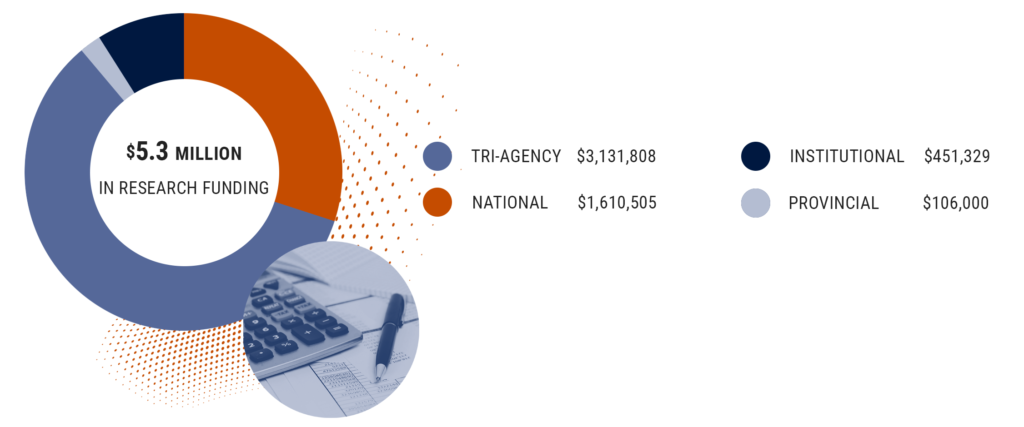 ARiEAL researchers had 20 new research grants awarded as Principal Investigators or Co-investigators in 2020. Funding totalled 5.3 million dollars across these newly commenced projects. Four additional research projects were originally awarded but later unfunded due to COVID-19.
ARiEAL researchers had 20 new research grants awarded as Principal Investigators or Co-investigators in 2020. Funding totalled 5.3 million dollars across these newly commenced projects. Four additional research projects were originally awarded but later unfunded due to COVID-19.
Funding sources include the Canadian Institutes of Health Research (CIHR), the Social Sciences and Humanities Research Council (SSHRC), the Ontario Brain Institute, and the McMaster Institute for Research on Aging and Labarge Foundation, as well as various other funding agencies.
Archibald, L. Disciplinary crossroads in identifying developmental language disorder. Social Sciences and Humanities Research Council Connection Grant, $47,284, 2020-2021. Archibald, L., King, C., Davison, C. Evaluation of extracurricular reading instruction programs. University of Western Ontario Internal SSHRC Seed, $22,077, 2020-2021. DeMatteo, C., Gjertsen, D., Stazyk, K., DeRezze, B., Hucal, M. Concussion 2020 – Let’s Play Safely – prevention and management. Ontario Brain Institute Event Grant, $5,000, 2020. Hasey, G., Reilly, J., Minuzzi, L. Using machine learning and electroencephalography to detect suicidal ideation in patients with mood disorder. Academic Health Science Centre AFP Innovation Fund, $200,000, 2020-2021. Kučerová, I. The Syntax Laboratory. Ontario Research Fund: Research Infrastructure, $73,566, 2020. Kučerová, I., Maracle, B., Kentyóhkwa, O., Elijah, E., Twatati Oneida Language Committee, Printup, L., Nęyękwawętaʔθkwáhshek Tuscarora Language Program, & DeCaire, R. Transnational network for Indigenous language revitalization: building partnerships and capacity for community-based language programs. Social Sciences and Humanities Research Council Partnership Development Grant, $297,204, 2020. Kuperman, V. COVID-19 social mobility grant. McMaster Institute for Research on Aging and Labarge Foundation, $25,000, 2020-2021. Liu-Ambrose, T., Raina, P., Smith, E., Griffith, L., Wolfson, C., Hogan, D., Kirkland, S., Menec, V., Noseworthy, M. D. Canadian longitudinal study on aging (CLSA) Covid-19 research platform: Studying the Impact of the Covid-19 Pandemic on Cognitive and Brain Health. Weston Brain Institute, $1,247,983, 2020-2022. Noseworthy, M. D., Kumbhare, D. A., Dobranowski, J. Correlating advanced magnetic resonance imaging (MRI) metrics with single nucleotide polymorphisms (SNPs) to assess and predict recovery from mild traumatic brain injury (mTBI). Juravinski Research Institute, $180,000, 2020. Papaioannou, A., Adachi, J. D., Hewston, P., Ioannidis, G., Kennedy, C., Lee, J., Marr, S., McArthur, C., Noseworthy, M. D. Changing the trajectory and treatment of sarcopenia in older adults: a randomized control trial. HAHSO AFP Innovation Grant, $199,752, 2020-2021. Rafat, Y., Overduin, M. & Joanisse, M. How handwriting and typewriting may help or hinder second language learning. Social Sciences and Humanities Research Council Partnership Engage Grants COVID-19 Special Initiative, $47,320, 2020-2022. Service, E. & Torshizi, N. Outcome effects in negotiating in a second language. Mitacs Research Training, $6,000, 2020. Singh, R. & Kučerová, I. Linguistics approaches to machine learning tasks in natural language processing. Mitacs Research Training, $3,000, 2020. Sonnadara, R. R. & Khedri, R. CanIDS phase 2 extension. CANARIE Joint Security Project Aggregation and Visualization Tools, $50,000, 2020. Sonnadara, R. R. & Vaid, S. Using causal AI to minimize biases in B2B markets. McMaster Interdisciplinary Research Excellence Fund, $24,000, 2020. Sonnadara, R. R., Amin, N., Acai, A., Wagner, N., Bernard, J., & Kuperman, V. Use of machine learning for textual analysis of narrative comments in medical education. McMaster University McMaster Surgical Associates Education Research Grant. (Awarded but unfunded due to COVID-19) Sonnadara, R. R., Bhandari, M., Dhindsa, K., Bosnyak, D., McNeill., Acai, A. Measuring the effect of naturally-occurring mind wandering on observational learning in surgical residents. McMaster University McMaster Surgical Associates Education Research Grant. (Awarded but unfunded due to COVID-19) Sonnadara, R. R., Kelly, S., Tran, C. K, Zering, J. C. Implementation and evaluation of a surgical coaching checklist. McMaster University McMaster Surgical Associates Education Research Grant. (Awarded but unfunded due to COVID-19) Sonnadara, R. R., McKinnon, V., Zering, J. C., Chin, B. Coaching in plastic surgery: simulation applications in the cadaver lab. McMaster University Department of Surgery – The First Cut (Virtual Edition), $500, 2020. Sonnadara, R. R., Peterson, D., Bryant, D., McNeill, K. Self-directed learning for musculoskeletal medicine in undergraduate medical education. McMaster University McMaster Surgical Associates Education Research Grant. (Awarded but unfunded due to COVID-19) Thoma, B. & Woods, R., Sonnadara, R. R., Monteiro, S., Yilmaz, Y., Sherbino, J., Bernard, J., Hall, AK., Cheung, W.J., Debajyoti, M., Lineberry, M., & Chan, T.M. Enhancing competency-based medical education assessment with machine learning, natural language processing, and other advanced analytic techniques. College of Medicine Research Award, $29,956, 2020. Timmons, B., DeMatteo, C., Noseworthy, M., Sharma, B., Colterjohn, M., Koelink, E. The Concussion, Exercise, and Brain Networks ConExNet study. Canadian Institutes of Health Research, $240,000, 2020-2023. Turkstra, L., & Wiseman-Hakes, C. Addressing the needs of youth with TBI in the Ontario youth criminal justice system: creating an implementation process for TBI screening. Ontario Neurotrauma Foundation, $101,000, 2020-2021. Werker, J., Newman, A., Fyshe, A., Herdman, A., Gick, B., Kam, C. H., Epp, C. D., Li, G., Yeung, H., Edwards, J., Thomson, A., Jasinska, K., Joanisse, M., Turin, M., Hoskyn, M., Abdul-Mageed, M., Ng, R., Deacon, S. H., Rvachew, S., Curtin, S., Steventon, S., Chen, X. Ensuring full literacy in a digital world. Social Sciences and Humanities Research Council Partnership Grant, $2,500,000, 2020-2028.
View full list of 2020 grants
 ARiEAL researchers published 44 articles and 3 book chapters in 2020. Broadly, the research topics included semantic interpretation, language processing, and the use of neuroimaging and machine learning in acquired brain injury and other clinical fields.
ARiEAL researchers published 44 articles and 3 book chapters in 2020. Broadly, the research topics included semantic interpretation, language processing, and the use of neuroimaging and machine learning in acquired brain injury and other clinical fields.
Featured below are a selection of these articles:
Bartošová, J., Chapman, C., Kučerová, I., & Service, E. (2020). Making semantic commitments can be delayed: evidence from aspectual processing. Canadian Journal of Experimental Psychology/Revue canadienne de psychologie expérimentale. https://doi.org/10.1037/cep0000227
Boshra, R., Ruiter, K. I., Dhindsa, K., Sonnadara, R., Reilly, J. P., & Connolly, J. F. (2020). On the time-course of functional connectivity: theory of a dynamic progression of concussion effects. Brain Communications, 2(2), fcaa063. https://doi.org/10.1093/braincomms/fcaa063
Desmeules-Trudel, F., & Joanisse, M. F. (2020). Discrimination of four Canadian-French vowels by native Canadian-English listeners. The Journal of the Acoustical Society of America, 147(5), EL391-EL395. https://doi.org/10.1121/10.0001180
Schmidtke, D., & Moro, A. L. (2020). Determinants of word‐reading development in English learner university students: A longitudinal eye movement study. Reading Research Quarterly, Online First, 1– 36. https://doi.org/10.1002/rrq.362
Turkstra, L. S., Mutlu, B., Ryan, C. W., Despins Stafslien, E. H., Richmond, E. K., Hosokawa, E., & Duff, M. C. (2020). Sex and gender differences in emotion recognition and theory of mind after TBI: a narrative review and directions for future research. Frontiers in Neurology, 11, 59. https://dx.doi.org/10.3389%2Ffneur.2020.00059
View full list of 2020 articles Acai, A., Mahetaji, K., Reid, S. E., & Sonnadara, R. R. (2020). The role of gender in the decision to pursue a surgical career: A qualitative, interview-based study. Canadian Medical Education Journal, 11(4), e51. https://doi.org/10.36834/cmej.69292 Anand, S. S., Friedrich, M. G., Desai, D., Schulze, K. M., Awadalla, P., Busseuil, D., Dummer, T. J. B., Jacquemont, S., Dick, A., Kelton, D., Kirpalani, A., Lear, S. A., Leipsic, J., Noseworthy, M. D., Parker, L., Parraga, G., Poirier, P., Robson, P., Tardif, J., Teo, K., Vena, J., Yusuf, S., Moody, A. R., Black, S. E., Smith, E. E., and on behalf of the Canadian Alliance for Healthy Hearts and Minds Cohort. (2020). Reduced cognitive assessment scores among individuals with magnetic resonance imaging–detected vascular brain injury. Stroke, 51(4), 1158-1165. https://doi.org/10.1161/STROKEAHA.119.028179 Anand, S. S., Tu, J. V., Desai, D., Awadalla, P., Robson, P., Jacquemont, S., Dummer, D., Le, N., Parker, L., Poirier, P., Teo, K., Lear, S. A., Yusuf, S., Tardif, J., Marcotte, F., Busseuil, D., Després, J., Black, S. E., Kirpalani,A., Parraga, G., Noseworthy, M. D., Dick, A., Leipsic, J., Kelton, D., Vena, J., Thomas, M., Schulze, K. M., Larose, E., Moody, A. R., Smith, E. E., & Friedrich, M. G. (2020). Cardiovascular risk scoring and magnetic resonance imaging detected subclinical cerebrovascular disease. European Heart Journal-Cardiovascular Imaging, 21(6), 692-700. https://doi.org/10.1093/ehjci/jez226 Bartošová, J., Chapman, C., Kučerová, I., & Service, E. (2020). Making semantic commitments can be delayed: evidence from aspectual processing. Canadian Journal of Experimental Psychology/Revue canadienne de psychologie expérimentale, 75(1), 77–92. https://doi.org/10.1037/cep0000227 Bertram, R., & Kuperman, V. (2020). The English disease in Finnish compound processing: backward transfer effects in Finnish–English bilinguals. Bilingualism: Language and Cognition, 23(3), 579-590. https://doi.org/10.1017/S1366728919000312 Black, M., Joanisse, M. F., & Rafat, Y. (2020). Language dominance modulates the perception of Spanish approximants among late bilinguals. Languages, 5(1), 7. https://doi.org/10.3390/languages5010007 Boshra, R., Ruiter, K. I., Dhindsa, K., Sonnadara, R., Reilly, J. P., & Connolly, J. F. (2020). On the time-course of functional connectivity: theory of a dynamic progression of concussion effects. Brain Communications, 2(2), fcaa063. https://doi.org/10.1093/braincomms/fcaa063 Ciprian, C., Masychev, K., Ravan, M., Reilly, J. P., & Maccrimmon, D. (2020). A machine learning approach using effective connectivity to predict response to clozapine treatment. IEEE Transactions on Neural Systems and Rehabilitation Engineering, 28(12), 2598-2607. https://doi.org/10.1109/TNSRE.2020.3019685 Danielli, E., DeMatteo, C., Hall, G. B., & Noseworthy, M. D. (2020). A review of MRI and exercise treatment for improved concussion diagnosis and recovery. Critical Reviews™ in Biomedical Engineering, 48(5), 261-283. https://doi.org/10.1615/CritRevBiomedEng.2020034991 Desmeules-Trudel, F., & Joanisse, M. F. (2020). Discrimination of four Canadian-French vowels by native Canadian-English listeners. The Journal of the Acoustical Society of America, 147(5), EL391-EL395. https://doi.org/10.1121/10.0001180 Dhindsa, K., Cook, O., Mudway, T., Khawaja, A., Harwood, R., & Sonnadara, R. (2020). LFSpy: a python implementation of local feature selection for data classification with scikit-learn compatibility. Journal of Open Source Software, 5(49), 1958. https://doi.org/10.21105/joss.01958 Fahim, C., Acai, A., McConnell, M. M., Wright, F. C., Sonnadara, R. R., & Simunovic, M. (2020). Use of the theoretical domains framework and behaviour change wheel to develop a novel intervention to improve the quality of multidisciplinary cancer conference decision-making. BMC Health Services Research, 20(1), 1-19. https://doi.org/10.1186/s12913-020-05255-w Fahim, C., McConnell, M. M., Wright, F. C., Sonnadara, R. R., & Simunovic, M. (2020). Use of the KT-MCC strategy to improve the quality of decision making for multidisciplinary cancer conferences: a pilot study. BMC Health Services Research, 20(1), 1-12. https://doi.org/10.1186/s12913-020-05143-3 Gatti, A. A., Keir, P. J., Noseworthy, M. D., Beauchamp, M. K., & Maly, M. R. (2020). Hip and ankle kinematics are the most important predictors of knee joint loading during bicycling. Journal of Science and Medicine in Sport, 24(1), 98-104. https://doi.org/10.1016/j.jsams.2020.07.001 Han, X., Wu, Y., Zhong, Y., & Becker, S. (2020). Recovery of high interference memory in spite of lingering cognitive deficits in a longitudinal pilot study of hospitalized depressed patients. Frontiers in Psychiatry, 11, 736. https://doi.org/10.3389/fpsyt.2020.00736 Harasym, D., Turco, C. V., Nicolini, C., Toepp, S. L., Jenkins, E., Gibala, M. J., Noseworthy, M. D., & Nelson, A. J. (2020). Fitness level influences white matter microstructure in postmenopausal women. Frontiers in Aging Neuroscience, 12, 129. https://doi.org/10.3389/fnagi.2020.00129 Hart, T., Ferraro, M., Rabinowitz, A., Fitzpatrick DeSalme, E., Nelson, L., Marcy, E., … & Turkstra, L. (2020). Improving communication with patients in post-traumatic amnesia: development and impact of a clinical protocol. Brain Injury, 34(11), 1518-1524. https://doi.org/10.1080/02699052.2020.1809710 Ho, R. A., Hall, G. B., Noseworthy, M. D., & DeMatteo, C. (2020). Post-concussive depression: evaluating depressive symptoms following concussion in adolescents and its effects on executive function. Brain Injury, 34(4), 520-527. https://doi.org/10.1080/02699052.2020.1725841 Imbault, C., Titone, D., Warriner, A.-B., & Kuperman, V. (2020). How are words felt in a second language: Norms for 2,628 English words for valence and arousal by non-native speakers. Bilingualism: Language and Cognition. 24(2), 281-292. https://doi.org/10.1017/S1366728920000474 Kalun, P., Dunn, K., Wagner, N., Pulakunta, T., & Sonnadara, R. R. (2020). Recent evidence on visual-spatial ability in surgical education: a scoping review. Canadian Medical Education Journal, 11(6), e111. https://dx.doi.org/10.36834%2Fcmej.69051 Krokhine, S. N., Ewers, N. P., Mangold, K. I., Boshra, R., Lin, C. Y. A., & Connolly, J. F. (2020). N2b reflects the cognitive changes in executive functioning after concussion: A scoping review. Frontiers in Human Neuroscience, 14. https://dx.doi.org/10.3389%2Ffnhum.2020.601370 Kuperman, V., & Deutsch, A. (2020). Morphological and visual cues in compound word reading: eye-tracking evidence from Hebrew. Quarterly Journal of Experimental Psychology, 73(12), 2177-2187. https://doi.org/10.1177%2F1747021820940297 Liu, P., Vandemeer, M. R., Joanisse, M. F., Barch, D. M., Dozois, D. J., & Hayden, E. P. (2020). Depressogenic self-schemas are associated with smaller regional grey matter volume in never-depressed preadolescents. NeuroImage: Clinical, 28, 102422. https://doi.org/10.1016/j.nicl.2020.102422 Liu, P., Vandermeer, M. R., Joanisse, M. F., Barch, D. M., Dozois, D. J., & Hayden, E. P. (2020). Neural activity during self-referential processing in children at risk for depression. Biological Psychiatry: Cognitive Neuroscience and Neuroimaging, 5(4), 429-437. https://doi.org/10.1016/j.bpsc.2019.12.012 Locke, M. B., Toepp, S. L., Turco, C. V., Harasym, D. H., Rathbone, M. P., Noseworthy, M. D., & Nelson, A. J. (2020). Altered motor system function in post-concussion syndrome as assessed via transcranial magnetic stimulation. Clinical Neurophysiology Practice, 5, 157-164. https://doi.org/10.1016/j.cnp.2020.07.004 Oyesanya, T. O., Turkstra, L. S., & Brown, R. L. (2020). Development, reliability, and validity of the perceptions of brain injury survey. Journal of Nursing Measurement, 28(2), 229-258. https://doi.org/10.1891/jnm-d-19-00007 Pham, T., Kang, J. H., Johnson, A., & Archibald, L. M. (2020). Feature-focusing constraints on implicit learning of function word and meaning associations. Applied Psycholinguistics, 41(2), 401-426. https://doi.org/10.1017/S0142716420000041 Považan, M., Mikkelsen, M., Berrington, A., Bhattacharyya, P. K., Brix, M. K., Buur, P. F., Cecil, K. M., Chan, K. L., Chen, D. Y.T., Craven, A. R., Cuypers, K., Dacko, M., Duncan, N. W., Dydak, U., Edmondson, D. A., Ende, G., Ersland, L., Forbes, M. A., Gao, F., Greenhouse, I., Harris, A. D., He, N., Heba, S., Hoggard, N., Hsu, T., Jansen, J, F.A., Kangarlu, A., Lange, T., Lebel, R. M., Li, Y., Lin, C. E., Liou, J., Lirng, J., Liu, F., Long, J. R., Ma, R., Maes, C., Moreno-Ortega, M., Murray, S. O., Noah, S., Noeske, R., Noseworthy, M. D., Oeltzschner, G., Porges, E. C., Prisciandaro, J. J., Puts, N. A.J., Roberts, T. P.L., Sack, M., Sailasuta, N., Saleh, M. G., Schallmo, M., Simard, N., Stoffers, D., Swinnen, S. P., Tegenthoff, M., Truong, P., Wang, G., Wilkinson, I. D., Wittsack, H., Woods, A. J., Xu, H., Yan, F., Zhang, C., Zipunnikov, V., Zöllner, H. J., Edden, R. A. E., & Barker, P. B. (2020). Comparison of multivendor single-voxel MR spectroscopy data acquired in healthy brain at 26 sites. Radiology, 295(1), 171-180. https://doi.org/10.1148/radiol.2020191037 Ruiter, K. I., Boshra, R., DeMatteo, C., Noseworthy, M., & Connolly, J. F. (2020). Neurophysiological markers of cognitive deficits and recovery in concussed adolescents. Brain Research, 1746, 146998. https://doi.org/10.1016/j.brainres.2020.146998 Santos-Díaz, A., & Noseworthy, M. D. (2020). Phosphorus magnetic resonance spectroscopy and imaging (31P-MRS/MRSI) as a window to brain and muscle metabolism: a review of the methods. Biomedical Signal Processing and Control, 60, 101967. https://doi.org/10.1016/j.bspc.2020.101967 Schmidtke, D., & Moro, A. L. (2020). Determinants of Word‐Reading Development in English Learner University Students: A Longitudinal Eye Movement Study. Reading Research Quarterly. https://doi.org/10.1002/rrq.362 Sikkes, S. A., Tang, Y., Jutten, R. J., Wesselman, L. M., Turkstra, L. S., Brodaty, H., … & Bahar‐Fuchs, A. (2020). Toward a theory‐based specification of non‐pharmacological treatments in aging and dementia: Focused reviews and methodological recommendations. Alzheimer’s & Dementia. https://doi.org/10.1002/alz.12188 Smail, L. C., Dhindsa, K., Braga, L. H., Becker, S., & Sonnadara, R. R. (2020). Using deep learning algorithms to grade hydronephrosis severity: toward a clinical adjunct. Frontiers in Pediatrics, 8, 1. https://doi.org/10.3389/fped.2020.00001 Smyth, R. E., Theurer, J., Archibald, L. M., & Oram Cardy, J. (2020). Lessons learned in practice-based research: Studying language interventions for young children in the real world. Autism & Developmental Language Impairments, 5, 2396941520913482. https://doi.org/10.1177%2F2396941520913482 Snefjella, B., Lana, N., & Kuperman, V. (2020). How emotion is learned: Semantic learning of novel words in emotional contexts. Journal of Memory and Language, 115, 104–171. https://doi.org/10.1016/j.jml.2020.104171 Stafslien, E. D., & Turkstra, L. S. (2020). Sex-based differences in expectations for social communication after TBI. Brain Injury, 34(13-14), 1756-1762. https://doi.org/10.1080/02699052.2020.1849799 Svenningsen, S., McIntosh, M., Ouriadov, A., Matheson, A. M., Konyer, N. B., Eddy, R. L., McCormack, D. G., Noseworthy M, D., Parameswaran, N., & Parraga, G. (2020). Reproducibility of hyperpolarized 129Xe MRI ventilation defect percent in severe asthma to evaluate clinical trial feasibility. Academic Radiology. https://doi.org/10.1016/j.acra.2020.04.025 Turkstra, L. S., Mutlu, B., Ryan, C. W., Despins Stafslien, E. H., Richmond, E. K., Hosokawa, E., & Duff, M. C. (2020). Sex and gender differences in emotion recognition and theory of mind after TBI: a narrative review and directions for future research. Frontiers in Neurology, 11, 59. https://dx.doi.org/10.3389%2Ffneur.2020.00059 Vanden Bosch der Nederlanden, C. M., Joanisse, M. F., & Grahn, J. A. (2020). Music as a scaffold for listening to speech: better neural phase-locking to song than speech. NeuroImage, 214, 116767. https://doi.org/10.1016/j.neuroimage.2020.116767 Vandermeer, M. R., Liu, P., Ali, O. M., Daoust, A. R., Joanisse, M. F., Barch, D. M., & Hayden, E. P. (2020). Orbitofrontal cortex grey matter volume is related to children’s depressive symptoms. NeuroImage: Clinical, 28, 102395. https://doi.org/10.1016/j.nicl.2020.102395 Wang, J., Joanisse, M. F., & Booth, J. R. (2020). Letter fluency in 7-8-year-old children is related to the anterior, but not posterior, ventral occipito-temporal cortex during an auditory phonological task. Developmental Cognitive Neuroscience, 47, 100898. https://doi.org/10.1016/j.dcn.2020.100898 Wang, J., Joanisse, M. F., & Booth, J. R. (2020). Neural representations of phonology in temporal cortex scaffold longitudinal reading gains in 5-to 7-year-old children. NeuroImage, 207, 116359. https://doi.org/10.1016/j.neuroimage.2019.116359 Xue, J., Li, B., Yan, R., Gruen, J. R., Feng, T., Joanisse, M. F., & Malins, J. G. (2020). The temporal dynamics of first and second language processing: ERPs to spoken words in Mandarin-English bilinguals. Neuropsychologia, 146, 107562. https://doi.org/10.1016/j.neuropsychologia.2020.107562 Ylinen, S., Service, I., & Nora, A. (2020). Better phonological short-term memory is linked to improved cortical memory representations for word forms and better word learning. Frontiers in Human Neuroscience, 14, 209. https://doi.org/10.3389/fnhum.2020.00209
View full list of 2020 book chapters
Connolly, J. F. (2020). Clinical neurophysiology: Research methods and event-related potential components as assessment tools. In Gallagher, A., Bulteau, C., Cohen, D., Michaud, J. L. Handbook of clinical neurology. (Vol. 174, pp. 277-287). Amsterdam, Netherlands: Elsevier. https://doi.org/10.1016/B978-0-444-64148-9.00020-X Kučerová, I. (2020). Labeling as two-stage process: Evidence from semantic agreement. In Van Craenenbroeck, J., Pots, C., Temmerman, T. Recent Developments in Phase Theory. (pp. 183 – 212). Berlin, Germany: Mouton de Gruyter. https://doi.org/10.1515/9781501510199 Schmidtke, D., & Kuperman, V. (2020). Psycholinguistic methods and tasks in morphology. In Aronoff, M. (Eds.). Oxford Research Encyclopedia of Linguistics. Oxford, England: Oxford University Press. https://doi.org/10.1093/acrefore/9780199384655.013.600

ARiEAL researchers presented 29 invited talks and 45 peer-reviewed conference presentations in 2020, with the majority being delivered virtually.
Featured below are a selection of these presentations:
Becker, S. (2020, February). Tracking medial temporal lobe function through cognitive and intrinsic brain network measures. Rotman Research Institute Research Day. Toronto, Canada. (Invited)
Kuperman, V., Kyröläinen, A., Gillett, J., & Sonnadara, R. R. (2020, December). Optimism in time of the pandemic: evidence from story-writing. McMaster Institute for Research on Aging Showcase. Hamiton, Canada. (Poster; Delivered Online)
Noseworthy, M. D. (2020, February). Advanced MR imaging methods for personalized assessment of brain radiation necrosis. Paul Scherrer Institute. Zurich, Switzerland. (Invited)
Practile, T., Marshall, C., & DeMatteo, C. (2020, May). Examining how time from sport-related concussion to initial assessment predicts return-to-play clearance. CASEM-AQMS Sport Medicine Conference. Banff, Canada. (Delivered Online)
Żygis, M., Jaskula, M., Pape, D., & Koenig, L. (2020, March). Do children understand themselves or adults better? A production and perception study of Polish /s, ɕ, ʂ/. Brown Bag Lunch. Berlin, Germany. (Invited; Delivered Online)
View full list of 2020 presentations Acai, A., Mahetaji, K., Reid, S. E., & Sonnadara, R. R. (2020, March). The role of gender in the decision to pursue a surgical career: perspectives and experiences from two academic centres. Annual Ontario Student Medical Education Research Conference. Toronto, Canada. (Cancelled Due to COVID) Amador, A., Harrison, A., Noseworthy, M. D. (2020, September). The MRI cold head artifact is no longer a significant problem for simultaneous fMRI/EEG experiments. European Society for Magnetic Resonance in Medicine and Biology. Barcelona, Spain. (Delivered Online) Archibald, L. (2020, February). Developmental language disorder – implementation in Ontario. Meeting of the Chief School Board SLPs of Ontario. Toronto, Canada. (Invited) Archibald, L. (2020, April). Developmental language disorder: exploring the definition in detail. Windsor Essex County District School Board. Windsor, Canada. (Invited; Delivered Online) Archibald, L. (2020, May). Criteria and crucial conversations of DLD. Annual Conference of Speech-language Pathology and Audiology. Ottawa, Canada. (Invited; Cancelled Due to COVID) Archibald, L. (2020, May). The multiplicity of cognitive paths and learning outcomes in development. Invited Lecturer for the 2020 Donald G. Doehring Memorial Lecture, McGill University. Montreal, Canada. (Invited; Cancelled Due to COVID) Archibald, L. (2020, June). Developmental language disorder: exploring the definition in detail. Upper Grand District School Board. Guelph, Canada. (Invited; Delivered Online) Archibald, L. (2020, June). Developmental language disorder. Workshop for the Centre of Excellence for Speech Language Development. English Montreal School Board. Montreal, Canada (Invited; Cancelled Due to COVID) Bardell, T., Schouten, M., & Archibald, L. (2020, June). Comparing practice-based spoken versus iPad-administered versions of a narrative retell progress monitoring tool. Symposium on Research in Child Language Disorders. Madison, USA. (Cancelled Due to COVID) Becker, S. (2020, February). Tracking medial temporal lobe function through cognitive and intrinsic brain network measures. Rotman Research Institute Research Day. Toronto, Canada. (Invited) Capaldi, D. P. I., Konyer, N. B., Kjarsgaard, M., Noseworthy, M. D., Parraga, G., Nair, P., & Svenningsen, S. (2020, August). Sensitivity to small airways response to bronchodilator in severe asthma. International Society for Magnetic Resonance in Medicine. (Delivered Online; Poster) Connolly, J. F. (2020, October). Moving beyond diagnosis: objectively assessing neurocognitive consequences of concussion. BIAPH Health Advocates Education Conference. Mississauga, Canada. (Invited; Delivered Online) Connolly, J. F. (2020, November). Identifying the effects of COVID-19 on cognitive function and recovery trajectories. Neurological Health Charities Canada. North York, Canada. (Invited; Delivered Online) Connolly, J. F. (2020, December). SARS-CoV-2 (COVID-19): Objective assessment of persistent cognitive dysfunction as a first step in treatment decisions. The Scientist, Webinar Series, Beyond Acute Respiratory: SARS-CoV2’s Effects on Long-Term Physiology. (Invited; Delivered Online) Connolly, J. F. & Boshra, R. (2020, January). A brief history of electrophysiological research on brain injury and recent advances enabled by machine learning. Vector Institute. Toronto, Canada. (Invited) Connolly, J. F. & Boshra, R. (2020, March). Electrophysiological markers of cognitive dysfunction in brain injury and machine learning methods of revealing them. Focus Program on New Geometric Methods in Neuroscience, The Fields Institutes for Research in Mathematical Sciences. Toronto, Canada. (Invited) Connolly, J. F., Boshra, R., & Ruiter K. I. (2020, January). Determining cognitive function after brain injury – from coma to concussion. Holland Bloorview Kids Rehabilitation Hospital. Toronto, Canada. (Invited) Cross, A., Steinbach, K., Lovett, M., Frijters, J., Archibald, L., & Joanisse, M. (2020, June). Predicting response to reading intervention based on structural and functional brain connectivity. Symposium on Research in Child Language Disorders. Madison, USA. (Cancelled Due to COVID) Davison, C., Klein, P., & Archibald, L. (2020, June). Impact of explicit whole class oral narrative intervention on oral and written language in grade 1 students. Symposium on Research in Child Language Disorders. Madison, USA. (Cancelled Due to COVID) Fu, G. & Noseworthy M. D. (2020, September). Increased connectivity in default mode and salience networks in video game players: A rsfMRI study on task-based (tfMRI) data. European Society for Magnetic Resonance in Medicine and Biology. Barcelona, Spain. (Delivered Online) Georgan, W., Archibald, L., & Hogan, T. (2020, June). Speech/language impairment or specific learning disability? Explaining the shift in educational labels. Symposium on Research in Child Language Disorders. Madison, USA. (Cancelled Due to COVID) Goubran, M., Ozzoude, M., Adamo, S., Zukotynski, K., Bocti, C., Borrie, M., Chertkow, H., Frayne, R., Gao, F., Hsiung, R., Kiss, A., Laforce, R. Jr., Noseworthy, M. D., Prato, F. S., Ramirez, J., Sahlas, J. D., Scott, C., Smith, E. E., Sossi, V., & Strother (2020, January). Relationship between amyloid load, white matter microstructure and cognitive performance in patients with significant white matter disease. Human Amyloid Imaging Conference. Miami, USA. Kalun, P., Wilson, D., Zering, J. C., Tran, C. K., & Sonnadara, R. R. (2020, September). Do entrustment-based ratings accurately reflect trainee performance? International Conference on Residency Education. Vancouver, Canada. (Cancelled Due to COVID) Konyer, N. B., Menon, N., Polak, P., Nair, P., Noseworthy, M. D., & Svenningsen, S. (2020, August). Discrete wavelet transform (DWT) denoising of hyperpolarized 129Xe MR images. International Society for Magnetic Resonance in Medicine. (Delivered Online; Poster) Kučerová, I., Chapman, C., & Moulton, K. (2020, March). How to value gender: lexicon, agree and feature transmission under ellipsis. West Coast Conference in Formal Linguistics (WCCFL) 38. Vancouver, Canada. (Delivered Online) Kučerová, I. & Szczegielnaik, A. (2020, May). Gender as a generalized noun feature: evidence from Slavic and Semitic. Annual meeting of the Formal Approaches to Slavic Linguistics. Seattle, USA. (Delivered Online) Kučerová, I. & Szczegielnaik, A. (2020, May). Slavic meets Semitic: nominal functional categories as underspecified heads. Canadian Linguistics Association (CLA-ACL) annual meeting. London, Canada. (Delivered Online) Kučerová, I. & Szczegielnaik, A. (2020, September). Syntactic variation meets PF uniformity: underspecification of nominal functional categories. Cambridge Comparative Syntax (CamCoS 9) conference. Newcastle, United Kingdom. (Delivered Online) Kuiack., A., Leggett, J., Shaffalovitch, S., & Archibald, L. (2020, June). A grade 1 language and literacy project. Poster Presented at the Symposium on Research in Child Language Disorders. Symposium on Research in Child Language Disorders. Madison, USA. (Cancelled Due to COVID) Kuperman, V. (2020, January). MECO: Multilingual corpus of eye movements. Ontario Institute for Studies in Education. Toronto, Canada. (Invited) Kuperman, V. (2020, November). Behavioral mega-studies as a rich source of bilingual data. Fall School “Languages in Contact”. Tomsk, Russia. (Invited; Delivered Online) Kuperman, V. (2020, November). The multilingual eye-movements corpus in L1 and L2. Fall School “Languages in Contact”. Tomsk, Russia. (Invited; Delivered Online) Kuperman, V. (2020, December). Story-writing and emotional well-being during the pandemic. McMaster Institute for Research on Aging Showcase. Hamilton, Canada. (Invited; Delivered Online) Kuperman, V., Kyröläinen, A., Gillett, J., & Sonnadara, R. R. (2020, December). Optimism in time of the pandemic: evidence from story-writing. McMaster Institute for Research on Aging Showcase. Hamilton, Canada. (Poster; Delivered Online) Ledoux, A. A., Barrowman, N., Bijelic, V., Davis, A., Reid, S., Sangha, G., Yeates, K. O., DeMatteo, C., Reed, N., & Zemek, R. (2020, May). Pediatric Concussion Assessment of Rest and Exertion (PedCARE): A Multicentre Randomized Clinical Trial. Pediatric Academic Societies 2020 Conference. Philadelphia, USA. (Cancelled Due to COVID) Mann, R., Acai, A., & Sonnadara, R. R. (2020, March). Data source prioritization among novice raters in competence committee decision making. Annual Ontario Student Medical Education Research Conference. Toronto, Canada. (Cancelled Due to COVID) Mann, R., Acai, A., & Sonnadara, R. R. (2020, June). Data source prioritization among novice raters in competence committee decision making. Norman Education Research Day. Hamilton, Canada. (Delivered Online). Mann, R., Acai, A., & Sonnadara, R. R. (2020, June). What are we ‘weighting’ for? Data source prioritization among novice raters in competence committee decision making. 50th Annual Ontario Psychology Undergraduate Thesis Conference. Toronto, Canada. (Delivered Online) Mann, R., Acai, A., & Sonnadara, R. R. (2020, September). Data source prioritization among novice raters in competence committee decision making. International Conference on Residency Education. Vancouver, Canada. (Cancelled Due to COVID) McKinnon, V. E., Tran, C., Zering, J. C., & Sonnadara, R. R. (2020, April). Coaching: A state-of-the-art review. Canadian Conference on Medical Education. Vancouver, Canada. (Cancelled Due to COVID) Noseworthy, M. D. (2020, February). Advanced MR imaging methods for personalized assessment of brain radiation necrosis. Paul Scherrer Institute. Zurich, Switzerland. (Invited) Noseworthy, M. D. (2020, October). Safety issues concerning gadolinium chelates. Guest Speaker, Ontario Association of Medical Radiation Sciences (OAMRS) Virtual MRI Safety Symposium. (Invited; Delivered Online) Oralova, G., Boshra, R., Kyröläinen. A-J., Connolly, J. F., & Kuperman, V. (2020, November). Individual differences in spelling proficiency as reflected by simultaneous EEG and eye-tracking. 61st Annual Psychonomic Society Meeting . Austin, USA. (Delivered Online) Oralova, G., Boshra R., Schmidtke, D., Kyröläinen, A-J., Connolly, J. F., & Kuperman, V. (2020, October). The chicken or the egg? The timeline for lexical and semantic effects in derived word recognition using simultaneous recording of EEG and eye-tracking. Words in the World International Conference, Online. Niagara, Canada. (Delivered Online) Pham, T. & Archibald, L. (2020, June). Do semantic resources supplement phonological short-term memory? Symposium on Research in Child Language Disorders. Madison, USA. (Cancelled Due to COVID) Polak, P. & Noseworthy, M. D. (2020, September). The effect of noise in measurement of the 23Na modulation transfer function (MTF): a simulation study. European Society for Magnetic Resonance in Medicine and Biology. Barcelona, Spain. (Delivered Online) Polak, P., Schulte, R., & Noseworthy, M. D. (2020, September). Measurement of 23Na point-spread function (PSF) in ultrashort TE (UTE) acquisitions in a 3D printed resolution phantom. European Society for Magnetic Resonance in Medicine and Biology. Barcelona, Spain. (Delivered Online) Practile, T., Marshall, C., & DeMatteo, C. (2020, May). Examining how time from sport-related concussion to initial assessment predicts return-to-play clearance. CASEM-AQMS Sport Medicine Conference. Banff, Canada. (Delivered Online) Ramirez, J., Zukotynski, K., Gao, F., Gaudet, V., Kuo, P. H., Adamo, S., Goubran, M., Scott C. J. M., Bocti, C., Borrie, M., Chertkow, H., Frayne, R., Hsiung, R., Laforce, R., Noseworthy, M. D., Prato, F. S., Sahlas, D. J., Smith, E. E., Sossi, V., & Thiel, A., (2020, October). Cerebral microbleeds and MRI-visible perivascular spaces, lacunes, cognition, and amyloid PET status, in patients with significant white matter disease. 7th International Cerebral Amyloid Angiopathy Conference. Banff, Canada. (Delivered Online) Reimers, E., Chronik, B., Noseworthy, M. D., Konyer, N., & Farncombe, T. (2020, October). Measurement of MR gradient effects in CZT detectors used in a SPECT/MRI System. IEEE Nuclear Science and Medical Imaging Conference. Boston, USA. (Delivered Online) Schmidtke, D., Rahmanian, S. & Moro, A. (2020, October). A head start in reading ability: the effect of early phonological awareness on change in ESL passage reading behaviour and reading habits. Words in the World International Conference. (Delivered Online) Schmidtke, D., Rahmanian, S. & Moro, A. (2020, November). The role of language experience on morphological knowledge: a longitudinal study of written complex word production in second language learners. 61st Annual Psychonomic Society Meeting. (Poster; Delivered Online) Sideris, B. E., Kalun, P., Zering, J. C., & Sonnadara, R. R. (2020, March). Observing others suture: Do novices benefit from observing errors? Annual Ontario Student Medical Education Research Conference. Toronto, Canada. (Poster; Cancelled Due to COVID) Sideris, B. E., Kalun, P., Zering, J. C., & Sonnadara, R. R. (2020, September). Observing others suture: Do novices benefit from observing errors? International Conference on Residency Education. Vancouver, Canada. (Cancelled Due to COVID) Simons, A., Reilly, J., Doyle, T., & Musson, D. (2020, October). Impact of physiological sensor variance on machine learning algorithms. IEEE International Conference on Systems, Man and Cybernetics. Toronto, Canada. (Delivered Online) Tan, J., Svenningsen, S., Konyer, N., Nair, P., & Noseworthy, M. D. (2020, September). Compressed sensing in hyperpolarized xenon (129Xe) ventilation MRI. European Society for Magnetic Resonance in Medicine and Biology. Barcelona, Spain. (Delivered Online) Torshizi, N. & Service, E. (2020, May). Ratings of familiarity, imageability, and age of acquisition in correlation with compound headedness in Persian. Annual Meeting of the Canadian Linguistic Association. London, Canada. (Delivered Online) Torshizi, N. & Service, E. (2020, October). Primed naming of Persian compound words: Evidence from a reaction time experiment. Words in the World 2020 Conference. Niagara, Canada. (Delivered Online) Tran, C. K., Zering, J. C., Howcroft, K., & Sonnadara, R. R. (2020, September). The impact of a new surgical coaching tool: facilitating collaborative teaching experiences. International Conference on Residency Education. Vancouver, Canada. (Cancelled Due to COVID) Turkstra, L. (2020, February). Rehabilitation of patients with cognitive impairments after stroke. Hamilton Regional Stroke Network Workshop. Hamilton, Canada. (Invited). Turkstra, L. & Wiseman-Hakes, C. (2020, March). TBI and Youth Justice. Health Services Justice Coordinating Committee of Toronto. Toronto, Canada. (Invited) Turkstra, L. (2020, May). Be the change: a call for SLP innovation in TBI practice. American Speech-Language-Hearing Association TBI Virtual Conference. Washington, USA. (Invited; Delivered Online). Turkstra, L. (2020, May). Why we should care about social cognition in TBI. Full PreFrontal Podcast: Exposing the Mysteries of Executive Functions. Online. (Invited; Delivered Online). Turkstra, L. & Wiseman-Hakes, C. (2020, September). TBI and youth justice. Probation and Parole Officers Association of Ontario Training Seminar. Toronto, Canada. (Invited; Delivered Online) Turkstra, L. (2020, October). Intervention for adolescents and adults with cognitive-communication disorders after acquired brain injury. Speech and Audiology Canada Annual Conference. Ottawa, Canada. (Invited; Delivered Online). Turkstra, L. (2020, October). Traumatic brain injury and intimate partner violence. University of Wisconsin-Madison Virtual Colloquium. Wisconsin, USA. (Invited; Delivered Online). Turkstra, L. et al. (2020, October). Implementation of the rehabilitation treatment specification system in education: enhancing the teaching and practice of therapeutic interventions. Moss Rehabilitation Research Institute. Elkins Park, USA. (Invited; Delivered Online) Turkstra, L. (2020, November). Be the change: a call for SLP innovation in TBI practice. American Speech-Language-Hearing Association TBI Virtual Conference. San Diego, USA. (Invited; Delivered Online). Vollebregt, M. & Archibald, L. (2020, June). Engaging in clinical research partnerships: A perceptual mapping activity. Symposium on Research in Child Language Disorders. Madison, USA. (Cancelled Due to COVID) Vollebregt, M., Theurer, J., Cardy, J., & Archibald, L. (2020, June). Practice-based research in speech-language pathology. Symposium on Research in Child Language Disorders. Madison, USA. (Cancelled Due to COVID) Zukotynski, K., Gaudet, V., Kuo, P., Adamo, S., Goubran, M., Scott, C., Bocti, C., Borrie, M., Chertkow, H., Frayne, R., Hsiung, R., Laforce, R., Noseworthy, M. D., Prato, F. S., Sahlas, J. D., Smith, E. E., Sossi, V., Thiel, A., Soucy, J. P., & Tardif, J. (2020, January). Associations of amyloid deposition and FDG uptake in aging and cognitively impaired elders with and without moderate to severe periventricular white matter hyperintensities. Human Amyloid Imaging Conference. Miami, USA. (Poster) Zukotynski, K., Gaudet, V., Kuo, P., Adamo, S., Goubran, M., Scott, C., Bocti, C., Borrie, M., Chertkow, H., Frayne, R., Hsiung, R., Laforce, R., Noseworthy, M. D., Prato, F. S., Sahlas, J. D., Smith, E. E., Sossi, V., Thiel, A., Soucy, J. P., & Tardif, J. (2020, January). The use of random forests to identify brain regions on amyloid and FDG PET associated with MoCA score. American College of Nuclear Medicine. Tampa, USA. Żygis, M., Jaskula, M., Pape, D., & Koenig, L. (2020, March). Do children understand themselves or adults better? A production and perception study of Polish /s, ɕ, ʂ/. Brown Bag Lunch. Berlin, Germany. (Invited; Delivered Online) Żygis, M., Jaskula, M., Pape, D., & Koenig, L. (2020, July). Do children understand adults better or themselves? Perception and production study of /s, ʂ, ɕ/ contrast in Polish. International Conference of the Association for Laboratory Phonology. Vancouver, Canada. (Delivered Online)
 ARiEAL researchers had 20 new research grants awarded as Principal Investigators or Co-investigators in 2020. Funding totalled 5.3 million dollars across these newly commenced projects. Four additional research projects were originally awarded but later unfunded due to COVID-19.
ARiEAL researchers had 20 new research grants awarded as Principal Investigators or Co-investigators in 2020. Funding totalled 5.3 million dollars across these newly commenced projects. Four additional research projects were originally awarded but later unfunded due to COVID-19.
Funding sources include the Canadian Institutes of Health Research (CIHR), the Social Sciences and Humanities Research Council (SSHRC), the Ontario Brain Institute, and the McMaster Institute for Research on Aging and Labarge Foundation, as well as various other funding agencies.
Archibald, L. Disciplinary crossroads in identifying developmental language disorder. Social Sciences and Humanities Research Council Connection Grant, $47,284, 2020-2021. Archibald, L., King, C., Davison, C. Evaluation of extracurricular reading instruction programs. University of Western Ontario Internal SSHRC Seed, $22,077, 2020-2021. DeMatteo, C., Gjertsen, D., Stazyk, K., DeRezze, B., Hucal, M. Concussion 2020 – Let’s Play Safely – prevention and management. Ontario Brain Institute Event Grant, $5,000, 2020. Hasey, G., Reilly, J., Minuzzi, L. Using machine learning and electroencephalography to detect suicidal ideation in patients with mood disorder. Academic Health Science Centre AFP Innovation Fund, $200,000, 2020-2021. Kučerová, I. The Syntax Laboratory. Ontario Research Fund: Research Infrastructure, $73,566, 2020. Kučerová, I., Maracle, B., Kentyóhkwa, O., Elijah, E., Twatati Oneida Language Committee, Printup, L., Nęyękwawętaʔθkwáhshek Tuscarora Language Program, & DeCaire, R. Transnational network for Indigenous language revitalization: building partnerships and capacity for community-based language programs. Social Sciences and Humanities Research Council Partnership Development Grant, $297,204, 2020. Kuperman, V. COVID-19 social mobility grant. McMaster Institute for Research on Aging and Labarge Foundation, $25,000, 2020-2021. Liu-Ambrose, T., Raina, P., Smith, E., Griffith, L., Wolfson, C., Hogan, D., Kirkland, S., Menec, V., Noseworthy, M. D. Canadian longitudinal study on aging (CLSA) Covid-19 research platform: Studying the Impact of the Covid-19 Pandemic on Cognitive and Brain Health. Weston Brain Institute, $1,247,983, 2020-2022. Noseworthy, M. D., Kumbhare, D. A., Dobranowski, J. Correlating advanced magnetic resonance imaging (MRI) metrics with single nucleotide polymorphisms (SNPs) to assess and predict recovery from mild traumatic brain injury (mTBI). Juravinski Research Institute, $180,000, 2020. Papaioannou, A., Adachi, J. D., Hewston, P., Ioannidis, G., Kennedy, C., Lee, J., Marr, S., McArthur, C., Noseworthy, M. D. Changing the trajectory and treatment of sarcopenia in older adults: a randomized control trial. HAHSO AFP Innovation Grant, $199,752, 2020-2021. Rafat, Y., Overduin, M. & Joanisse, M. How handwriting and typewriting may help or hinder second language learning. Social Sciences and Humanities Research Council Partnership Engage Grants COVID-19 Special Initiative, $47,320, 2020-2022. Service, E. & Torshizi, N. Outcome effects in negotiating in a second language. Mitacs Research Training, $6,000, 2020. Singh, R. & Kučerová, I. Linguistics approaches to machine learning tasks in natural language processing. Mitacs Research Training, $3,000, 2020. Sonnadara, R. R. & Khedri, R. CanIDS phase 2 extension. CANARIE Joint Security Project Aggregation and Visualization Tools, $50,000, 2020. Sonnadara, R. R. & Vaid, S. Using causal AI to minimize biases in B2B markets. McMaster Interdisciplinary Research Excellence Fund, $24,000, 2020. Sonnadara, R. R., Amin, N., Acai, A., Wagner, N., Bernard, J., & Kuperman, V. Use of machine learning for textual analysis of narrative comments in medical education. McMaster University McMaster Surgical Associates Education Research Grant. (Awarded but unfunded due to COVID-19) Sonnadara, R. R., Bhandari, M., Dhindsa, K., Bosnyak, D., McNeill., Acai, A. Measuring the effect of naturally-occurring mind wandering on observational learning in surgical residents. McMaster University McMaster Surgical Associates Education Research Grant. (Awarded but unfunded due to COVID-19) Sonnadara, R. R., Kelly, S., Tran, C. K, Zering, J. C. Implementation and evaluation of a surgical coaching checklist. McMaster University McMaster Surgical Associates Education Research Grant. (Awarded but unfunded due to COVID-19) Sonnadara, R. R., McKinnon, V., Zering, J. C., Chin, B. Coaching in plastic surgery: simulation applications in the cadaver lab. McMaster University Department of Surgery – The First Cut (Virtual Edition), $500, 2020. Sonnadara, R. R., Peterson, D., Bryant, D., McNeill, K. Self-directed learning for musculoskeletal medicine in undergraduate medical education. McMaster University McMaster Surgical Associates Education Research Grant. (Awarded but unfunded due to COVID-19) Thoma, B. & Woods, R., Sonnadara, R. R., Monteiro, S., Yilmaz, Y., Sherbino, J., Bernard, J., Hall, AK., Cheung, W.J., Debajyoti, M., Lineberry, M., & Chan, T.M. Enhancing competency-based medical education assessment with machine learning, natural language processing, and other advanced analytic techniques. College of Medicine Research Award, $29,956, 2020. Timmons, B., DeMatteo, C., Noseworthy, M., Sharma, B., Colterjohn, M., Koelink, E. The Concussion, Exercise, and Brain Networks ConExNet study. Canadian Institutes of Health Research, $240,000, 2020-2023. Turkstra, L., & Wiseman-Hakes, C. Addressing the needs of youth with TBI in the Ontario youth criminal justice system: creating an implementation process for TBI screening. Ontario Neurotrauma Foundation, $101,000, 2020-2021. Werker, J., Newman, A., Fyshe, A., Herdman, A., Gick, B., Kam, C. H., Epp, C. D., Li, G., Yeung, H., Edwards, J., Thomson, A., Jasinska, K., Joanisse, M., Turin, M., Hoskyn, M., Abdul-Mageed, M., Ng, R., Deacon, S. H., Rvachew, S., Curtin, S., Steventon, S., Chen, X. Ensuring full literacy in a digital world. Social Sciences and Humanities Research Council Partnership Grant, $2,500,000, 2020-2028.
View full list of 2020 grants
Impact
One of ARiEAL’s key objectives is to broaden research reach and engage the global community. In 2020, we continued with the youth outreach project by completing an educational resource repertoire, which not only showcases our research achievements but also promotes active learning. Three in-person talks were held at the beginning of 2020, and two virtual events in the format of panel discussions were hosted later in the year to provide remote learning opportunities for our trainees. Many of these are archived on our website to ensure easy access and greater knowledge dissemination.
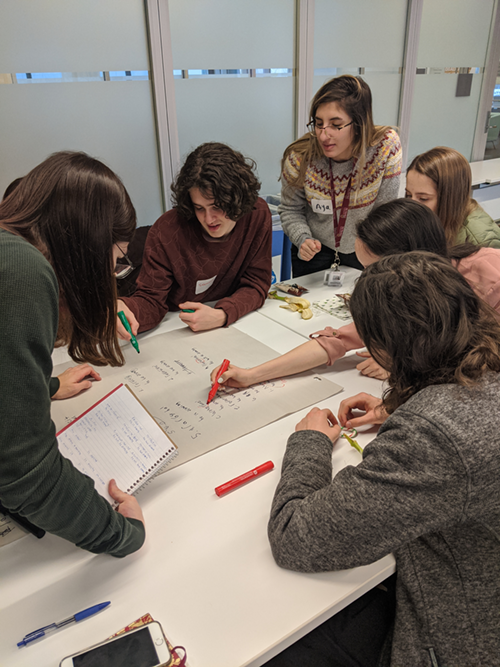
SiTE Schools Dundas students participated in a lively discussion at the Youth Outreach event led by ARiEAL trainees, Aya Zarka (standing) and Kurtis Commanda (left). (Photo Credit: Chia-Yu Lin)
ARiEAL aims to engage youth in the culture of research and higher education through meaningful activities. In 2020, we completed the development of a customizable repertoire with presentation slides and activity templates suitable for introducing ARiEAL research to youth in the community. The project was funded by the MacPherson Institute Student Partner Program and carried out collaboratively by ARiEAL manager, Ms. Chia-Yu Lin, two student partners, Taylor Luu and Oya Pakkal, and a high-school co-op student, Nolyn Lakhanpal. ARiEAL trainees were consulted throughout the project, and the active participation from the local high school students of SiTE Schools Dundas helped to ensure the effectiveness and appropriateness of resources.
Even though the Hamilton Health Sciences High School Research Bursary program, a highly competitive summer internship program designed for senior high school students interested in pursuing health and life science postsecondary education, was suspended in 2020 due to the COVID-19 pandemic, Dr. John Connolly and the team continued working remotely with their 2019 placement student, Sophie Krokhine, on a scoping review project. The summer 2019 project successfully led to a 2020 peer-reviewed publication, “N2b Reflects the Cognitive Changes in Executive Functioning After Concussion: A Scoping Review” in Frontiers in Human Neuroscience with Sophie Krokhine (now first-year undergraduate student at McMaster University) as the first author. We hope to continually inspire more curious young minds with the exciting research we carry out at ARiEAL and also offer them hands-on opportunities to be part of the community.
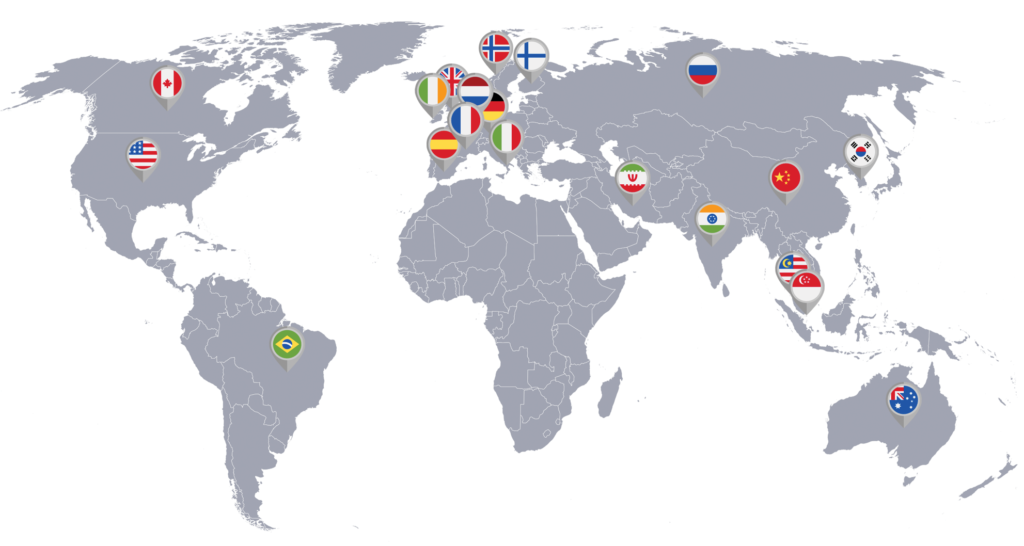 Towards our goal as a resource hub, the ARiEAL website continues to attract curiosity from people around the world as shown by over 8,400 visitors from 107 countries in 2020 alone. This map highlights the top 20 countries from which our website visitors come. During 2020 our Twitter reached over 94,000 impressions, with 117 tweets and retweets, and exceeded 2,300 engagement counts. Our relatively new Instagram account, now with 130 followers, has continued to foster engagement, specifically with students. The year 2020 has reaffirmed the importance of knowledge mobilization through virtual platforms, and we will continue this endeavour into the future.
Towards our goal as a resource hub, the ARiEAL website continues to attract curiosity from people around the world as shown by over 8,400 visitors from 107 countries in 2020 alone. This map highlights the top 20 countries from which our website visitors come. During 2020 our Twitter reached over 94,000 impressions, with 117 tweets and retweets, and exceeded 2,300 engagement counts. Our relatively new Instagram account, now with 130 followers, has continued to foster engagement, specifically with students. The year 2020 has reaffirmed the importance of knowledge mobilization through virtual platforms, and we will continue this endeavour into the future.
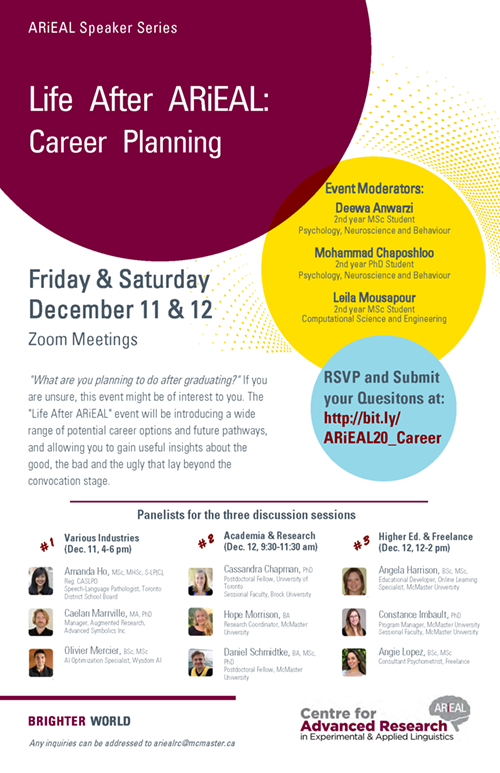
Event poster – Panel discussion on career planning organized by ARiEAL Operations Team. (Image provided by Chia-Yu Lin)
While ARiEAL continues to co-host Cognitive Science of Language Lecture Series talks with the Department of Linguistics and Languages (McMaster University), the ARiEAL Speaker Series has also been established since late 2019 to invite renowned researchers, including ARiEAL’s very own Scientific Advisory Committee members, to share their wealth of knowledge. In addition to the spontaneous research talks given by visiting researchers, ARiEAL also offers various opportunities for trainees of all levels to develop and refine their research skills through the ARiEAL Learning Series. Recorded Speaker & Learning Series events are made available on ARiEAL Archive.
View full list of 2020 events SPEAKER SERIES Dr. Ken McRae, Professor, Department of Psychology, University of Western Ontario: London, Canada. Event Knowledge and Semantic Processing. February 14, 2020. Dr. Michel DeGraff, Professor, Department of Linguistics, Massachusetts Institute of Technology: Massachusetts, USA. Decolonizing linguistics and education: Haitian Creole as case study. October 19, 2020. RESEARCH TALK LEARNING SERIES Amanda Ho, Speech Language Pathologist, Toronto District School Board: Toronto, Canada; Dr. Caelan Marrville, Manager of Augmented Research, Advanced Symbolics Inc: Ottawa, Canada; & Olivier Mercier, Optimization Specialist, Wysdom AI: Toronto, Canada. Life After ARiEAL – Career Planning (Various Industries). December 11, 2020. Angela Harrison, Educational Developer & Online Learning Specialist, McMaster University: Hamilton, Canada; Dr. Constance Imbault, Program Coordinator, McCall MacBain Postdoctoral Fellows Teaching and Leadership program, Department of Psychology, Neuroscience & Behaviour, McMaster University: Hamilton, Canada; & Angie Lopez, Freelance Psychometrist. Life After ARiEAL – Career Planning (Higher Education & Freelance). December 12, 2020. Dr. Cassandra Chapman, Sessional Faculty, Department of Applied Linguistics, Brock University: St. Catharines, Canada; Hope Morrison, Research Coordinator, ARiEAL Research Centre, McMaster University: Hamilton, Canada; & Dr. Daniel Schmidtke, Postdoctoral Researcher, ARiEAL Research Center, McMaster University: Hamilton, Canada. Life After ARiEAL – Career Planning (Academia & Research). December 12, 2020.
Dr. Sylvain Baillet, Professor, Department of Biomedical Engineering and Computer Science, Montreal Neurological Institute: Montreal, Quebec. New frontiers in electrophysiology for decoding and imaging the human brain. January 14, 2020.
Dr. Chris Westbury, Professor, Department of Psychology, University of Alberta: Edmonton, Alberta. Telling the world’s worst jokes: A cognitive scientist looks at humour. February 12, 2020.
Heather Wild, BA Student, Department of Linguistics and Language, McMaster University: Hamilton, Canada; Kaitlyn Battershill, MSc Student, Cognitive Science of Language Program, McMaster University: Hamilton, Canada; & Rachelle Ho, PhD Candidate, Psychology, Neuroscience & Behaviour Program, McMaster University: Hamilton, Canada. How to Navigate Online Conferences. November 17, 2020.
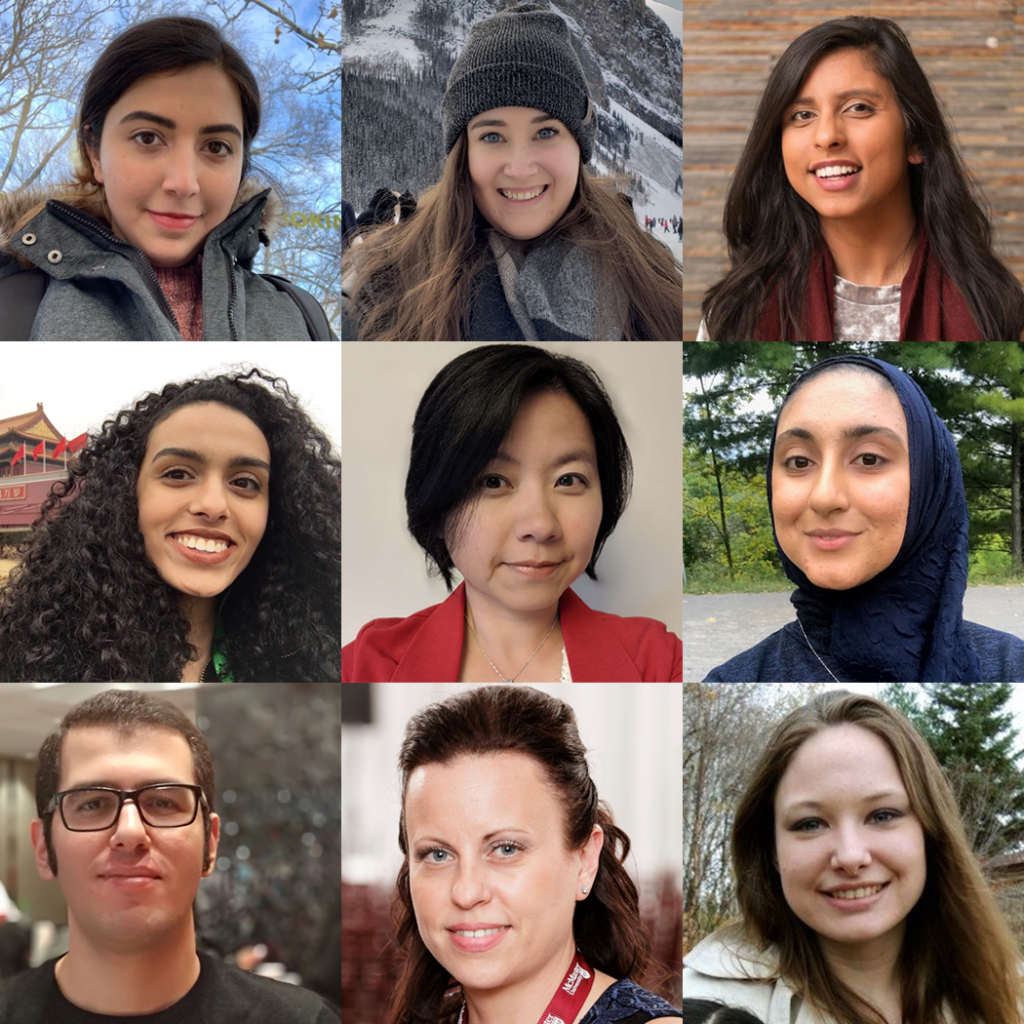
The inaugural ARiEAL Operations Team (Images provided by each AOT member)
New in 2020, ARiEAL established a trainee-based operations team (hereafter referred to as AOT). The trainees work collaboratively with the ARiEAL manager, Ms. Chia-Yu Lin, and were also supported by AOT Associate, Ms. Sarah Hagens. The AOT operates on a one-year renewable term and provides hands-on opportunities for undergraduate and graduate trainees to not only participate but also spearhead the endevours in knowledge mobilization and the planning of various events. ARiEAL was able to continue expanding its reach through Twitter and Instagram with the support provided by Deewa Anwarzi and Mohammad Chaposhloo (Knowledge Mobilization Coordinators). Despite the extra hurdle presented by the COVID-19 pandemic, Mariam Bekhet and Kelly Nisbet (Learning Series Coordinators) and Leila Mousapour (Speaker Series Coordinator) braved the challenges and brought us events such as “How to Navigate Online Conferences” and “Life After ARiEAL – Career Planning”. Weekly Happy Hour and monthly virtual game nights, organized by Sukhman Baath and Carla Weigel (Social Coordinators), offered the much-needed mental breaks that ARiEAL members could enjoy with their family members.
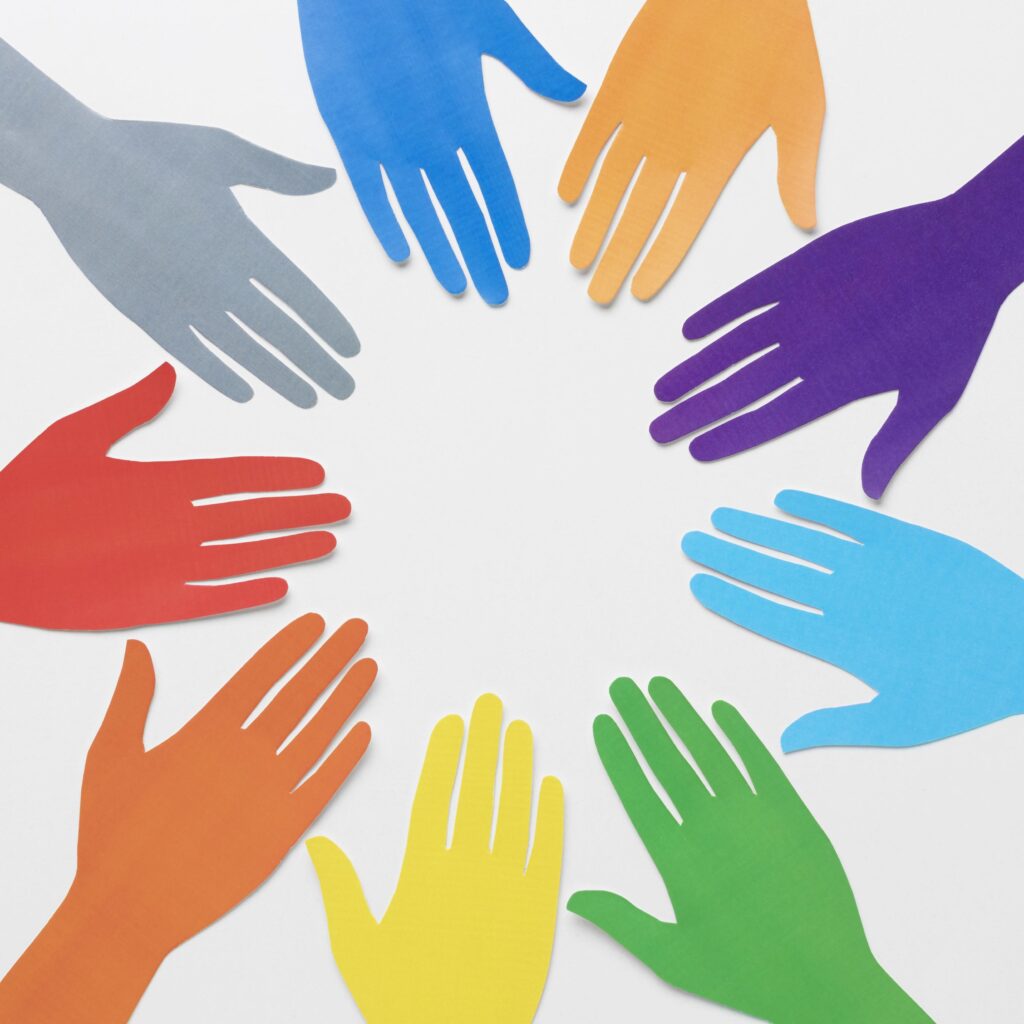
Image by Freepik

SiTE Schools Dundas students participated in a lively discussion at the Youth Outreach event led by ARiEAL trainees, Aya Zarka (standing) and Kurtis Commanda (left). (Photo Credit: Chia-Yu Lin)
ARiEAL aims to engage youth in the culture of research and higher education through meaningful activities. In 2020, we completed the development of a customizable repertoire with presentation slides and activity templates suitable for introducing ARiEAL research to youth in the community. The project was funded by the MacPherson Institute Student Partner Program and carried out collaboratively by ARiEAL manager, Ms. Chia-Yu Lin, two student partners, Taylor Luu and Oya Pakkal, and a high-school co-op student, Nolyn Lakhanpal. ARiEAL trainees were consulted throughout the project, and the active participation from the local high school students of SiTE Schools Dundas helped to ensure the effectiveness and appropriateness of resources.
Even though the Hamilton Health Sciences High School Research Bursary program, a highly competitive summer internship program designed for senior high school students interested in pursuing health and life science postsecondary education, was suspended in 2020 due to the COVID-19 pandemic, Dr. John Connolly and the team continued working remotely with their 2019 placement student, Sophie Krokhine, on a scoping review project. The summer 2019 project successfully led to a 2020 peer-reviewed publication, “N2b Reflects the Cognitive Changes in Executive Functioning After Concussion: A Scoping Review” in Frontiers in Human Neuroscience with Sophie Krokhine (now first-year undergraduate student at McMaster University) as the first author. We hope to continually inspire more curious young minds with the exciting research we carry out at ARiEAL and also offer them hands-on opportunities to be part of the community.
 Towards our goal as a resource hub, the ARiEAL website continues to attract curiosity from people around the world as shown by over 8,400 visitors from 107 countries in 2020 alone. This map highlights the top 20 countries from which our website visitors come. During 2020 our Twitter reached over 94,000 impressions, with 117 tweets and retweets, and exceeded 2,300 engagement counts. Our relatively new Instagram account, now with 130 followers, has continued to foster engagement, specifically with students. The year 2020 has reaffirmed the importance of knowledge mobilization through virtual platforms, and we will continue this endeavour into the future.
Towards our goal as a resource hub, the ARiEAL website continues to attract curiosity from people around the world as shown by over 8,400 visitors from 107 countries in 2020 alone. This map highlights the top 20 countries from which our website visitors come. During 2020 our Twitter reached over 94,000 impressions, with 117 tweets and retweets, and exceeded 2,300 engagement counts. Our relatively new Instagram account, now with 130 followers, has continued to foster engagement, specifically with students. The year 2020 has reaffirmed the importance of knowledge mobilization through virtual platforms, and we will continue this endeavour into the future.

Event poster – Panel discussion on career planning organized by ARiEAL Operations Team. (Image provided by Chia-Yu Lin)
While ARiEAL continues to co-host Cognitive Science of Language Lecture Series talks with the Department of Linguistics and Languages (McMaster University), the ARiEAL Speaker Series has also been established since late 2019 to invite renowned researchers, including ARiEAL’s very own Scientific Advisory Committee members, to share their wealth of knowledge. In addition to the spontaneous research talks given by visiting researchers, ARiEAL also offers various opportunities for trainees of all levels to develop and refine their research skills through the ARiEAL Learning Series. Recorded Speaker & Learning Series events are made available on ARiEAL Archive.
View full list of 2020 events SPEAKER SERIES Dr. Ken McRae, Professor, Department of Psychology, University of Western Ontario: London, Canada. Event Knowledge and Semantic Processing. February 14, 2020. Dr. Michel DeGraff, Professor, Department of Linguistics, Massachusetts Institute of Technology: Massachusetts, USA. Decolonizing linguistics and education: Haitian Creole as case study. October 19, 2020. RESEARCH TALK LEARNING SERIES Amanda Ho, Speech Language Pathologist, Toronto District School Board: Toronto, Canada; Dr. Caelan Marrville, Manager of Augmented Research, Advanced Symbolics Inc: Ottawa, Canada; & Olivier Mercier, Optimization Specialist, Wysdom AI: Toronto, Canada. Life After ARiEAL – Career Planning (Various Industries). December 11, 2020. Angela Harrison, Educational Developer & Online Learning Specialist, McMaster University: Hamilton, Canada; Dr. Constance Imbault, Program Coordinator, McCall MacBain Postdoctoral Fellows Teaching and Leadership program, Department of Psychology, Neuroscience & Behaviour, McMaster University: Hamilton, Canada; & Angie Lopez, Freelance Psychometrist. Life After ARiEAL – Career Planning (Higher Education & Freelance). December 12, 2020. Dr. Cassandra Chapman, Sessional Faculty, Department of Applied Linguistics, Brock University: St. Catharines, Canada; Hope Morrison, Research Coordinator, ARiEAL Research Centre, McMaster University: Hamilton, Canada; & Dr. Daniel Schmidtke, Postdoctoral Researcher, ARiEAL Research Center, McMaster University: Hamilton, Canada. Life After ARiEAL – Career Planning (Academia & Research). December 12, 2020.
Dr. Sylvain Baillet, Professor, Department of Biomedical Engineering and Computer Science, Montreal Neurological Institute: Montreal, Quebec. New frontiers in electrophysiology for decoding and imaging the human brain. January 14, 2020.
Dr. Chris Westbury, Professor, Department of Psychology, University of Alberta: Edmonton, Alberta. Telling the world’s worst jokes: A cognitive scientist looks at humour. February 12, 2020.
Heather Wild, BA Student, Department of Linguistics and Language, McMaster University: Hamilton, Canada; Kaitlyn Battershill, MSc Student, Cognitive Science of Language Program, McMaster University: Hamilton, Canada; & Rachelle Ho, PhD Candidate, Psychology, Neuroscience & Behaviour Program, McMaster University: Hamilton, Canada. How to Navigate Online Conferences. November 17, 2020.

The inaugural ARiEAL Operations Team (Images provided by each AOT member)
New in 2020, ARiEAL established a trainee-based operations team (hereafter referred to as AOT). The trainees work collaboratively with the ARiEAL manager, Ms. Chia-Yu Lin, and were also supported by AOT Associate, Ms. Sarah Hagens. The AOT operates on a one-year renewable term and provides hands-on opportunities for undergraduate and graduate trainees to not only participate but also spearhead the endevours in knowledge mobilization and the planning of various events. ARiEAL was able to continue expanding its reach through Twitter and Instagram with the support provided by Deewa Anwarzi and Mohammad Chaposhloo (Knowledge Mobilization Coordinators). Despite the extra hurdle presented by the COVID-19 pandemic, Mariam Bekhet and Kelly Nisbet (Learning Series Coordinators) and Leila Mousapour (Speaker Series Coordinator) braved the challenges and brought us events such as “How to Navigate Online Conferences” and “Life After ARiEAL – Career Planning”. Weekly Happy Hour and monthly virtual game nights, organized by Sukhman Baath and Carla Weigel (Social Coordinators), offered the much-needed mental breaks that ARiEAL members could enjoy with their family members.
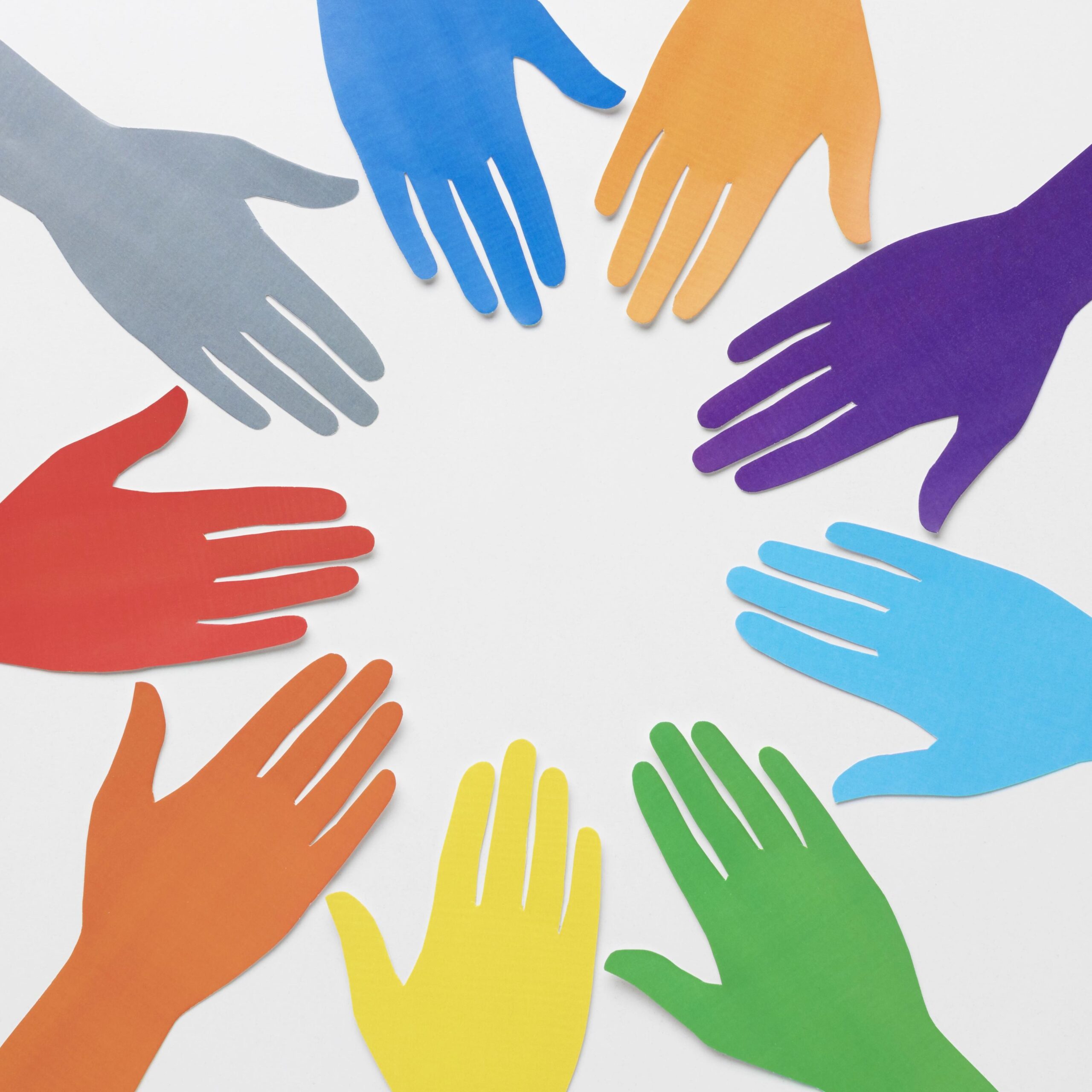
Image by Freepik
EDI stands for Equity, Diversity and Inclusion. The year 2020 was not only eventful because of a global pandemic, it was also an awakening year for many to start seeing things with EDI lenses. The growing Black Lives Matter effort from our neighbouring country has inspired many of us to examine the history of racism against the Indigenous people of Canada and other forms of discrimination. At ARiEAL, we are committed to continuing to build a welcoming research community that values diversity and equity. As the term of our inaugural Scientific Advisory Committee is coming to an end, a Working Group has been formed in 2020 to develop an EDI conscious selection plan for recruiting the next term of Scientific Advisory Committee. This initiative is expected to be completed in 2021.
The Centre
Founded in late 2016, ARiEAL Research Centre celebrated its fourth full calendar year since its inception. We are proud of the mentorship demonstrated by our members and our high-calibre trainees of all levels.
FOUNDING DIRECTOR
Dr. John Connolly (Department of Linguistics and Languages, McMaster University)
ASSOCIATE DIRECTOR
Dr. Anna Moro (Department of Linguistics and Languages, McMaster University)
FULL MEMBERS
Dr. Catherine Anderson (Department of Linguistics and Languages, McMaster University)
Dr. Sue Becker (Department of Psychology, Neuroscience & Behaviour, McMaster University)
Dr. Marc Joanisse (Department of Psychology, University of Western Ontario)
Dr. Ivona Kučerová (Department of Linguistics and Languages, McMaster University)
Dr. Victor Kuperman (Department of Linguistics and Languages, McMaster University)
Dr. Michael Noseworthy (Department of Electrical and Computer Engineering, McMaster University)
Dr. Daniel Pape (Department of Linguistics and Languages, McMaster University)
Dr. Jim Reilly (Department of Electrical and Computer Engineering, McMaster University)
Dr. Elisabet Service (Department of Linguistics and Languages, McMaster University)
Dr. Lyn Turkstra (School of Rehabilitation Science, McMaster University)
ASSOCIATE MEMBERS
Dr. Lisa Archibald (Department of Psychology, University of Western Ontario)
Prof. Carol DeMatteo (School of Rehabilitation Science, McMaster University)
Paul Grunthal (McMaster Industry Liaison Office, McMaster University)
Dr. Ranil Sonnadara (Department of Surgery, McMaster University)
POSTDOCTORAL FELLOWS
Dr. Elham Bagheri (Co-supervised by Dr. John Connolly and Dr. Jim Reilly)
Dr. Jason Bernard (Supervised by Dr. Ranil Sonnadara)
Dr. Félix Desmeules-Trudel (Supervised by Dr. Marc Joanisse)
Dr. Kiret Dhindsa* (Supervised by Dr. Ranil Sonnadara)
Dr. Aki-Juhani Kyröläinen (Supervised by Dr. Victor Kuperman)
Dr. Pan Liu (Co-supervised by Dr. Marc Joanisse and Dr. Elizabeth Hayden)
Dr. Lien Peters (Co-supervised by Dr. Marc Joanisse and Dr. Daniel Ansari)
Dr. Daniel Schmidtke (Supervised by Dr. Anna Moro)
Dr. Mojtaba Soltanlou (Co-supervised by Dr. Marc Joanisse and Dr. Daniel Ansari)
Dr. Paniz Tavakoli (Supervised by Dr. John Connolly)
Dr. Melissa Troyer (Co-supervised by Dr. Marc Joanisse and Dr. Ken McRae)
Dr. Christina Vanden Bosch der Nederlanden* (Co-supervised by Dr. Marc Joanisse and Dr. Jessica Grahn)
PHD STUDENTS
Anita Acai* (Supervised by Dr. Ranil Sonnadara)
Taylor Bardell (Supervised by Dr. Lisa Archibald)
Leah Brainin (Supervised by Dr. Marc Joanisse)
Fiona Campbell (Supervised by Dr. Lyn Turkstra)
Mohammad Chaposhloo (Supervised by Dr. Sue Becker)
Melda Coşkun (Supervised by Dr. Victor Kuperman)
Alexandra Cross* (Co-supervised by Dr. Marc Joanisse and Dr. Lisa Archibald)
Ruibin Dai (Supervised by Dr. Michael Noseworthy)
Ethan Danielli (Supervised by Dr. Michael Noseworthy)
Rudaina Hamed (Co-supervised by Dr. Victor Kuperman and Dr. Anna Moro)
Adianes Herrera (Supervised by Dr. John Connolly)
Aravinthan Jegatheesan (Supervised by Dr. Michael Noseworthy)
Lisa Kakonge (Supervised by Dr. Lyn Turkstra)
Portia Kalun (Supervised by Dr. Ranil Sonnadara)
Isaac Kinley (Supervised by Dr. Sue Becker)
Alyssa Kuciak (Supervised by Dr. Lisa Archibald)
Pekka Lahti-Nuuttila (Co-supervised by Dr. Elisabet Service and Dr. Marja Laasonen)
Yarden Levy (Co-supervised by Dr. Sue Becker and Dr. Margaret McKinnon)
Chenglin Lou (Supervised by Dr. Marc Joanisse)
Sydney McQueen (Supervised by Dr. Ranil Sonnadara and Dr. Carol-Anne Moulton)
Allison Mizzi (Co-supervised by Dr. Sue Becker and Dr. Margaret McKinnon)
Christine Moreau (Supervised by Dr. Marc Joanisse)
Joel Nidel (Supervised by Dr. Marc Joanisse)
Kelly Nisbet (Supervised by Dr. Victor Kuperman)
Gaisha Oralova (Co-supervised by Dr. John Connolly and Dr. Victor Kuperman)
Bre-Anna Owusu (Supervised by Dr. Elisabet Service)
Kaitlyn Parks (Supervised by Dr. Marc Joanisse)
Sara Pearsell (Supervised by Dr. Daniel Pape)
Theresa Pham (Supervised by Dr. Lisa Archibald)
Jade Plym (Co-supervised by Dr. Elisabet Service and Dr. Marja Laasonen)
Paul Polak (Supervised by Dr. Michael Noseworthy)
Adam Politis (Supervised by Dr. Lyn Turkstra)
Frederico Prado (Supervised by Dr. Ivona Kučerová)
Fareeha Rana (Co-supervised by Dr. John Connolly and Dr. Elisabet Service)
Saurabh Shaw (Supervised by Dr. Sue Becker)
Edalat Shekari* (Supervised by Dr. Elisabet Service)
Nicolas Simard (Co-supervised by Dr. Michael Noseworthy and Dr. Jim Reilly)
Lauren Smail (Co-supervised by Dr. Sue Becker and Dr. Ranil Sonnadara)
Joanna Spyra (Supervised by Dr. Ranil Sonnadara)
Mitra Tavakkoli (Supervised by Dr. Michael Noseworthy)
Narcisse Torshizi* (Supervised by Dr. Elisabet Service)
Cindy Tran (Supervised by Dr. Ranil Sonnadara)
Meghan Vollebregt( Supervised by Dr. Lisa Archibald)
Chelsea Whitwell (Supervised by Dr. Elisabet Service)
Nadia Wong (Co-supervised by Dr. Sue Becker and Dr. Hongjin Sun)
Aya Zarka (Supervised by Dr. Ivona Kučerová)
MASTER’S STUDENTS
Reihaneh Ahmadi* (Supervised by Dr. Lyn Turkstra)
Lauren Anderson (Supervised by Dr. Michael Noseworthy)
Fatemeh Armanfard* (Co-supervised by Dr. John Connolly and Dr. Jim Reilly)
Deewa Anwarzi (Co-supervised by Dr. Sue Becker and Dr. Sukh Obhi)
Kaitlyn Battershill (Supervised by Dr. Victor Kuperman)
Jean-François Berthiaume (Supervised by Dr. Daniel Pape)
Kurtis Commanda (Supervised by Dr. Ivona Kučerová)
Erin DeBorba* (Supervised by Dr. Elisabet Service)
Nathalee Ewers* (Supervised by Dr. John Connolly)
Michael Fisher* (Supervised by Dr. Carol DeMatteo)
Noah Frank (Supervised by Dr. Michael Noseworthy)
Ashley Gilbank (Supervised by Dr. Michael Noseworthy)
Daniil Gnetov (Supervised by Dr. Victor Kuperman)
Tess Hudson* (Supervised by Dr. Ivona Kučerová)
Megan Karabin (Supervised by Dr. Victor Kuperman)
Alish Kocz (Supervised by Dr. Ivona Kučerová)
Dr. Richard Kolesar* (Supervised by Dr. John Connolly)
Nadia Lana (Supervised by Dr. Victor Kuperman)
Maria De Los Angeles Lopez Ricote* (Supervised by Dr. Elisabet Service)
Gwenyth Lu (Supervised by Dr. John Connolly)
Neil MacPhee (Supervised by Dr. Michael Noseworthy)
Kiersten Mangold (Supervised by Dr. John Connolly)
Sean McCarron* (Supervised by Dr. Victor Kuperman)
Brian McCrindle (Supervised by Dr. Michael Noseworthy)
Allison Mizzi* (Co-supervised by Dr. Sue Becker and Dr. Margaret McKinnon)
Leila Mousapour (Co-supervised by Dr. Sue Becker and Dr. John Connolly)
Omar Nassif* (Co-supervised by Dr. Jim Reilly and Dr. Vickie Galea)
Cameron Nowikow* (Supervised by Dr. Michael Noseworthy)
Jimmy Nguyen* (Supervised by Dr. Michael Noseworthy)
Netri Pajankar (Supervised by Dr. John Connolly)
Pranav Rawal* (Supervised by Dr. Michael Noseworthy)
Natalie Romaniuk (Supervised by Dr. Carol DeMatteo)
Ethan Samson (Supervised by Dr. Michael Noseworthy)
Selena Singh (Supervised by Dr. Sue Becker)
Mahnaz Tajik (Supervised by Dr. Michael Noseworthy)
Carla Weigel (Co-supervised by Dr. Daniel Pape and Dr. Magda Stroinska)
Zhongda Zhang (Supervised by Dr. Jim Reilly)
Calvin Zhu (Supervised by Dr. Michael Noseworthy)
*Completed program in 2020
MANAGER, DEVELOPMENT & RESEARCH
Chia-Yu Lin
STUDENT ASSISTANTS
Jessica Wood (January – April, 2020)
Rachelle Ho (May – August, 2020)
Ashumi Doshi (September – December, 2020)
OPERATIONS TEAM
Knowledge Mobilization Coordinators
Deewa Anwarzi (February – December 2020)
Mohammad Chaposhloo (February – December 2020)
Learning Series Coordinators
Mariam Bekhet (February – December 2020)
Kelly Nisbet (February – December 2020)
Social Coordinators
Sukhman Baath (February – December 2020)
Carla Weigel (February – December 2020)
Speaker Series Coordinator
Leila Mousapour (February – December 2020)
Staff Associate
Sarah Hagens (February – December 2020)
Dr. Laurie Feldman (University at Albany)
Dr. Denise Klein (McGill University)
Dr. Ken McRae (University of Western Ontario)
Dr. Lucie Ménard (Université du Québec à Montréal; UQAM)
Dr. Penny Pexman (University of Calgary)
Dr. Ken Pugh (Haskins Laboratories)
Dr. Sid Segalowitz (Brock University)
Dr. Jon Sprouse (University of Connecticut)
Centro de Ciencia Cognitiva (C3), Madrid, Spain
Haskins Laboratories, New Haven, Connecticut, USA
Khovd State University (Department of Foreign Languages and Culture Studies, School of Social Sciences and Humanities), Khovd, Mongolia
University of Turku (Department of Psychology and Speech-Language Pathology), Turku, Finland
Words in the World (WoW), Partnership Grant funded by the Social Sciences and Humanities Research Council of Canada (SSHRC), Canada
FOUNDING DIRECTOR
Dr. John Connolly (Department of Linguistics and Languages, McMaster University)
ASSOCIATE DIRECTOR
Dr. Anna Moro (Department of Linguistics and Languages, McMaster University)
FULL MEMBERS
Dr. Catherine Anderson (Department of Linguistics and Languages, McMaster University)
Dr. Sue Becker (Department of Psychology, Neuroscience & Behaviour, McMaster University)
Dr. Marc Joanisse (Department of Psychology, University of Western Ontario)
Dr. Ivona Kučerová (Department of Linguistics and Languages, McMaster University)
Dr. Victor Kuperman (Department of Linguistics and Languages, McMaster University)
Dr. Michael Noseworthy (Department of Electrical and Computer Engineering, McMaster University)
Dr. Daniel Pape (Department of Linguistics and Languages, McMaster University)
Dr. Jim Reilly (Department of Electrical and Computer Engineering, McMaster University)
Dr. Elisabet Service (Department of Linguistics and Languages, McMaster University)
Dr. Lyn Turkstra (School of Rehabilitation Science, McMaster University)
ASSOCIATE MEMBERS
Dr. Lisa Archibald (Department of Psychology, University of Western Ontario)
Prof. Carol DeMatteo (School of Rehabilitation Science, McMaster University)
Paul Grunthal (McMaster Industry Liaison Office, McMaster University)
Dr. Ranil Sonnadara (Department of Surgery, McMaster University)
POSTDOCTORAL FELLOWS
Dr. Elham Bagheri (Co-supervised by Dr. John Connolly and Dr. Jim Reilly)
Dr. Jason Bernard (Supervised by Dr. Ranil Sonnadara)
Dr. Félix Desmeules-Trudel (Supervised by Dr. Marc Joanisse)
Dr. Kiret Dhindsa* (Supervised by Dr. Ranil Sonnadara)
Dr. Aki-Juhani Kyröläinen (Supervised by Dr. Victor Kuperman)
Dr. Pan Liu (Co-supervised by Dr. Marc Joanisse and Dr. Elizabeth Hayden)
Dr. Lien Peters (Co-supervised by Dr. Marc Joanisse and Dr. Daniel Ansari)
Dr. Daniel Schmidtke (Supervised by Dr. Anna Moro)
Dr. Mojtaba Soltanlou (Co-supervised by Dr. Marc Joanisse and Dr. Daniel Ansari)
Dr. Paniz Tavakoli (Supervised by Dr. John Connolly)
Dr. Melissa Troyer (Co-supervised by Dr. Marc Joanisse and Dr. Ken McRae)
Dr. Christina Vanden Bosch der Nederlanden* (Co-supervised by Dr. Marc Joanisse and Dr. Jessica Grahn)
PHD STUDENTS
Anita Acai* (Supervised by Dr. Ranil Sonnadara)
Taylor Bardell (Supervised by Dr. Lisa Archibald)
Leah Brainin (Supervised by Dr. Marc Joanisse)
Fiona Campbell (Supervised by Dr. Lyn Turkstra)
Mohammad Chaposhloo (Supervised by Dr. Sue Becker)
Melda Coşkun (Supervised by Dr. Victor Kuperman)
Alexandra Cross* (Co-supervised by Dr. Marc Joanisse and Dr. Lisa Archibald)
Ruibin Dai (Supervised by Dr. Michael Noseworthy)
Ethan Danielli (Supervised by Dr. Michael Noseworthy)
Rudaina Hamed (Co-supervised by Dr. Victor Kuperman and Dr. Anna Moro)
Adianes Herrera (Supervised by Dr. John Connolly)
Aravinthan Jegatheesan (Supervised by Dr. Michael Noseworthy)
Lisa Kakonge (Supervised by Dr. Lyn Turkstra)
Portia Kalun (Supervised by Dr. Ranil Sonnadara)
Isaac Kinley (Supervised by Dr. Sue Becker)
Alyssa Kuciak (Supervised by Dr. Lisa Archibald)
Pekka Lahti-Nuuttila (Co-supervised by Dr. Elisabet Service and Dr. Marja Laasonen)
Yarden Levy (Co-supervised by Dr. Sue Becker and Dr. Margaret McKinnon)
Chenglin Lou (Supervised by Dr. Marc Joanisse)
Sydney McQueen (Supervised by Dr. Ranil Sonnadara and Dr. Carol-Anne Moulton)
Allison Mizzi (Co-supervised by Dr. Sue Becker and Dr. Margaret McKinnon)
Christine Moreau (Supervised by Dr. Marc Joanisse)
Joel Nidel (Supervised by Dr. Marc Joanisse)
Kelly Nisbet (Supervised by Dr. Victor Kuperman)
Gaisha Oralova (Co-supervised by Dr. John Connolly and Dr. Victor Kuperman)
Bre-Anna Owusu (Supervised by Dr. Elisabet Service)
Kaitlyn Parks (Supervised by Dr. Marc Joanisse)
Sara Pearsell (Supervised by Dr. Daniel Pape)
Theresa Pham (Supervised by Dr. Lisa Archibald)
Jade Plym (Co-supervised by Dr. Elisabet Service and Dr. Marja Laasonen)
Paul Polak (Supervised by Dr. Michael Noseworthy)
Adam Politis (Supervised by Dr. Lyn Turkstra)
Frederico Prado (Supervised by Dr. Ivona Kučerová)
Fareeha Rana (Co-supervised by Dr. John Connolly and Dr. Elisabet Service)
Saurabh Shaw (Supervised by Dr. Sue Becker)
Edalat Shekari* (Supervised by Dr. Elisabet Service)
Nicolas Simard (Co-supervised by Dr. Michael Noseworthy and Dr. Jim Reilly)
Lauren Smail (Co-supervised by Dr. Sue Becker and Dr. Ranil Sonnadara)
Joanna Spyra (Supervised by Dr. Ranil Sonnadara)
Mitra Tavakkoli (Supervised by Dr. Michael Noseworthy)
Narcisse Torshizi* (Supervised by Dr. Elisabet Service)
Cindy Tran (Supervised by Dr. Ranil Sonnadara)
Meghan Vollebregt( Supervised by Dr. Lisa Archibald)
Chelsea Whitwell (Supervised by Dr. Elisabet Service)
Nadia Wong (Co-supervised by Dr. Sue Becker and Dr. Hongjin Sun)
Aya Zarka (Supervised by Dr. Ivona Kučerová)
MASTER’S STUDENTS
Reihaneh Ahmadi* (Supervised by Dr. Lyn Turkstra)
Lauren Anderson (Supervised by Dr. Michael Noseworthy)
Fatemeh Armanfard* (Co-supervised by Dr. John Connolly and Dr. Jim Reilly)
Deewa Anwarzi (Co-supervised by Dr. Sue Becker and Dr. Sukh Obhi)
Kaitlyn Battershill (Supervised by Dr. Victor Kuperman)
Jean-François Berthiaume (Supervised by Dr. Daniel Pape)
Kurtis Commanda (Supervised by Dr. Ivona Kučerová)
Erin DeBorba* (Supervised by Dr. Elisabet Service)
Nathalee Ewers* (Supervised by Dr. John Connolly)
Michael Fisher* (Supervised by Dr. Carol DeMatteo)
Noah Frank (Supervised by Dr. Michael Noseworthy)
Ashley Gilbank (Supervised by Dr. Michael Noseworthy)
Daniil Gnetov (Supervised by Dr. Victor Kuperman)
Tess Hudson* (Supervised by Dr. Ivona Kučerová)
Megan Karabin (Supervised by Dr. Victor Kuperman)
Alish Kocz (Supervised by Dr. Ivona Kučerová)
Dr. Richard Kolesar* (Supervised by Dr. John Connolly)
Nadia Lana (Supervised by Dr. Victor Kuperman)
Maria De Los Angeles Lopez Ricote* (Supervised by Dr. Elisabet Service)
Gwenyth Lu (Supervised by Dr. John Connolly)
Neil MacPhee (Supervised by Dr. Michael Noseworthy)
Kiersten Mangold (Supervised by Dr. John Connolly)
Sean McCarron* (Supervised by Dr. Victor Kuperman)
Brian McCrindle (Supervised by Dr. Michael Noseworthy)
Allison Mizzi* (Co-supervised by Dr. Sue Becker and Dr. Margaret McKinnon)
Leila Mousapour (Co-supervised by Dr. Sue Becker and Dr. John Connolly)
Omar Nassif* (Co-supervised by Dr. Jim Reilly and Dr. Vickie Galea)
Cameron Nowikow* (Supervised by Dr. Michael Noseworthy)
Jimmy Nguyen* (Supervised by Dr. Michael Noseworthy)
Netri Pajankar (Supervised by Dr. John Connolly)
Pranav Rawal* (Supervised by Dr. Michael Noseworthy)
Natalie Romaniuk (Supervised by Dr. Carol DeMatteo)
Ethan Samson (Supervised by Dr. Michael Noseworthy)
Selena Singh (Supervised by Dr. Sue Becker)
Mahnaz Tajik (Supervised by Dr. Michael Noseworthy)
Carla Weigel (Co-supervised by Dr. Daniel Pape and Dr. Magda Stroinska)
Zhongda Zhang (Supervised by Dr. Jim Reilly)
Calvin Zhu (Supervised by Dr. Michael Noseworthy)
*Completed program in 2020
MANAGER, DEVELOPMENT & RESEARCH
Chia-Yu Lin
STUDENT ASSISTANTS
Jessica Wood (January – April, 2020)
Rachelle Ho (May – August, 2020)
Ashumi Doshi (September – December, 2020)
OPERATIONS TEAM
Knowledge Mobilization Coordinators
Deewa Anwarzi (February – December 2020)
Mohammad Chaposhloo (February – December 2020)
Learning Series Coordinators
Mariam Bekhet (February – December 2020)
Kelly Nisbet (February – December 2020)
Social Coordinators
Sukhman Baath (February – December 2020)
Carla Weigel (February – December 2020)
Speaker Series Coordinator
Leila Mousapour (February – December 2020)
Staff Associate
Sarah Hagens (February – December 2020)
Dr. Laurie Feldman (University at Albany)
Dr. Denise Klein (McGill University)
Dr. Ken McRae (University of Western Ontario)
Dr. Lucie Ménard (Université du Québec à Montréal; UQAM)
Dr. Penny Pexman (University of Calgary)
Dr. Ken Pugh (Haskins Laboratories)
Dr. Sid Segalowitz (Brock University)
Dr. Jon Sprouse (University of Connecticut)
Centro de Ciencia Cognitiva (C3), Madrid, Spain
Haskins Laboratories, New Haven, Connecticut, USA
Khovd State University (Department of Foreign Languages and Culture Studies, School of Social Sciences and Humanities), Khovd, Mongolia
University of Turku (Department of Psychology and Speech-Language Pathology), Turku, Finland
Words in the World (WoW), Partnership Grant funded by the Social Sciences and Humanities Research Council of Canada (SSHRC), Canada
Produced & Designed by Brie Chauncey, Chia-Yu Lin, and Ashumi Doshi. Many thanks to all ARiEAL members and trainees for their contribution to this report, and especially to Deewa Anwarzi and Mohammad Chaposhloo for the Special Feature. Special Mention to Hope Morrison, Nadia Lana and Mariam Bekhet for reviewing the drafts and providing edits.
L.R. Wilson Hall, Room 4020
McMaster University
1280 Main St. West
Hamilton, Ontario L8S 4K1, Canada

ARiEAL Research Centre
L.R. Wilson Hall, Room 4020
McMaster University
1280 Main St. West
Hamilton, Ontario L8S 4K1, Canada
Phone: 905-525-9140 x21032
Email: ariealrc@mcmaster.ca
Twitter: @arieal_research

